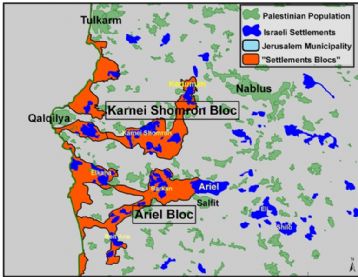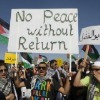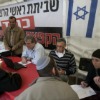The following is a timeline of major "Price Tag" attacks (as reported by Israeli sources). It documents a clear escalation in attacks, and the increasing spread of attacks inside the Green Line. Italics indicate so-called "triggers" - events or developments that appear to be linked to subsequent attacks - although as has been noted in the Israeli press, "According to the Shin Bet, the right-wing extremists no longer appear to need a 'trigger' to take action, while the targets of the violence are also widening..." We will update this regularly.
Postings by: Lara Friedman
Former Defense Secretary Donald Rumsfeld is known for the quip "If you can't solve a problem, enlarge it." Opponents of Israeli-Palestinian peace have their own spin on that quip, best summed up as, "If you don't want to solve a problem, pile on more problems." As a result, a valuable metric for gauging how seriously things are going in Israeli-Palestinian peace efforts - or, at least, how worried anti-peace folks are getting that things are going seriously - has long been the extent to which opponents of peace are ginning up discredited, specious, or disingenuous arguments. And a look at current headlines indicates that opponents of peace are taking the Kerry peace effort very seriously, indeed.
Today, Peace Now's Settlement Watch issued the following update regarding new settlement-related developments in Hebron:
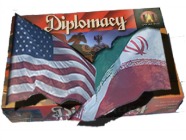
We knew the fight to keep Iran-focused diplomacy alive wasn't over - and we were right. Just before the Senate went home for the holidays, Senators Menendez (D-NJ), Kirk (R-IL) and a group of 25 colleagues introduced a new and highly problematic Iran sanctions bill in the Senate - S. 1881, ironically named the "Nuclear Weapon Free Iran Act of 2013." Over the holiday break, this bill was the focal point of a major lobbying effort, with AIPAC and other groups working intensively to get Senators to cosponsor the measure -- and this effort will pick up additional steam in the coming days.
Last week, Dov Weisglass - former top advisor to Prime Minister Ariel Sharon - wrote in Yedioth Ahronoth (Hebrew edition) about the Israeli security needs and the Jordan Valley. His article, translated by Israel News Today (INT), is required reading for anyone following this issue and how it is being exploited today in efforts to block progress toward an Israeli-Palestinian peace agreement.

An article in today's Haaretz reports on recent data released by Israel's Ministry of Defense regarding some of the actions taken under the current Minister of Defense, Moshe Yaalon, to promote settlements. The data covers only the first four months of Yaalon's tenure in office (mid-March through mid-July 2013). As we observed when the new Israeli coalition was announced, "the Minister of Defense...is effectively the reigning sovereign in the West Bank...In the new coalition, that position will be held by Moshe Ya'alon (Likud-Beiteinu), who has been a strong ally of the settlers."
1. Bills and Resolutions
2. Obama vs. "Pro-Israel" Groups on Iran, Part IV
3. Congress, Diplomacy, Sanctions, and Israel - Where Things Stand, What Next
4. White House Implores Senate to Give Time for Talks
5. NDAA Amendments in the Spotlight
6. Members Sound Off on Iran - Letters
7. Members Sound Off on Iran - Statements, Op-eds, Etc.
8. Hearings
9. Members on the Record [on things other than Iran/sanctions]
1. Bills, Resolutions & Letters
2. Obama vs. "Pro-Israel" Groups on Iran, Part III
3. Congress, Diplomacy, Sanctions, and Israel - state-of-play
4. Hearings
5. Members on the Record [on things other than Iran/sanctions]
6. From the Press [on things other than Iran/sanctions]
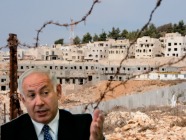
Today, APN President and CEO Debra DeLee released the following statement:
"We welcome the news that Israeli Prime Minister Netanyahu has instructed his Minister of Housing, Uri Ariel, to 'reconsider' the recently published tenders for the planning of more than 20,000 new settlement units in the West Bank and East Jerusalem.

(UPDATED) Last week, Peace Now (Israel) and Americans for Peace Now released a new report looking at the first 8 months of the Netanyahu government and its record regarding settlements.
Today, Peace Now and APN released an update to the report, to include new information regarding the Netanyahu Government's issuance of tenders for the planning for almost 25,000 new settlement units in the West Bank and East Jerusalem.
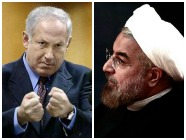
Israeli alarm over Iran's nuclear program is wholly legitimate. Israeli skepticism about Iran's intentions in negotiations is natural, as are its fears that Iran will exploit an agreement to move ahead with dangerous plans of its own. Indeed, all of these concerns are shared by the U.S., others in the Middle East, and nations around the world.

11/12/13 UPDATE: Settlement Boom Even Bigger Than Was Known
Today, Peace Now (Israel) and Americans for Peace Now released a new report looking at the first 8 months of the Netanyahu government and its record regarding settlements. The key findings are summarized below, followed by a detailed examination of the data. The full report, including all the data in table form, can be viewed/downloaded here.
An article by Shaul Amsterdamski in today's edition of the Calcalist - an Israeli business daily linked to Yedioth Ahronoth - reports on a remarkable phenomenon: the variety of "loans" made by the Israeli government to settlements and individual Israeli settlers, either with a formal or informal understanding that part, most, or even all of the loan would never be repaid.
The original article (in Hebrew) is available here. Includes here is a portion of the article, as translated into English by Israel News Today.
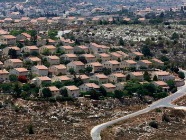
Americans for Peace Now (APN) today denounced the government of Israel's actions to move forward with yet more settlement approvals in both East Jerusalem and the West Bank. APN once again urged U.S. officials - President Obama, Secretary of State Kerry, and Special Envoy Indyk - to engage forcefully to convince Prime Minister Netanyahu to cease and roll back these reckless, destructive decisions.

Today the Israeli Peace Now movement issued a report documenting a surge in settlement construction during the first half of 2013. The report contradicts the popular narrative that settlement construction in the West Bank slowed during the run-up to the re-start of Israeli-Palestinian peace talks.
1. Bills, Resolutions & Letters
2. Iran Charm Offensive, Meet Congressional Wall
3. Iran Pandering, Meet Government Shutdown Point-Scoring
4. Congressional Reaction/Concern Over Syria Deal
5. Hearings
6. Members on the Record (on other issues)
7. From the Press

It's easy to be dismissive of the idea that the Israeli-Palestinian conflict will be solved through a negotiated two-state solution. Libraries are filled with books about failed peace efforts. The daily news is replete with reports of developments that undermine a two-state outcome. Those who oppose two states are growing more powerful on both sides. And the impotence of the United States and international community when it comes to getting serious about this issue is so self-evident as to be cliché.
1. Bills, Resolutions & Letters
2. Syria Debate on the Hill - Broader Implications?
3. Members on the Record (on things other than Syria)
4. Hearings/Briefings
5. News of the Weird
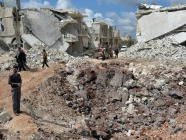
APN is deeply concerned over the spiraling calamity in Syria. More than two years of fighting has left the country in ruins and more than 100,000 people dead, including, in the latest phase, hundreds killed in a chemical weapons attack.
Like much of the world, all of us at APN are watching the situation in Egypt with shock, horror, sadness - as well as with serious concern for what the future holds, both for that country and its people, and for the broader region, including Egypt's neighbor, Israel.

Cynicism about new Israeli-Palestinian peace efforts comes in a variety of flavors.

It is impossible for any thinking person to view yesterday's release of Palestinian prisoners - and the planned release of more prisoners - with anything but very mixed feelings.
Yesterday, Israel released the first of four tranches of Palestinian prisoners. The decision to release prisoners sparked some controversy both inside and outside Israel. In this context, it seems like an opportune moment to review Israel's own freely-undertaken commitments, some never implemented, regarding the release of Palestinian prisoners.
Since the start of the new Israeli-Palestinian peace effort backed by Secretary Kerry, it feels like every day has seen news about new settlement approvals, tenders, planning, benefits, etc. In truth, it hasn't been quite every day - but close to it. The settlement floodgates have been opened, and opened wide, especially in East Jerusalem. This timeline is intended not to provide comprehensive details of each new settlement-related development, but to track these developments across time and provide links to additional resources. Also, keep in mind that new developments can be viewed on the map through APN's "Facts on the Ground" Map App.

Americans for Peace Now (APN) today harshly condemned the government of Israel's recent actions to move forward with new settlement approvals and tenders in both East Jerusalem and the West Bank. APN urged President Obama and Secretary of State Kerry to engage vigorously to convince Netanyahu to roll back these reckless, destructive decisions.

Anyone familiar with the history of Israeli-Palestinian peacemaking can be forgiven for viewing new Israeli-Palestinian negotiations with a certain degree of skepticism, in large part fueled by concern that settlements will, once again, be used to undermine the chances for achieving peace.
(This is Part 2 of an unprecedented two-part Round-Up. Please see Part 1 for bills/resolutions/letters and coverage of HR 850, the Jerusalem passport case, CUFI on the Hill, Middle East issues in the Defense Approps process, Members on the Record, and Hearings/briefings).
1. Senate FY14 ForOps Process Gets Underway
2. More On House FY14 ForOps (Report Language)
There is so much to report from the past two weeks that it doesn't fit into a single Round-Up. Please look for Part 2 of this week's Round-Up for coverage House and Senate FY14 ForOps bills. Also, please note that Congress will be in recess for the rest of the month (yippee!) so the Round-Up will be in recess, too. Happy August!
1. Bills, Resolutions & Letters
2. House Passes Sweeping New Iran Sanctions Bill (HR 850)
3. Appeals Rules Jerusalem Passport Law as Unconstitutional
4. FY14 DOD Approps: Israel, Egypt, Syria Elements
5. CUFI on the Hill
6. Members on the Record
7. Hearings/Briefings
Briefly noted:
Americans for Peace Now's Israeli-Palestinian Peace Talks resource page (updated regularly)
Congressional Research Service Report: Iran Sanctions (7/26/13)
Congressional Research Service Report Egypt: Background and U.S. Relations (7/19/13)
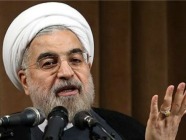
Iran's election of Hassan Rouhani, a former nuclear negotiator who promised greater nuclear transparency and to pursue "peace and reconciliation" with the outside world, presents the best opportunity for serious progress on diplomatic negotiations with Iran in over eight years.
1. Bills, Resolutions & Letters
2. Dent-Price Iran Diplomacy Letter Racks Up Huge Success
3. Israel Visa Waiver Issue Heats Up Again
4. House FY14 ForOps - Committee Draft
5. Power Confirmation Hearing in the SFRC
6. Hearings/Briefings
7. From the Press/Blogs

People are still debating whether the recent ejection of the elected government in Egypt meets the definition of a "coup." This debate has arisen because U.S. law requires a suspension of aid to a country whose democratically-elected government has been ousted following military intervention -- a condition that seems to clearly apply in this case.
1. Bills, Resolutions & Letters
2. Congress Responds (with Some Confusion) to Egypt
3. House GOP Love-in with Settler Leader?
4. Hearings/Briefings
5. Members on the Record
6. From the Press/Blogs
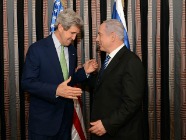
Yesterday, Secretary of State John Kerry wound up his fifth trip to Israel/Palestine. The following are some observations about the visit and the overall Kerry peace effort.
1. Bills, Resolutions & Letters
2. Hearings/Briefings
3. Members on the Record
4. From the Press/Blogs

by Lara Friedman
Last week, friends forwarded me a mailing they had recently received from AIPAC. Included with the letter touting AIPAC's accomplishments and the expected call for donations was a map-style fold-out insert, headlined with the ominous message: "Israel Faces Increasing Threats." Under that headline, taking up more than half the page, is a photo of an Israeli policewoman shepherding to safety an Israeli woman who clearly has been the victim of a bombing attack.
1. Bills, Resolutions & Letters
2. Syria in the Spotlight
3. Hearings/Briefings
4. Members on the Record
5. From the Press/Blogs

by Lara Friedman
The Gaza Strip! IDF Girls Gone Wild! These are some of the nicknames for the recent scandal sparked by Facebook photos and video of semi-nude female IDF soldiers, striking poses and dancing on IDF bases and inside IDF facilities, in some cases carrying weapons and sporting (parts of) IDF uniforms. These stories seemed to be everywhere -- including at the Forward.
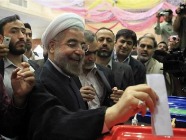
There is rare good news on the Iran front. Last Friday, Iran held elections for its next president - the person who would replace the infamous Mahmoud Ahmedinijad. Million of Iranians - more than 70% of Iran's 50 million registered voters - cast a ballot in this election, and they voted for Hassan Rouhani to be their next president. While these elections were by no standard fully free and fair, starting with the fact that Iran's ruling mullahs disqualified all but a handful of candidates, it is indisputable that something else is also clear: this election was an upset. The winner of these elections was not the candidate of choice of these same mullahs and, comparatively speaking, he is a political and ideological moderate who ran on pro-change, anti-extremism platform.
1. Bills, Resolutions & Letters
2. House Takes up FY14 NDAA - Middle East-related Amendments
3. Hearings/Briefings
4. Members on the Record
5. From the Press/Blogs
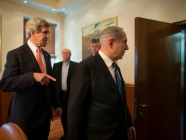
While Israeli Prime Minister Benjamin Netanyahu continues to insist that he is serious about peace and continues to call on the Palestinians to return to the negotiating table, the actions of his government send a message that fruitful negotiations, peace, and the two-state solution are not on his agenda. Indeed, these actions seem more in line with the views articulated by hardliners in Netanyahu's coalition who openly scorn the idea of any two-state solution.
1. Bills, Resolutions & Letters
2. HASC Marks Up FY14 NDAA; Summary of Mideast Provisions
3. Hearings/Briefings
4. Members on the Record
5. From the Press/Blogs

Earlier this week, President Obama announced that Susan Rice, the current U.S. Ambassador to the UN, will be his new National Security Advisor. He also announced that he had picked Samantha Power, his longtime advisor, to replace Rice at the UN. For better or for worse, both appointments have an Israel angle.

Last week Palestinian President Abbas announced his choice for his new Prime Minister: Rami Hamdallah, presently the President of An-Najah University, in Nablus. Hamdallah is not a well-known figure outside of the West Bank, having played little if any public role in Palestinian politics until now. With that in mind, we offer the following resources for those seeking more information about this new player on the Palestinian Authority political scene, as well as for those looking for insight into why Hamdallah might have been chosen and what his selection could mean for the future of the PA.
1. Bills, Resolutions & Letters
2. Congressional Frenzy on Iran Sanctions
3. NORPAC on the Hill
4. Hearings
5. Members on the Record
6. From the Press/Blogs
7. "Israel Allies Foundation" to hold "Jerusalem Day Prayer Breakfast" on the Hill

by Lara Friedman, Daniel Seidemann
At the crux of the ongoing controversy over Google's decision to recognize "Palestine" on its google.ps landing page is an emphatic refusal by some in Israel (and abroad) to accept empirical reality. That reality is pretty uncomplicated. Most of the world today recognizes the Palestinians as a people. Most countries have voted at the U.N. to recognize Palestine as a theoretical state that must one day come into being in areas currently controlled by Israel. No nation on earth endorses Israel's continued occupation of the West Bank and East Jerusalem; Israeli actions to further entrench the occupation continue to provoke global condemnation.
1. Bills, Resolutions & Letters
2. The Israel/Visa Waiver Program Controversy - the Facts
3. Hearings
4. Members on the Record
5. From the Press/Blogs

by Lara Friedman
People keep asking me: "Have you seen the news? Has Bibi actually frozen settlements? What does this mean?"
1. Bills, Resolutions & Letters
2. Syria on the Hill
3. Members on the Record
4. From the Press/Blogs
1. Bills, Resolutions & Letters
2. SFRC Amends S. Res. 65
3. Hearings
4. Kerry on the Record, on the Hill
Note: Apologies for the abbreviated/early Round-Up this week, but it won't be possible to publish on Friday...
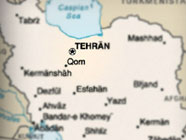
Last month, we asked you to take action on an AIPAC-backed resolution, S. Res. 65. We were concerned that this resolution, if passed in its original form, could become a "backdoor to war" with Iran, giving a green light for Israeli military action against Iran that would almost certainly compel the U.S. to join the fight.
1. Bills, Resolutions & Letters
2. FY14 Function 150 (Foreign Affairs Funding) Request
3. Hearings
4. Members on the Record
5. From the Press
1. Bills, Resolutions & Letters
2. Consolidated Appropriations Bill Passes (HR 933)
3. Hearings
4. Members on the Record
5. From the Press

I am writing in the afterglow of President Obama's speech in Jerusalem--an afterglow that lingers on as I re-read his words, and as I recall the boisterous applause that greeted them. I'm content to leave the word clouds and microscopic parsing of his speech to others. Likewise, I'll leave to others the speculation about what might have been, if only this speech had been given years earlier. For my part, I am unrepentantly stopping to savor the moment.
1. Bills, Resolutions & Letters
2. Israel, Syria and Egypt, Egypt, Egypt in the Continuing Resolution
3. Hearings
4. Members on the Record
5. From the Press

Last week I raised concerns about Dennis Ross's new 14-point peace plan, which would gut the very notion of the two-state solution. Ross's approach is the most prominent manifestation of a growing trend toward the acceptance of a seductive new logic that has emerged in the context of the current Israeli-Palestinian deadlock. According to this line of thought, breaking the deadlock requires an approach that falls comfortably within Israeli Prime Minister Benjamin Netanyahu's pro-"Greater Israel" political comfort zone, but that can somehow still be marketed as "pro-peace."

The news broke only hours ago: after 40 days, an agreement has finally been reached on a new Israeli governing coalition, with the new government to be sworn in next week. This news is the culmination of weeks of dramatic and sometimes melodramatic political machinations and theatrics, including public bargaining and issuing of ultimatums, coming on the heels of elections that yielded surprising results. In the end, the new Israeli ruling coalition will be composed of Netanyahu's Likud-Beiteinu faction (31 seats), aligned with Yair Lapid's Yesh Atid faction (19 seats) and Naftali Bennett's Jewish Home party (12 seats), and cemented by Tzipi Livni's HaTnuah faction (6 seats), with key ministries parceled out among the various parties.
1. Bills, Resolutions & Letters
2. AIPAC Policy Conference
3. Hearings
4. Members on the Record
5. From the Press

Just in time for President Obama's long-awaited trip to Israel, perennial Israeli-Palestinian policy strategist Dennis Ross has published his 14-point plan to achieve Middle East peace. Ross claims that by following this plan, Israelis and Palestinians can "chip away at the sources of each side's belief about the other's commitment to a genuine two-state solution."
Americans for Peace Now has serious concerns about S. Res. 65, an AIPAC-backed resolution recently introduced in the Senate that has been nicknamed by some the "Backdoor to War" resolution, since it effectively gives a green light for Israeli military action against Iran that, if carried out, would almost certainly require the U.S. to join the fight.
APN is urging Senators to refuse to cosponsor S. Res. 65.
Given the gravity of the issues at stake, APN is urging Senators to also refuse to permit S. Res. 65 to be ramrodded through the Senate according to a timetable defined by AIPAC - or any outside group.
We are urging Senators to instead call for a serious deliberation process, including committee hearings and markups during which concerns about S. Res. 65 can be aired and deficiencies in the resolution can be addressed.
Americans for Peace Now has serious concerns about HR 850, an AIPAC-backed Iran sanctions bill recently introduced in the House of Representatives.
APN is urging House members to refuse to cosponsor HR 850.
Given the gravity of the issues at stake, APN is urging House members to refuse to permit HR 850 to be ramrodded through Congress according to a timetable defined by AIPAC - or any outside group.
We are urging House members to instead call for a serious deliberation process, including committee hearings and markups during which concerns about HR 850 can be aired and deficiencies in the bill can be addressed.

Washington, DC - APN today released the following statement with respect to two new AIPAC-backed legislative initiatives on Capitol Hill:
.
1. Bills, Resolutions & Letters
2. AIPAC Policy Conference - Hill Agenda
3. Hearings
4. Members on the Record
5. From the Press
1. Bills, Resolutions & Letters
2. Leahy on the PA, UNESCO, and Timbuktu Antiquities
3. AIPAC Memo on Iran to the Hill - Foreshadowing Policy Conference Focus?
4. Hearings
5. Members on the Record
6. From the Press
During last night's State of the Union address, Obama's comments regarding Israel were brief. He stated: "...we will stand steadfast with Israel in pursuit of security and a lasting peace. These are the messages I'll deliver when I travel to the Middle East next month." These words feed the frenzy of speculation surrounding the upcoming Obama visit to Israel and Palestine. Why now? Is Obama signaling a renewed focus on the Israeli-Palestinian file? Does he have a peace plan? Or is this trip really about Iran and Syria?
The answer is almost certainly more mundane. After failing to travel to Israel in his first term, Obama and his advisors would be right to assess that there probably won't be a better time to go than now, and there will certainly be worse times. However, the actual reasoning behind Obama's visit became academic the moment the visit was announced, because the mere announcement of the visit put Israeli-Palestinian peace back on the agendas of both the U.S. and Israel.
1. Bills, Resolutions & Letters
2. Hagel Confirmation Hearing Focuses on...Israel and Iran
3. Upcoming Hearings
4. Members on the Record
5. From the Press
During today's confirmation hearing in the Senate Armed Services Committee, Senator Graham (R-SC) grilled former Senator Chuck Hagel about a variety of matters, including Hagel's failure to sign a letter circulated in 2000 regarding Israel. The text of that letter is available online here. What is not available online, it seems, is the AIPAC press release lauding the letter, dated October 13, 2000.
Happily, that press release still exists in my files and can be viewed here. Notably, that press release opens with the following:
[18 October update: The final number of signatories is 96. Senators Hagel (NE) and Gregg (NH) could not be reached by last Friday's deadline and they have not requested to be added to it. Abraham (MI) and Byrd (WV) were the only Senators who chose not to sign.]
So in answer to Sen. Graham's determined desire to know why Hagel refused to sign the letter - according to AIPAC (at the time), he didn't.
UPDATE: A version of this same press release, circulated a couple of days earlier, is still available online in the archives of IMRA (which also circulated the later release). That earlier version, which includes a similar intro in brackets, can be viewed here.
invite you to attend
Reorienting Strategy for Israeli-Palestinian Peace
with
Professor Menachem Klein Bar Ilan University, Israel
Foundation for Middle East Peace, Americans for Peace Now, Just Vision, and Telos Group invite you to attend:
Jerusalem - Pulling the city back from the brink
with
Danny Seidemann & Ronit Avni
1. Bills, Resolutions & Letters
2. APN Letter to Obama on the Occasion of his Inauguration
3. From the Press
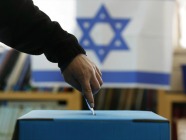
This week Israelis went to the polls to elect members of the 19th Knesset. The results of these elections surprised pollsters and pundits alike. APN provides resources to help you understand what happened, what could happen next, and what it all means.
There's lots of talk today about what happened in Israel's elections, why it happened, and what it means. A lot of this remains in the realm of speculation - as in, it is not clear yet what the next Israeli government will look like. Likewise, the big winner in this election - Yair Lapid and his new party - remains something of a cipher, with Lapid's views on the full range of issues, including Israel-Palestinian peace-related issues, unclear and possibly as-yet unformed. Nonetheless, there are clear reasons to view yesterday's election results as good news, from the perspective of those of us who care about Israel's character as a progressive democracy and who believe in the vital importance of ending the occupation and achieving peace through a two-state solution.
1. Bills, Resolutions & Letters
2. Key Committees/Subcommittees in the 113th Congress
3. From the Press

On December 31, 2012, Time Magazine published an article entitled, "The West Bank's 2012: The Year of the Israeli Settlement." Earlier this week, the Israeli Peace Now movement released a new report that makes a case for a different title: 2009-2013: the Years of the Israeli Settlements. The new report (which I co-authored) details the Netanyahu government's record on settlements over the course of its past 4 years in office. The results are incontrovertible: by every objective measure, the Netanyahu government has demonstrated that it is determined to use settlements to destroy the very possibility of the two-state solution.

On January 21, 2013, Barack Obama will be inaugurated for his second term as the 44th president of the United States of America. As this day nears, it seems inevitable that he should be thinking about the legacy that he wants to leave after eight years at the helm of this great country. In the Israeli-Palestinian arena, the arc of history has dealt him a clear, binary choice: he can go down in history as the U.S. president who fought for and saved the two-state solution to the Israeli-Palestinian conflict, or he can go down in history as the president on whose watch the two-state solution was lost, at the cost of the vital interests of both Israel and the United States.
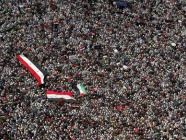 A headline in yesterday's Yediot Ahronot reads: "Senior IDF officer: 3rd intifada has begun." Behind this breathless headline are quotes from the senior Israeli army commander for the area around Bethlehem. He states, among other things, that,
A headline in yesterday's Yediot Ahronot reads: "Senior IDF officer: 3rd intifada has begun." Behind this breathless headline are quotes from the senior Israeli army commander for the area around Bethlehem. He states, among other things, that,
"the process lead by Abu Mazen is over, replaced by the attitude promoted by Hamas. Abu Mazen [Abbas] is trying to survive the Arab Spring and he understands that the path of negotiations with Israel is over. The question is - what will follow? We may see regional anarchy along a military campaign of our own."
1. Bills, Resolutions & Letters (113th Congress)
2. Bills, Resolutions & Letters (end of 112th Congress)
3. Members on the Record
4. Hagel on the Record on the Middle East
The 113th Congress convened on January 3, 2013. The 2013 House Calendar is available here; the 2013 Senate Calendar is available here.
ICYMI: APN Briefing Call 1/2/13: Leading Israeli columnist Akiva Eldar analyzes pre-elections Israeli politics; APN publication 12/31/13: Hard Questions, Tough Answers with Yossi Alpher: On Israeli elections, the 2-state solution leads
 As anyone who pays attention to the news cannot help but be aware, in recent weeks the Netanyahu government has opened the settlement floodgates, approving massive settlement expansion, especially in and around East Jerusalem. The most recent of these approvals was announced this week - the approval of more than 1000 new units in a new settlement neighborhood known as Mordot Gilo. Also this week, in a step toward normalizing settlements as part of Israel, the Israeli government decided to formally recognize a college in the settlement of Ariel as a fully-accredited Israeli university.
As anyone who pays attention to the news cannot help but be aware, in recent weeks the Netanyahu government has opened the settlement floodgates, approving massive settlement expansion, especially in and around East Jerusalem. The most recent of these approvals was announced this week - the approval of more than 1000 new units in a new settlement neighborhood known as Mordot Gilo. Also this week, in a step toward normalizing settlements as part of Israel, the Israeli government decided to formally recognize a college in the settlement of Ariel as a fully-accredited Israeli university.
1. Bills, Resolutions & Letters
2. Members on the Record
3. Hagel on the Record on the Middle East
ICYMI:
APN statement 12/18: APN Rejects Attacks on Sen. Hagel
At the Daily Beast's Open Zion 12/17: Disingenuous Defenses of Netanyahu's Settlement Plans
At the Daily Beast's Open Zion 12/17: Top Ten Issues the ADL Ignored
This week saw ugly and deeply dishonest attacks launched against former Senator Chuck Hagel (R-NE), in the context of his name being floated as the possible nominee for the next Secretary of Defense. APN's position on Hagel and rejecting these attacks is available here.
For the sake of those who are not familiar with Hagel's real record on the issues (and are so far relying on reports that, when examined, prove inaccurate if not duplicitous), below is a compendium of major statements made by Hagel expressing his views on Israel and the Middle East and spanning his time in office.
Hagel on the Senate floor, 7/31/06: MIDDLE EAST--A REGION IN CRISIS
Hagel at the World Affairs Council speech, 5/20/03: "Next Steps in the Middle East"
Hagel in the Washington Post, 7/19/02: We Shouldn't Make Arafat the Issue
Hagel on the Senate floor, 6/14/02: PEACE IN THE MIDDLE EAST
Hagel on the Senate floor, 4/12/2002: THE MIDDLE EAST
------------
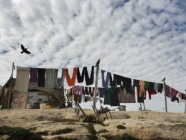 In recent weeks it has been fascinating to watch defenders of the Netanyahu government and the settlement enterprise engaging in logical and rhetorical contortions to try to justify the Netanyahu government's pro-settlement policies. What has emerged is simultaneously the most disingenuous and in some ways the most honest discussion of settlements in years.
In recent weeks it has been fascinating to watch defenders of the Netanyahu government and the settlement enterprise engaging in logical and rhetorical contortions to try to justify the Netanyahu government's pro-settlement policies. What has emerged is simultaneously the most disingenuous and in some ways the most honest discussion of settlements in years.
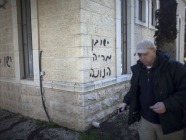 The ADL came out last week with its Top 10 list of "Issues Affecting Jews in 2012,"a list that conspicuously omits mention of many of the most troubling issues affecting Jews this past year. Below is a list of the most glaring omissions.
The ADL came out last week with its Top 10 list of "Issues Affecting Jews in 2012,"a list that conspicuously omits mention of many of the most troubling issues affecting Jews this past year. Below is a list of the most glaring omissions.
1. Bills, Resolutions & Letters
2. From the Press
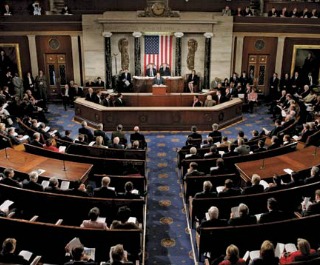
Last week we alerted you to an anti-peace, anti-Palestinian letter in Congress, urging you to contact your Member of Congress and ask them not to sign on. That letter has now been held open for signatures through the end of this week - a development that means that your activism is working, and the letters' backers are having trouble getting large numbers of members to sign on.
If you already contacted your member of Congress on this issue, thank you! If you didn't, there is still time!
This morning, Reps. Ros-Lehtinen (R-FL), Berman (D-CA), Royce (R-CA) and Engel (D-NY) began circulating a letter to be sent to President Obama. The letter, which is circulating House-wide for cosponsors, calls on President Obama close the PLO office in Washington, to call the U.S. Consul General in Jerusalem back to Washington for consultations, and to use "every means at our disposal to ensure that this General Assembly vote does not serve as a precedent for elevating the PLO in other UN bodies or international forums." The letter notes that this includes "reaffirming our commitment to maintaining and enforcing U.S laws that require withholding U.S. contributions from any international forum that grants membership to the PLO. The subject line of the email sent around seeking cosigners on the letter reads "Sign bipartisan, AIPAC-supported letter to the President calling for consequences for Palestinian leadership and UN for unilateral statehood scheme."
The full text of the letter is available here.
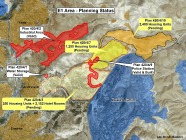
The main objection from the Israeli government to a UN upgrade of the Palestinians' status focused, ostensibly, on the fear that it will open the door for legal action against Israel and Israelis in the International Criminal Court - something the ICC has rejected in the past. However, the decisions and actions of the Israeli government in the wake of the UN vote give rise to the question: is the Netanyahu government deliberately trying to provoke the Palestinians to take a case to the ICC, and is he trying to deliberately provoke the ICC to take action?
1. Bills, Resolutions & Letters
2. NDAA Advances to House-Senate Conference
3. Hearings
4. Members on the Record
5. From the Press

E-1 is back in the news, with a vengeance. In this document we provide all the information you need to know about this controversial settlement project, as well as answer questions you might have and refute the erroneous or deliberately misleading arguments that are being bandied about.
Recently, the European Union adopted harsh new Iran sanctions, strongly supported by Israel. Shortly thereafter, Israel announced new East Jerusalem settlement construction. The EU's top official Catherine Ashton, who was about to visit Israel, condemned the announcement in measured terms; Israel's Foreign Minister, Avigdor Lieberman, publicly told her, in effect, to shove it. Imagine if in response, Ashton had indefinitely postponed her trip. Imagine that Israeli ambassadors in EU capitals were summoned to the local foreign ministries and read the riot act. Imagine that Israeli press had been alerted, leading to headlines about how Prime Minister Netanyahu and Lieberman were squandering the friendship of the EU and European support on Iran for the sake of settlement expansion.

Washington/Jerusalem - Americans for Peace Now (APN) today called on the Obama Administration and the international community to take urgent action to induce the Netanyahu government to abandon its decision to pursue massive new settlement construction in the West Bank and East Jerusalem. APN's call comes on the heels of reports of a decision of the Netanyahu government to respond to yesterday's action at the United Nations by approving thousands of new settlement units in the West Bank and East Jerusalem, and by expediting plans to build the massive new settlement of E-1 - a settlement that, if constructed, would make the implementation of a viable two-state exponentially more difficult, if not impossible.
2. NDAA Amendments Target Palestinians, UN, and More
3. Responses to UNGA vote
4. Hearings
5. Members on the Record
6. From the Press
These amendments were offered, notwithstanding the fact that there is nothing related to funding or programs for the Palestinians or the United Nations in the NDAA.
The amendments are: SA 3139, SA 3171 and SA 3203. SA 3139 and SA 3171 are partisan (supported only by Republicans) and, in their substance and drafting, pretty ham-fisted. SA 3203 is also pretty ham-fisted, but it is bipartisan and could be viewed as more "reasonable" and "moderate" than the other two amendments, and in effect is more broadly consistent with the tone that Israel is increasingly taking (i.e., that the UN vote to upgrade the Palestinians' status isn't really important; what is really important is what happens next). It thus seems likely that the real action on this issue will be around SA 3203. In that context, the other two amendments play a useful role in making SA 3203 look measured and "reasonable" by comparison.
The amendment was introduced by Senators Hatch (R-UT), Roberts (R-KS), Chambliss (R-GA), Barrasso (R-WY), Inhofe (R-OK), Wicker (R-MI), Lee (R-UT), Coburn (R-OK), Risch (R-ID), and Rubio (R-FL). The text can be viewed here.
The vehicle for this attack is S. 3254 - the highly contentious National Defense Authorization Act, which the Senate is now considering. For those who keep track of these sorts of things, there is NOTHING in the NDAA that in any way relates to the Palestinians. No funding, no programs - nothing. But that hasn't stopped Senators Barrasso (R-WY), Lee (R-UT), and Inhofe (R-OK) from introducing an amendment whose purpose is defined as "To provide for restrictions on foreign assistance related to the status of the Palestinian mission to the United Nations." A copy of the amendment, which was filed this afternoon, is available here. Senator Barrasso's press release touting introduction of the amendment is available here.
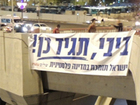 ...the correct line of public diplomacy for Israel is to warmly embrace the idea of establishing a Palestinian state alongside Israel and welcoming the UN vote. The Palestinian bid should be seen as an Israeli achievement because affirmation of its contents would be a de facto historic recognition of the borders of Israel and negation of the historic Palestinian aspiration to wipe Israel off the map."
...the correct line of public diplomacy for Israel is to warmly embrace the idea of establishing a Palestinian state alongside Israel and welcoming the UN vote. The Palestinian bid should be seen as an Israeli achievement because affirmation of its contents would be a de facto historic recognition of the borders of Israel and negation of the historic Palestinian aspiration to wipe Israel off the map."
Consistent with APN's longstanding support for peace and a negotiated two-state solution to the Israeli-Palestinian conflict, Americans for Peace Now today called on the Obama Administration and the international community to support the Palestinians' bid to upgrade their status at the UN to that of non-member observer state.
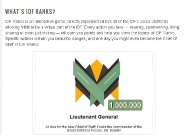 Over the course of the latest Gaza war, a lot of attention became
focused on the IDF's new and aggressive online social media strategy, in
which the IDF used social media - especially Twitter - and online
gaming tactics to get its message out. The effort also included
Instagram, as covered in buzzfeed and on Slate.
Over the course of the latest Gaza war, a lot of attention became
focused on the IDF's new and aggressive online social media strategy, in
which the IDF used social media - especially Twitter - and online
gaming tactics to get its message out. The effort also included
Instagram, as covered in buzzfeed and on Slate.
 At the invitation of the New York Times "Room for Debate," APN's Lara Friedman weighed in with analysis of what President Obama can and should do to address the Gaza-Israel crisis and to ensure that any new ceasefire does not become simply an intermission between rounds of violence.
At the invitation of the New York Times "Room for Debate," APN's Lara Friedman weighed in with analysis of what President Obama can and should do to address the Gaza-Israel crisis and to ensure that any new ceasefire does not become simply an intermission between rounds of violence.---------------------------------------------------------
APN Resource Page on the Gaza Crisis
---------------------------------------------------------
As talk of a ground operation in Gaza gains momentum, we must remember one thing: without a political resolution, the next round of violence is only a matter of time, and the future of the residents of the South is not secure. The Government of Israel must sit immediately with Abu Mazen, who rejects terrorism and violence, and reach an agreement with the moderate, pragmatic forces of the Palestinian people, before it is too late. Without a political resolution it will not end!
(translation by APN's Ori Nir)

In response to the ongoing Gaza-Israel war, Senators Gillibrand (D-NY) and Kirk (R-IL) this afternoon circulated a resolution that they reportedly hope to have the Senate pass by unanimous consent, possibly as early as this evening. The resolution subject:
expressing vigorous support and unwavering commitment to the welfare, security, and survival of the State of Israel as a Jewish and democratic state with secure borders, and recognizing and strongly supporting its right to act in self-defense to protect its citizens against acts of terrorism.
2. Hearings
3. Members on the Record
4. From the Press
Congress returned from the elections recess this week, after holding only pro-form sessions since late September (meaning that legislation was introduced during this period, as can be seen in Section 1, below).
Note: On 11/14/12 Americans for Peace Now issued a statement regarding the escalation of hostilities between Gaza and Israel. On 11/15/12, APN hosted a briefing call with former senior Mossad official Yossi Alpher (audio here). In addition, some APN analysis of possible interest to readers: (1) analysis of what the ongoing Palestinian effort to attain enhanced status at the UN, means under current U.S. law, Round Two at Turtle Bay; and (2) a look at Abbas' much-ignored/dismissed interview with Israel's Channel 2 earlier this month, If Not Now, When? If Not Abbas, Who?
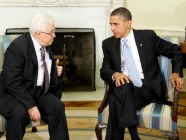 For the second consecutive year, the Palestinians are seeking enhanced status at the U.N. It feels like a re-run of 2011, but there are significant legal and political differences that should not be overlooked.
For the second consecutive year, the Palestinians are seeking enhanced status at the U.N. It feels like a re-run of 2011, but there are significant legal and political differences that should not be overlooked.
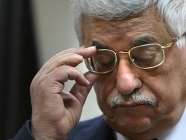 Suppose Palestinian President Mahmoud Abbas told an interviewer that
he'll never recognize Israel or accept any agreement that doesn't give
the Palestinians every inch of historic Palestine, including all of
Jerusalem. He insists on full Palestinian right of return - including
his own right of return to his native Safed, which since 1948 has been
part of Israel -- and maintains that it is the Palestinians' right to
use all means, including violence, to achieve their goals.
Suppose Palestinian President Mahmoud Abbas told an interviewer that
he'll never recognize Israel or accept any agreement that doesn't give
the Palestinians every inch of historic Palestine, including all of
Jerusalem. He insists on full Palestinian right of return - including
his own right of return to his native Safed, which since 1948 has been
part of Israel -- and maintains that it is the Palestinians' right to
use all means, including violence, to achieve their goals. Today's announcement that the Israeli government if moving full steam ahead with the construction of nearly 1300 new settlement units should surprise nobody. The announcement paves the way for construction in Pisgat Zeev and Ramot (settlement neighborhoods of East Jerusalem), as well as in the huge and extremely controversial settlement of Ariel - a settlement located smack-dab in the middle of the northern West Bank, in a location that makes its inclusion as part of Israel under any realistic borders scenario pretty much impossible.
Today's announcement that the Israeli government if moving full steam ahead with the construction of nearly 1300 new settlement units should surprise nobody. The announcement paves the way for construction in Pisgat Zeev and Ramot (settlement neighborhoods of East Jerusalem), as well as in the huge and extremely controversial settlement of Ariel - a settlement located smack-dab in the middle of the northern West Bank, in a location that makes its inclusion as part of Israel under any realistic borders scenario pretty much impossible. The reaction from parts of the American Jewish community to a letter to
Congress from a group of Christian leaders is deeply disturbing.
The reaction from parts of the American Jewish community to a letter to
Congress from a group of Christian leaders is deeply disturbing.Why did this letter elicit such outrage? Was it the suggestion that U.S. funding shouldn't support policies that undermine the prospects for peace? There's nothing inherently anti-Israel about this suggestion -- and in the context of the full letter, it is clearly an expression of these leaders' frustration in the face of Israeli government policies that undermine a future two-state solution.
 Recent developments in Jerusalem pose a threat to the stability of the city and to the region. The world saw a preview over the recent Jewish holidays, when activists challenged the Israeli-imposed ban on Jewish prayer on the Temple Mount, known to Muslims as al-Haram al-Sharif. Sensitivities at the site tend to peak during any holiday season; however, these latest challenges cannot be dismissed as routine or benign.
Recent developments in Jerusalem pose a threat to the stability of the city and to the region. The world saw a preview over the recent Jewish holidays, when activists challenged the Israeli-imposed ban on Jewish prayer on the Temple Mount, known to Muslims as al-Haram al-Sharif. Sensitivities at the site tend to peak during any holiday season; however, these latest challenges cannot be dismissed as routine or benign.
 Headlines today are focused on the announcement yesterday by Israeli
Prime Minister Benjamin "Bibi" Netanyahu of early Knesset elections.
Rather than add to the feeding frenzy of speculation, today I want to
weigh in, belatedly, on Bibi himself.
Headlines today are focused on the announcement yesterday by Israeli
Prime Minister Benjamin "Bibi" Netanyahu of early Knesset elections.
Rather than add to the feeding frenzy of speculation, today I want to
weigh in, belatedly, on Bibi himself.
2. Hearings
3. Members on the Record
4. From the Press
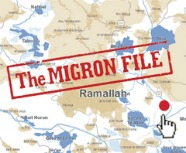 The recent evacuation of the illegal outpost known as Migron, following numerous decisions of the Israeli Supreme Court, is a clear victory for democracy and rule of law in Israel, notwithstanding the fact that marks neither the end of settlement activity nor the beginning of the implementation of the two-state solution. After years of legal battles, Peace Now succeeded in having the Court compel the Israeli government to respect and enforce its own laws, despite strong political pressure not to.
The recent evacuation of the illegal outpost known as Migron, following numerous decisions of the Israeli Supreme Court, is a clear victory for democracy and rule of law in Israel, notwithstanding the fact that marks neither the end of settlement activity nor the beginning of the implementation of the two-state solution. After years of legal battles, Peace Now succeeded in having the Court compel the Israeli government to respect and enforce its own laws, despite strong political pressure not to. Some argue that the Migron victory is nonetheless pyrrhic, given the current Israeli government's de facto policy of compensating the settlers for any eviction with even more settlement construction. The reality is both more complicated and more promising. There are many lessons to be learned from the Migron case, including some negative implications alongside the positive ones. We believe that the bottom line is that due to Peace Now's indefatigable efforts to stop the settlements, the ground today is shifting in significant ways against the settlers. The following Top 10 List does not purport to provide a full analysis of the Migron case, but offers some food for thought regarding the achievements and the successes of the story of Migron, and its implications for the future.
Washington, DC - APN today condemned the attack on President Obama and the Democratic National Committee over language in the Democratic platform regarding Jerusalem.
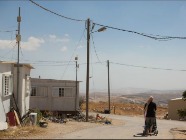 Writing in today's Hebrew-language edition of Yediot Ahronot, Peace Now Secretary General Yariv Oppenheimer challenges the despair and defeatism that gives rise to the view that the settlers' have already won and the two-state solution is dead. Translation by Israel News Today.
Writing in today's Hebrew-language edition of Yediot Ahronot, Peace Now Secretary General Yariv Oppenheimer challenges the despair and defeatism that gives rise to the view that the settlers' have already won and the two-state solution is dead. Translation by Israel News Today.It is All Reversible
Washington - Yesterday, the Israeli High Court of Justice rejected the latest effort by settlers from the illegal outpost of Migron to prevent the outpost's evacuation. The Court ruled that the outpost must be evacuated by next Tuesday, September 4th.
2. Hearings
3. Ackerman (D-NY) on Romney Travels
4. Ron Paul (R-TX) on Iran Sanctions
5. Members on the Record
6. From the Press
Note: Congress is now in recess until September 10 - which means the Round-Up is in recess until September 14.
Shameless plug: New post at the Daily Beast/Open Zion 8/2: Exploiting Jews from Arab Countries
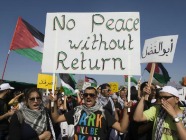
Last month saw an assault in Congress on Palestinian refugees--an effort to use legislation to re-define the Palestinian refugee issue out of existence. This week the other shoe dropped, when a bipartisan group of members of Congress introduced a new bill embracing the cause of "Jewish refugees from Arab countries" in a way that Congress has never replicated on the Palestinian side (for more info, see this list of all bills/resolutions dealing with Palestinian and/or Jewish refugees since 1989).
read more at the Daily Beast's Open ZionOn August 2nd, 2012, Yedioth Ahronoth (Hebrew print edition) published a powerful article looking at the financial bonus that settlements enjoy compared to areas inside the Green Line. The article comes on the heels of Peace Now's publication of an analysis of the budget and a plan to save billions by reducing some benefits to settlements.
The translation is by Israel News Today (INT).
Bonus for Settlements: NIS 1,059,988,790
Yedioth Ahronoth (p. 4) by Gad Lior and Yuval Karni -- While the middle class is bowing under the weight of rising taxes and an expected cutback in the budget of the government ministries, Prime Minister Binyamin Netanyahu was asked about the special budgets transferred every year to the settlements. "These are negligible amounts," Netanyahu said, "it's a drop in the ocean." But an examination of the data shows that the amount in question reaches over NIS 1 billion per year--hardly a "negligible" amount.
"It is deeply troubling that Governor Romney, his advisors, and some of his key supporters are seeking to exploit Israel as a partisan issue to score political points in this election campaign. This is a reckless and irresponsible tactic that comes at the expense of the best interests of both the U.S. and Israel.
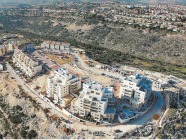 On July 30th, the Calcalist published a major report [Hebrew] examining the issue of Israeli government spending on settlements. Among other things, the articles note that government spending on settlements increased by 38% under the Netanyahu government (from 2010 to 2011). The articles also note the fact that Israeli government spending on settlements from 1992-2011 totaled NIS 27 billion (in 2011 terms). To get a sense of the magnitude of this spending, the article notes that in 2010 the Israeli government allocated a budget of NIS 27.5 bilion over ten years "for
the first stage of project to introduce into [the entire country of] Israel a network of fast
highways and railway lines." All articles translated by Israel News Today (INT).
On July 30th, the Calcalist published a major report [Hebrew] examining the issue of Israeli government spending on settlements. Among other things, the articles note that government spending on settlements increased by 38% under the Netanyahu government (from 2010 to 2011). The articles also note the fact that Israeli government spending on settlements from 1992-2011 totaled NIS 27 billion (in 2011 terms). To get a sense of the magnitude of this spending, the article notes that in 2010 the Israeli government allocated a budget of NIS 27.5 bilion over ten years "for
the first stage of project to introduce into [the entire country of] Israel a network of fast
highways and railway lines." All articles translated by Israel News Today (INT). 2. Hearings
3. Members on the Record
4. From the Press
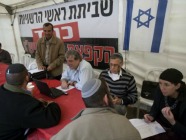 Today's New York Times features an op-ed by Dani Dayan, the head of the Yesha Council (the group that represents settlers and their interests). There isn't really any news here: it shouldn't surprise anyone that the settlers want the world to believe that settlements are good, peace efforts are pointless, and that the way forward should be premised on leaving all settlements in place, and leaving the West Bank under Israeli control, in perpetuity. Nonetheless, it is worth examining some representative snippets from this high profile op-ed.
Today's New York Times features an op-ed by Dani Dayan, the head of the Yesha Council (the group that represents settlers and their interests). There isn't really any news here: it shouldn't surprise anyone that the settlers want the world to believe that settlements are good, peace efforts are pointless, and that the way forward should be premised on leaving all settlements in place, and leaving the West Bank under Israeli control, in perpetuity. Nonetheless, it is worth examining some representative snippets from this high profile op-ed.

APN's Lara Friedman recently returned from Istanbul, where she participated in a Hollings Center's dialogue on Foreign Policy and Competing Mediation in the Middle East and Central Asia.
2. CUFI on the Hill
3. Bachmann finds/crosses a red line?
4. Hearings
5. Members on the Record
6. From the Press
Read the full article here.
2. Hearings
3. Campaign to Get American Residents of Israel to Vote in US Elections, for Israel's Sake
4. Members on the Record
5. From the Press
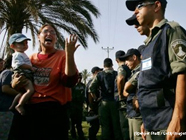 What do you call a unilateral "withdrawal" that leaves Israeli settlers and soldiers behind? The answer: Continued occupation.
What do you call a unilateral "withdrawal" that leaves Israeli settlers and soldiers behind? The answer: Continued occupation.
--------------------
With Israeli-Palestinian efforts at an impasse and immediate-term hopes for progress toward any agreement fading, the appeal of new ideas is understandable. This is no doubt why discussion of Israeli unilateral options--generally in terms of unilateral "withdrawals" from the West Bank--is in the air.
=======================
1. Bills, Resolutions &
Letters
2. Senate FY13 ForOps -
Details
3. Upcoming
Events/Hearings
4.
Members on the Record
5. From the Press
=======================
 The ugly reports keep rolling in. A rally against African migrants turns
violent and a race riot ensues; the whole thing is repeated a week
later. A Jewish-Israeli of Ethiopian descent is "mistaken" for a migrant
and assaulted in Tel Aviv. A group of teenagers in Tel Aviv is arrested
for a series of brutal, racially-motivated robberies and assaults
targeting Africans. A Sudanese man is viciously beaten in Tel Aviv. A
Sudanese hotel worker is nearly lynched in Eilat. An apartment in
Jerusalem is torched with 10 Eritreans trapped inside.
The ugly reports keep rolling in. A rally against African migrants turns
violent and a race riot ensues; the whole thing is repeated a week
later. A Jewish-Israeli of Ethiopian descent is "mistaken" for a migrant
and assaulted in Tel Aviv. A group of teenagers in Tel Aviv is arrested
for a series of brutal, racially-motivated robberies and assaults
targeting Africans. A Sudanese man is viciously beaten in Tel Aviv. A
Sudanese hotel worker is nearly lynched in Eilat. An apartment in
Jerusalem is torched with 10 Eritreans trapped inside.
David Suissa wants us to believe that settlements aren't an obstacle to peace because their physical "footprint," their built-up area, represents "only" around 1% of the West Bank.
1. Bills, Resolutions & Letters
2. Senate Passes More Iran Sanctions
3. Senate Moves on FY13 ForOps - Includes Attack on Palestinian Refugee Status
4. Members on the Record
5. From the Press
The ugly racism that was on display last night in Tel Aviv was a symptom of this phenomenon. A rally against African migrants turned violent and a race riot ensued. It followed on the heels of a rally earlier in the week characterized by similarly racist, hateful themes.
 You have to laugh, or it would make you cry. That is, if you are someone
who genuinely cares about Israel and believes that the two-state
solution is the only thing that can save Israel as a democracy and a
Jewish state, and that can end the occupation and permit the
Palestinians to live, finally, as a free people with dignity and
self-determination.
You have to laugh, or it would make you cry. That is, if you are someone
who genuinely cares about Israel and believes that the two-state
solution is the only thing that can save Israel as a democracy and a
Jewish state, and that can end the occupation and permit the
Palestinians to live, finally, as a free people with dignity and
self-determination.2. House Passes Iran "Red Lines" Resolution, but Important Clarifications Now on the Record
3. House Passes FY13 NDAA (details or Iran/Mideast Amendments)
4. Senate Tries, and Fails, to Pass More Iran Sanctions
5. Hearings & Confirmations
6. Members on H. Res. 568 (red lines resolution)
7. Members on the Record
8. From the Press
With new Iran talks set for May 23rd, and the House adjourning at the end of this week until May 30, one of the main themes of the week in both the House and Senate was Iran (as is evident from the table of contents of today's Round-Up).
The apparent goal was for Congress to send "messages" to Iran about how tough it is prepared to be if Iran doesn't play ball in talks. Supporters of this approach suggest that Congress is helping the president, acting as the "bad cop" to the president's "good cop," and letting Iran know that "if you don't deal with him, you're going to have to deal with us."
Critics of this approach, on the other hand, suggest that Congress is undermining the effort to find a way, short of war, to address Iran's nuclear program - by sending a message to Iran that the President does not have the support he needs to negotiate any agreement with Iran, even if Iran is ready to make one. The latter is not far-fetched, given that most sanctions in place against Iran today have been imposed via laws passed by Congress (meaning they can only be lifted by Congress passing a new law) rather than, as was the case in the past, by acts of the President (i.e., via executive orders that the President had the authority, on his own, to rescind). Indeed, some members are coming out openly opposing diplomacy - for example, in a statement 5/17/12, HFAC Chair Ros-Lehtinen, R-FL, noted that she was "deeply concerned that the Administration's foolish embrace of yet another round of negotiations will only embolden the regime."
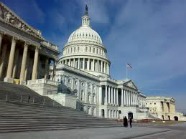
Below is the message sent May 16, 2012 to House staffers expressing APN's encouragement to members to sign this constructive, timely, bipartisan letter in support of a diplomatic effort whose success is important to the national security of both the U.S. and Israel.
I want to draw your attention to a bipartisan Dear Colleague letter currently circulating in the House, seeking cosigners on a letter to President Obama regarding upcoming P5+1 talks in Baghdad. The letter was initiated by Reps. Price (D-NC) and Dreier (R-CA).
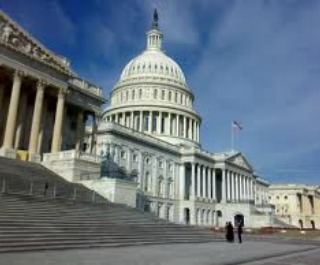
Thank you so much for taking action on H. Res. 568 - it made a difference (see below). Now we need you to follow up and take action one more time this week.
Tell your member of Congress: Sign the Price-Dreier letter to President Obama.

Below is the message sent May 14, 2012 to House staffers expressing APN's opposition to H. Res. 568.
Tomorrow, the House is scheduled to bring H. Res. 568, dealing with Iran, to the floor under suspension of the rules.
Americans for Peace Now (APN) urges members of Congress to vote NO or PRESENT on this resolution.
APN Legislative Round-Up
for the week ending
May 11, 2012
=======================
1. Bills, Resolutions & Letters
2. Draft House version of Defense Authorization Ups the Ante on Iran
3. FY13 Foreign Ops - House Version
4. Hearings & Confirmations
5. Members on Passage of HR 4133
6. Members on the Record
7. From the Press
 Thank you, Ambassador Oren. On Sunday you told an audience in Detroit what "pro-Israel" means.
Thank you, Ambassador Oren. On Sunday you told an audience in Detroit what "pro-Israel" means. You said that "The person who is pro-Israel recalls what Jewish life was like without a Jewish state and works to ensure that there always will be a Jewish state." Someone who "knows that there is a place at our table for divergent views. But irrespective of politics... asks, 'how can I contribute to Israel, how can I enrich it and be enriched by it...?'" Someone who "appreciates the immense threats the people of Israel face every day" and "understands the threats to Israel of not achieving peace but also understands the threat to Israel of making a peace that will quickly unravel..."
The Supreme Court, however, apparently has not changed its mind on the question of whether rule of law applies to outposts. On May 6th, that court of rejected the State's request to postpone Ulpana's eviction. The Court ruled, instead, that the demolition must be carried out by July 1st. The full court ruling is available here (Hebrew only).
 The Forward's interview with Mousa Abu Marzook highlights some fundamental truths about peacemaking: You make peace with your enemies, not your friends; you make peace not to be nice, but because it is in your self-interest; real peace must reflect a balance of interests, not an imbalance of power, and security arrangements, not trust, will be the foundation of any peace treaty.
The Forward's interview with Mousa Abu Marzook highlights some fundamental truths about peacemaking: You make peace with your enemies, not your friends; you make peace not to be nice, but because it is in your self-interest; real peace must reflect a balance of interests, not an imbalance of power, and security arrangements, not trust, will be the foundation of any peace treaty. This weekend the world got a close-up view of the growing rift between Israel's own security experts and its politicians. The venue was a conference in New York organized by the Jerusalem Post. During the conference a public argument over Iran broke out between former Israeli Mossad chief Meir Dagan and Israeli Minister of Environment Gilad Erdan, a career Likud politician whose resume does not include any significant military/security experience.
This weekend the world got a close-up view of the growing rift between Israel's own security experts and its politicians. The venue was a conference in New York organized by the Jerusalem Post. During the conference a public argument over Iran broke out between former Israeli Mossad chief Meir Dagan and Israeli Minister of Environment Gilad Erdan, a career Likud politician whose resume does not include any significant military/security experience. 2. Hearings & Confirmations
3. Members on the Record
4. From the Press
With this decision, these three outposts become new "legal" settlements in the West Bank, with all the benefits that entails, including the right to plan and expand.
This is the first time a government of Israel has formally established even a single new settlement since the Shamir Government in 1990. Moreover, all Israeli governments have promised to remove the illegal outposts (as required, for example, under the he Roadmap). However, until now, no real outpost has been ever removed.
 In characterizing all non-violent Palestinian measures as terrorism, Israel insults the memory of victims of real acts of terror.
In characterizing all non-violent Palestinian measures as terrorism, Israel insults the memory of victims of real acts of terror.Yesterday was Yom Hazikaron, Israeli Remembrance Day. Every year on this day Israelis stop to remember their fellow citizens who have given their lives for the sake of Israel, whether in wars or at the hands of terrorists.
With new Iran talks underway, this is an important insight. And it's a corollary to something that my friend and colleague, Jerusalem expert Daniel Seidemann, often says about solving the Israeli-Palestinian conflict: The challenge is to bridge between the politically impossible and the historically inevitable.
2. Clinton Over-Rules Ros-Lehtinen on Palestinian Aid
3. Hearings & Confirmations
4. Members on the Record
5. From the Press
Congress was back this week from its Spring Break. During the break, there were two APN articles of note, both in the Daily Beast's Open Zion blog: Israel's Less-Than-Resilient Democracy (a response to Ambassador Oren) and Yes, Israel is Thriving, But All's Not Well (a response to Elliott Abrams). Another important piece worth highlighting is by NIAC's Jamal Abdi in the Huffington Post 4/13/12: How Hawks on the Hill Plan to Kill Talks with Iran
Also, NORPAC's annual mission to Washington is coming up on May 9.
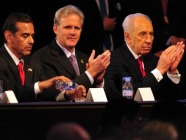 According to the latest article by Israeli Ambassador Michael Oren,
Israeli democracy is "more robust and effervescent than ever." Reading
his lengthy piece, a variation on Queen Gertrude's quip comes to mind:
"The Ambassador doth protest too much, methinks."
According to the latest article by Israeli Ambassador Michael Oren,
Israeli democracy is "more robust and effervescent than ever." Reading
his lengthy piece, a variation on Queen Gertrude's quip comes to mind:
"The Ambassador doth protest too much, methinks." 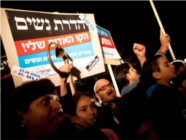 Elliott Abrams says J Street (and along with J Street, no doubt, all
Americans and Israelis who define themselves as the pro-Israel,
pro-peace Left) isn't really worried about Israel's fate as a Jewish
state and a democracy.
Elliott Abrams says J Street (and along with J Street, no doubt, all
Americans and Israelis who define themselves as the pro-Israel,
pro-peace Left) isn't really worried about Israel's fate as a Jewish
state and a democracy.No, says Abrams, "the gloom and doom is absurd... As to internal matters in Israel, we've heard all that before: a couple of decades ago people said the Sephardi-Ashkenazi splits would deepen and threaten national unity.... J Street's real problem is that Israel is thriving under [conservative] Likud leadership and it drives them crazy."
Abrams' statement raises the question: is the doom and gloom really absurd, and how does he define "thriving"?
2. Reid tries to Rush Through New Iran Sanctions
3. Hold lifted on part of Palestinian aid (with conditions)
4. Hearings & Confirmations
5. Members on the Record
6. From the Press
Note: On 3/27/12 the Congressional Research Service (CRS) released a new report on Iran, entitled "Israel: Possible Military Strike Against Iran's Nuclear Facilities". The report was the subject of a lot of media coverage. Rather than include that coverage here, we prefer to recommend that people read the report for themselves.
 Peter Beinart's recent New York Times article advocating a settlement
boycott has sparked a spectacular public display of Jewish angst.
Apparently for many who view themselves as the judges, advocates and
juries of what is "kosher" progressive Jewish activism, his suggestion
is beyond the pale.
Peter Beinart's recent New York Times article advocating a settlement
boycott has sparked a spectacular public display of Jewish angst.
Apparently for many who view themselves as the judges, advocates and
juries of what is "kosher" progressive Jewish activism, his suggestion
is beyond the pale.They agree that settlements are a problem, even a shonda, but boycott fellow Jews? Heaven forbid. And even if it weren't Jewishly distasteful, it wouldn't work anyway, so don't go there.
2. Hearings
3. Members on the Record
4. From the Press
Note: Last week Jon Stewart's The Daily Show focused on something that has been covered a lot in the Round-Up - the cut-off of aid to UNESCO due to UNESCO's admittance of the Palestinians (based on a law that dates back from an era when the PLO was an FTO and when the term "Palestinian state" was radioactive). The Daily Show devoted two segments to the topic - both are well-worth watching. America's Problem with UNESCO Pt. 1; America's Problem with UNESCO Pt. 2
Also of special note: Reuters 3/23/12: U.S. lawmaker [Key Granger] releases hold on aid to Palestinians
That time for that litmus test is now upon us.

Today Peter Beinart, the author of a new and much anticipated book, The Crisis of Zionism, (available on March 27th) published a blockbuster op-ed in the New York Times entitled, "To Save Israel, Boycott the Settlements". We strongly encourage people to read Peter's piece. His suggestion - that people who love Israel and care about Israel as a Jewish state and democracy should boycott settlements - is completely consistent with a call APN made in July 2011. Our call came in the context of the Israeli Knesset passing a disgraceful piece of legislation effectively criminalizing such a boycott - a boycott law that is unlike anything that exists in the U.S. or other progressive, democratic countries.
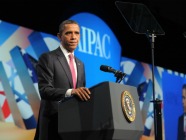 A recent Saturday Night Live episode opened with a sketch that said a
lot about America's views on war with Iran. In the sketch, Andy Samberg,
playing Rick Santorum, tells the audience that the coming presidential
campaign is about two things: "One, making the family once again the
center of our nation's public policy, and two, starting a war with Iran,
as a favor to Israel, whether Israel asks us to or not." Samberg forgot
to add: "and whether or not it's actually good for the U.S., Israel or
the Jews."
A recent Saturday Night Live episode opened with a sketch that said a
lot about America's views on war with Iran. In the sketch, Andy Samberg,
playing Rick Santorum, tells the audience that the coming presidential
campaign is about two things: "One, making the family once again the
center of our nation's public policy, and two, starting a war with Iran,
as a favor to Israel, whether Israel asks us to or not." Samberg forgot
to add: "and whether or not it's actually good for the U.S., Israel or
the Jews."
2. Action on Old Bills & Resolutions
3. Letters
4. AIPAC on the Hill
5. Upcoming Hearings
6. Past Hearings
7. Members on the Record
8. From the Press
 Recently, we asked you to contact your members of Congress to tell them that AIPAC and its supporters don't speak for you when they call for ever-more belligerent U.S. policy on Iran.
Recently, we asked you to contact your members of Congress to tell them that AIPAC and its supporters don't speak for you when they call for ever-more belligerent U.S. policy on Iran.Since we sent you that original action alert, there has been an important development: Rep. Barbara Lee (D-CA) introduced HR 4173, the "Prevent Iran from Acquiring Nuclear Weapons and Stop War through Diplomacy Act." This extremely constructive legislation calls for sustained, robust U.S. diplomatic efforts to resolve the crisis with Iran, including calling for the appointment of a high-level United States representative or special envoy for Iran.
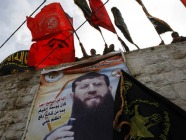 It is a now famous story: A young Arab man, fed up with the injustices
of life under a military regime, decides he's had enough. By
demonstrating his readiness to die to protest these injustices, the man
powerfully asserts his own humanity and that of millions of his
compatriots. His dramatic display of self-sacrifice inspires millions
and his name becomes known across the Middle East and beyond.
It is a now famous story: A young Arab man, fed up with the injustices
of life under a military regime, decides he's had enough. By
demonstrating his readiness to die to protest these injustices, the man
powerfully asserts his own humanity and that of millions of his
compatriots. His dramatic display of self-sacrifice inspires millions
and his name becomes known across the Middle East and beyond. Recently, thousands of activists were on Capitol Hill, brought there by
AIPAC. They told members of Congress and their staff that they speak
for all Americans, and especially American Jews, who care about Israel.
These activists told Congress, in effect, to call for war with Iran.
They also sent a message that achieving Israeli-Palestinian peace
shouldn't be a priority.
Recently, thousands of activists were on Capitol Hill, brought there by
AIPAC. They told members of Congress and their staff that they speak
for all Americans, and especially American Jews, who care about Israel.
These activists told Congress, in effect, to call for war with Iran.
They also sent a message that achieving Israeli-Palestinian peace
shouldn't be a priority.Contact your own members of Congress today to tell them: AIPAC's activists don't speak for me.
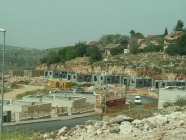 Yesterday the Israeli government sent yet another signal that it when it comes to settlements, rule of law is optional. It also gave another sign that this Israeli government prefers settlements to peace. It did this by approving the biggest West Bank settlement since the Netanyahu government took power - in a settlement and illegal outpost located deep since the West Bank, far east of Israel's separation barrier, in an area that could not possibly remain under Israeli control under any future peace deal. The approvals come in response to Peace Now petitions to the Israeli High Court against illegal construction at these two sites. Rather than implement the law, the Israeli Government responded to the petitions by taking action to post-facto legalize the settlers' illegal construction and now has added insult to injury by approving this additional construction. Peace Now's report on the approval is available here.
Yesterday the Israeli government sent yet another signal that it when it comes to settlements, rule of law is optional. It also gave another sign that this Israeli government prefers settlements to peace. It did this by approving the biggest West Bank settlement since the Netanyahu government took power - in a settlement and illegal outpost located deep since the West Bank, far east of Israel's separation barrier, in an area that could not possibly remain under Israeli control under any future peace deal. The approvals come in response to Peace Now petitions to the Israeli High Court against illegal construction at these two sites. Rather than implement the law, the Israeli Government responded to the petitions by taking action to post-facto legalize the settlers' illegal construction and now has added insult to injury by approving this additional construction. Peace Now's report on the approval is available here.
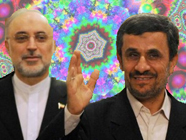 Discussion of military action against Iran is again taking center stage. It takes me back to a late September 2002 meeting, when I brought a former senior Israeli official to see the late Congressman Tom Lantos, then the ranking minority member of the House International Relations Committee. Our meeting focused on Iraq, with Lantos arguing passionately for pre-emptive U.S. military action against Saddam Hussein, who he compared to Hitler.
Discussion of military action against Iran is again taking center stage. It takes me back to a late September 2002 meeting, when I brought a former senior Israeli official to see the late Congressman Tom Lantos, then the ranking minority member of the House International Relations Committee. Our meeting focused on Iraq, with Lantos arguing passionately for pre-emptive U.S. military action against Saddam Hussein, who he compared to Hitler.  Yesterday I wrote that Israel should charge Khader Adnan or set him free. Perhaps recognizing the danger that a martyred Adnan poses to its own interests, Israel has done so, sort of. That is, Israel has not charged Adnan. Nor has it set him free. But it has committed to release Adnan at the end of his "term" in Administrative Detention on April 17th.
Yesterday I wrote that Israel should charge Khader Adnan or set him free. Perhaps recognizing the danger that a martyred Adnan poses to its own interests, Israel has done so, sort of. That is, Israel has not charged Adnan. Nor has it set him free. But it has committed to release Adnan at the end of his "term" in Administrative Detention on April 17th. In response, Adnan has ended his 66-day hunger strike. Hopefully he will survive.
 For weeks now I have been tweeting about the case of Khader Adnan, a Palestinian who is dying in an Israeli hospital as he enters the 10th week of a hunger strike.
For weeks now I have been tweeting about the case of Khader Adnan, a Palestinian who is dying in an Israeli hospital as he enters the 10th week of a hunger strike. =======================
for the week ending
February 17, 2012
=======================
1. Bills, Resolutions
& Letters
2. Egypt in the Spotlight
3. Obama Sends FY13
Foreign Affairs Budget to
Congress
4. Odds & Ends

We are all concerned about the threat of Iran acquiring nuclear weapons. An Iran armed with nuclear weapons represents an alarming scenario that neither the U.S. nor Israel, nor for that matter, the world, can afford to dismiss, and one that the U.S. and the international community must exert all efforts to avoid.
Most of us are also concerned - and increasingly so - over the growing frenzy of talk about military action against Iran. Military action is unlikely to do more than delay Iran's nuclear program and is almost certain to have far-reaching unintended consequences for the U.S., Israel, and the region.
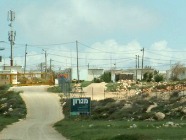
The fate of Migron, an illegal outpost in the heart of the West Bank, is about to be decided. The implications of this decision are about far more than the future of a handful of settlers in a single outpost. This decision will be a litmus test of Israeli rule of law and, ultimately, of Israel's capacity to make peace with the Palestinians.
How can one outpost be so important?
=======================
for the period of
January 31- February 10, 2012
=======================
1. Bills, Resolutions
& Letters
2. Odds & Ends
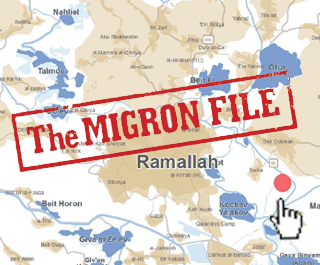 Q: There is a lot of talk in the Israeli media these days about the outpost of Migron, and Peace Now has launched a major campaign around the issue, with the publication of its document "The Migron File."
Q: There is a lot of talk in the Israeli media these days about the outpost of Migron, and Peace Now has launched a major campaign around the issue, with the publication of its document "The Migron File."
=======================
for the period of
January 21-31, 2012
=======================
1. Bills, Resolutions
& Letters
2. Odds & Ends
Apologies
for the belated and abbreviated Round-Up this week (and the
absent Round-Up
this coming Friday) -- both are due mainly to the visit to the
U.S. of Jerusalem
expert Danny Seidemann, who is in the U.S. discussing current
developments/trends in East Jerusalem settlement construction,
and the imminent
threat they pose to the viability of the two-state solution. His visit coincides with
the publication of a
new map presentation laying out these current
developments/trends and
projecting (conservatively) what the map of Jerusalem will
look like at the end
of 2013, assuming these trends continue unchecked. That presentation can be
viewed/downloaded here.
=======================
for the week ending
January 20, 2012
=======================
1. Bills, Resolutions
& Letters
2. Odds & Ends
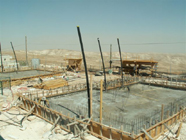 Today, Peace Now released a new report entitled "Torpedoing the Two State Solution -- The Strategy of the Netanyahu Government," detailing a number of trends in settlement expansion that directly, and it seems, deliberately, undermine the viability of the two-state solution.
Today, Peace Now released a new report entitled "Torpedoing the Two State Solution -- The Strategy of the Netanyahu Government," detailing a number of trends in settlement expansion that directly, and it seems, deliberately, undermine the viability of the two-state solution.This is the only possible conclusion. While Netanyahu and his cohorts denounce Jewish extremists and promise to get tough, actions speak louder than words. And their action this week on outposts sent an unmistakable message to the settlers: not only won't you pay a price for terrorism, but you'll be rewarded.
 Anyone who reads the Round-Up knows that Congress gets up to a lot of wacky stuff when it comes to the Middle East. Below is a subjective list of the top ten outstanding examples of this. Enjoy!
Anyone who reads the Round-Up knows that Congress gets up to a lot of wacky stuff when it comes to the Middle East. Below is a subjective list of the top ten outstanding examples of this. Enjoy!1. Bills, Resolutions and Letters
2. Consolidated Appropriations Passes (Israel, Egypt,
Palestinians and more)
3. Iran Sanctions Bills Pass in House
4. Defense Authorization Passes (Israel, Iran and more)
5. Odds and Ends
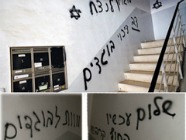
Recent attacks on the IDF have led to an abrupt awakening in Israel and abroad. Suddenly people are realizing the danger posed to Israel by a generation of settlers who respect neither Israeli law, nor Israel's army, nor the Israeli state, and who are prepared to use violence against not only Palestinians (which has long been the case) but also against fellow Jews.
How dare these officials say such things about Israel?
Maybe the answer is this simple: they dare because they care. And because they know that caring about Israel means speaking some hard truths - not to hurt Israel but to save it.
2. Iran, Israel in FY12 Defense Authorization Bill (S. 1867)
3. Odds and Ends
Due to a combination of visitors, travel, and holidays, the Round-Up is once again off schedule (and will not be coming out this Friday). We apologize for any inconvenience this might cause.
(Yedioth Ahronoth, 11/18/11, by Uri Misgav, p. B18 - Translation by Israel News)
Last Tuesday, Hagit Ofran, director of Peace Now's Settlement Watch project, received a surprising visit. Six settlers, members of the small "Eretz Shalom" [Land of Peace] movement, wished to express regret for the events of the day. They were headed by Rabbi Menahem Froman, who despite his severe illness, insisted on holding the visit.
2. Syria Hearing in the Senate Foreign Relations Committee
3. Some additional aid to the Palestinians released by Ros-Lehtinen
4. Odds and Ends
2. HFAC Mark-Up Further Ratchets Up the Pressure on Iran
3. UNESCO, UNESCO, UNESCO
4. Odds and Ends
As everybody who cares about foreign policy (and hasn't been living under a rock) knows by now, earlier this week the PLO was admitted as a full member by UNESCO, triggering pre-existing U.S. laws that mandate an immediate and 100% cut-off in U.S. funding to UNESCO. These laws likewise mandate such a cut-off of funding to the UN, any specialized agency of the UN, or any affiliated organization of the UN who follows suit. With the Palestinians reportedly planning to apply for membership in at least 16 more agencies, the specter of a far-reaching U.S. withdrawal from international agencies - including from agencies like the IAEA and WIPO, looms large.
And with it looms the specter of far-reaching consequences for U.S.
international influence, leverage, and engagement, and for the U.S
ability to protect and promote its interests across the whole spectrum
of issues around the globe.
Absent from the reporting and debate around this issue is any real notice of the fact that the rationale that existed for passage of these laws in 1990 and 1994 no longer exists. Objectively speaking, what we are seeing today is U.S. policy at the UN being hijacked by a pair of legislative anachronisms.
 Vol. 7, Issue 1
Vol. 7, Issue 1Talk about settlement construction and a possible new settlement freeze is again in the news. In this edition of Settlements in Focus, we will highlight a number of post-moratorium trends, analyze the current talk about a new settlement freeze, and suggest what would actually be required to make a freeze sufficiently credible to restart, or continue for more than a brief interlude, Israeli-Palestinian peace negotiations. Please note that the numbers in this document reflect the best information that Peace Now has been able to obtain; additional approvals of construction and planning may have been issued that have not yet come to light.
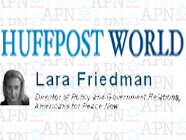 In recent weeks members of Congress have written to UNESCO to let leaders of that organization know that upgrading the status of the PLO will jeopardize U.S. funding to that organization. On 10/5/11, Rep. Granger (R-TX), Chair of the Appropriations Committee's Foreign Operations subcommittee, issued a statement warning UNESCO that upgrading the PLO's status could lead to a cut-off of U.S. funding. Rep. Lowey (D-NY), ranking minority member on the ForOps subcommittee, issued a similar statement on 10/5/11.
In recent weeks members of Congress have written to UNESCO to let leaders of that organization know that upgrading the status of the PLO will jeopardize U.S. funding to that organization. On 10/5/11, Rep. Granger (R-TX), Chair of the Appropriations Committee's Foreign Operations subcommittee, issued a statement warning UNESCO that upgrading the PLO's status could lead to a cut-off of U.S. funding. Rep. Lowey (D-NY), ranking minority member on the ForOps subcommittee, issued a similar statement on 10/5/11.
1. Bills, Resolutions and Letters
2. More on Palestinians at the UN (UNESCO, etc)
3. FY12 ForOps Update
4. Ramping Up Congressional Pressure on Iran
5. Odds and Ends
Note to readers: Due to the High Holidays, there was no Round-Up last Friday, and there will be no Round-Up this coming Friday. This Monday edition covers the period since the last Round-Up (published October 4). The Round-Up will resume regular publication next Friday.
1. Bills, Resolutions and Letters
2. U.S. Law, the PLO at the UN, and UNESCO
3. Members on the issues of the day
4. Odds and Ends
==================
Call for a New Paradigm
by Lara Friedman
In his speech before the United Nations General Assembly in late September, US President Barack Obama, referring to the Israeli-Palestinian conflict, stated: "The question isn't the goal we seek - the question is how to reach it. And I am convinced that there is no shortcut to the end of a conflict that has endured for decades."
 There is an old saying that goes "if you want to know how someone really feels, listen to what they say but more important, watch what they do." In recent days the world has heard the Israeli government insist that it is serious about peace and about returning to negotiations without preconditions, but the Israeli government's actions have belied its words, as has so often been the case in the past.
There is an old saying that goes "if you want to know how someone really feels, listen to what they say but more important, watch what they do." In recent days the world has heard the Israeli government insist that it is serious about peace and about returning to negotiations without preconditions, but the Israeli government's actions have belied its words, as has so often been the case in the past. As the entire world now knows, yesterday an Israeli planning committee approved Plan 13261, Mordot Gilo - South (aka "Gilo Slopes") - a plan for large-scale settlement construction in East Jerusalem, adjacent to the settlement of Gilo (map, courtesy of Daniel Seidemann).
As the entire world now knows, yesterday an Israeli planning committee approved Plan 13261, Mordot Gilo - South (aka "Gilo Slopes") - a plan for large-scale settlement construction in East Jerusalem, adjacent to the settlement of Gilo (map, courtesy of Daniel Seidemann). This development was predictable (and predicted). Which is really the theme here.
 Lara Friedman is Director of Policy and Government Relations at Americans for Peace Now
Lara Friedman is Director of Policy and Government Relations at Americans for Peace Now
Israeli diplomats, AIPAC, and other groups on the American Jewish and Christian right are learning a tough lesson today: Be careful what you tell Congress to do on Israel, because it might come back to bite you.
2. HFAC Hearing on Aid to Palestinians - Content & APN Analysis
3. Republican Wins Weiner's Seat (Israel angle)
4. APN Statement on Looming Crisis at the UN and the Israeli-Palestinian Conflict
5. Kerry Defends Foreign Aid
6. Odds & Ends
2. UN Reform Bill: Trying to Make US-UN Relations 100% Conditional on Palestinian Issue
3. Senator Leahy and the IDF
4. Ellison leads call for Hamas to release Gilad Shalit
5. 1/5 of Congress Visits Israel with AIPAC-affiliated AIEF Over Recess
6. Odds & Ends
"While no American government has ever recognized Israeli sovereignty over any part of the ancient capital, it is equally true never before had an American president made an issue of the building of homes in the existing Jewish neighborhoods begun in the immediate aftermath of the reunification of the city in 1967. Though settlement building in the West Bank has been a constant source of tension, and projects such as the one at Har Homa outside these Jewish sections of the city (although it was on vacant, Jewish-owned land) were disputed by Washington, housing in places like Ramat Sharon had never been a bone of contention."(emphasis added)
You'd think before anyone would make such a categorical assertion in print (or even online), he'd first bother to check the facts. Because the facts are easy to check.
2. Senate Version of the State Department Authorization Bill
3. Confirmation hearing for US Ambassadors to Syria and Turkey
4. Odds and Ends
Now longtime Israeli politician Haim Ramon is saying pretty much the same thing in an August 4th interview published in Maariv:
 Back on July 19th APN joined Peace Now (Israel) in calling for a boycott of settlement products. We did so in response to the flagrantly anti-democratic anti-boycott law passed recently by the Knesset - the clear goal of which is to stifle protest against settlements and the Israeli government's continued support of settlements and settlement expansion.
Back on July 19th APN joined Peace Now (Israel) in calling for a boycott of settlement products. We did so in response to the flagrantly anti-democratic anti-boycott law passed recently by the Knesset - the clear goal of which is to stifle protest against settlements and the Israeli government's continued support of settlements and settlement expansion. Since then I've received a deluge of responses from people applauding this move by APN and Peace Now, and expressing their own intent to boycott settlement products. Many said they actually have been boycotting settlement products for years (as I have done) but now will do so even more proudly, knowing that the act represents not only a statement of protest against settlements, but defiant support for the democratic values that American Jews believe must remain a central part of Israel's character.
Now anyone who shares these sentiments with APN (and has a twitter and/or facebook account) can show their solidarity by adding the "I Boycott Settlement Products" button (a "twibbon" for those familiar with this sort of thing) to their profile photos. You can get this new APN twibbon here.
 Thousands of Israelis are in the streets protesting high housing costs. It is an amazing, indeed, stunning development. Israelis from all walks of life are fed up with Israel's wealth gap as it continues to widen.
Thousands of Israelis are in the streets protesting high housing costs. It is an amazing, indeed, stunning development. Israelis from all walks of life are fed up with Israel's wealth gap as it continues to widen.These protests are not about Netanyahu's policies regarding the Palestinians or the settlements. But let no one be confused: these protests shine a bright spotlight on policies of the Netanyahu government regarding settlements.
2. FY12 State and Foreign Operations Appropriations (House Markup) - the fun continues
3. State Department Authorization Bill (House) - more on the markup
4. State Department Authorization Bill (Senate) - details to follow
5. HFAC/MESA Subcommittee Hold Hearing on Syria and Iran
6 Odds and Ends
1. Bills, Resolutions and Letters
 Earlier this month, APN's Board of Directors adopted principles to guide our approach on the issue of the Palestinians and efforts for international and UN recognition. These principles underlie my recent op-ed on the topic published on ForeignPolicy.com, and will be the basis of forthcoming APN statements and commentary on the topic.
Earlier this month, APN's Board of Directors adopted principles to guide our approach on the issue of the Palestinians and efforts for international and UN recognition. These principles underlie my recent op-ed on the topic published on ForeignPolicy.com, and will be the basis of forthcoming APN statements and commentary on the topic.Tuesday, July 19, 2011
The Palestinian leadership seems determined to bring its case for statehood to the U.N. in September. The details remain unknown, but that hasn't stopped pundits and groups from staking out hard-line positions opposing the effort.
2. State Department Authorization Bill - the text (HR 2583)
3. State Department Authorization Bill - the markup and amendments
4. APN Calls for Boycott of Settlements, Settlement Products
5. APN Calls on Jewish Community to Oppose Anti-Democratic Trend in Israel
6. Shameless plug for my new op-ed on Palestinians at the UN
7. CUFI on the Hill
8. From the Archives: Bouyed by Congress, Israel Won't Alter Negotiating Points (NYT, 1975)
9. Odds and Ends
2. State Department Authorization Bill - House (more details)
3. Hearing on Palestinian Aid 7/12/11: A Re-Cap
4. Tom Lantos Human Rights Commission - Hearing on Human Rights in Syria
5. House Broke Its Own Rules to Pass Palestinian-bashing Resolution
6. APN op-ed: Comparing Israel's New Boycott Law to US Legislation - Like Comparing Apples and Orangutans
7. Odds and Ends
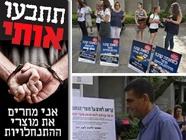
Last week the House voted to suspend the rules and pass H. Res. 268, a resolution strongly backed by AIPAC and others right-of-center Jewish organizations (and strongly opposed by APN). H. Res. 268 slams the Palestinians for seeking international recognition, for taking their case to the UN, and for seeking national reconciliation - and threatens them with punishment if they don't desist. I reported in my Round-Up last week that this vote was unusual, given that since taking control of the House in midterm elections, House Republican leaders have "virtually ended the longstanding practice of bringing non-binding, symbolic resolutions to the floor under suspension of the rules" (in contrast to past Congresses where the practice was rampant). The Washington Post even reported on this change.
When I wrote about this in the Round-Up I didn't know for certain exactly how many non-binding resolutions had been brought to the floor on the suspension calendar in the 112th Congress, so I couldn't say exactly how unusual last week's vote on H. Res. 268 was.
Now, I can say (because now I know)*. It was not just unusual - it was an entirely unique exception.
APN Legislative Round-Up
for the week ending
July 1, 2011
=======================
1. Bills, Resolutions & Letters
2. Cardin & Collins Grandstand at the Expense of Peace (on S. Res. 185)
3. APN on the Flotilla
4. Members of Congress Urge Admin to Ensure Safety of Amcits on the Flotilla
5. Coats (R-IN) pitches for military action against Iran (kinda)
6. Odds & Ends
NOTE: H. Res. 268 - the House companion to S. Res. 185 - is on the House suspension calendar for July 6, 2011.
 On May 31, 2010, Israel confronted an international flotilla seeking to challenge its blockade of Gaza, with tragic results. At that time American for Peace Now (APN) called on Israel to investigate the operation that led to these results and to reassess its Gaza policy. APN noted that the difficult situation presented to Israel by the flotilla underscored the extent to which the continued policy of blockading Gaza was untenable and increasingly indefensible.
On May 31, 2010, Israel confronted an international flotilla seeking to challenge its blockade of Gaza, with tragic results. At that time American for Peace Now (APN) called on Israel to investigate the operation that led to these results and to reassess its Gaza policy. APN noted that the difficult situation presented to Israel by the flotilla underscored the extent to which the continued policy of blockading Gaza was untenable and increasingly indefensible.
Now Israel is facing another flotilla, and it appears that another potential debacle is in the making.
2. Members Weigh in on 1967 lines, Gilad Shalit, the Flotilla, Syria & Egypt
3. HFAC Hearing on Iran and Syria
4. Upcoming HFAC Hearing on aid to the Palestinians
5. Wanting Something for Nothing: The Real Reason Behind the Outrage Over Obama's Reference to 1967 (Shameless plug for my latest oped)
6. Odds & Ends
The other cosponsoring groups were the Foundation for Middle East Peace, Churches for Middle East Peace, and the Middle East Institute. The video for the event is here:
 (My new piece posted on the Huffington Post)
(My new piece posted on the Huffington Post)The outrage over Obama's reference to 1967 lines in the May 19th speech isn't truly about "defensible" borders. It's about greed.
Purveyors of right-wing hasbara know Obama didn't demand that Israel return to the 1967 lines or try to impose any border.
2. More Grandstanding on Israel, Borders, and Obama
3. Former Congressman Robert Wexler (D-FL) Defends Obama on Israel
4. New Latino-Jewish Caucus Launched in the House
5. AIPAC Event for Hill Staff on Palestinian UN Effort
6. Odds and Ends
Yes, Hamas is a terrorist organization, but simply asserting that fact is not a policy.
[Disclaimers: (1) The annotations in this piece are not derived from any direct access to the Prime Minister's inner thoughts, bur reflect realistic assessments of the Prime Minister's intent; (2) This is satire, but satire is of course funny because it is true.]
Vice President Biden, Speaker Boehner, distinguished senators, members of the House, honored guests, I'm deeply moved by this warm welcome, and I'm deeply honored that you've given me the opportunity to address Congress a second time. Mr. Vice President, do you remember the time that we were the new kids in town? (Laughter, applause.) And I do see a lot of old friends here, and I see a lot of new friends of Israel here as well -- Democrats and Republicans alike. (Applause.)
Israel has no better friend than America, and America has no better friend than Israel [and don't you let Obama forget it]. (Applause.) We stand together to defend democracy [except when, like with Egypt, we have mixed feelings about it]. We stand together to advance peace [except when your president asks me to do things I don't want to do]. We stand together to fight terrorism [and anyone who suggests that the Israeli-Palestinian conflict in any way provides a rallying cry for extremism, well, they are anti-Semites trying to delegitimize of Israel].
'Tis the season. The season when members of Congress are lobbied hard to support positions presented to them as the epitome of "pro-Israel" - but that in fact are anything but.
The coming days are a final chance to stop or, at the very least to slow down, Israel's political setback. From the day that Arafat died and the Palestinian Authority desisted from terrorism, its standing in the world has only strengthened. The demand for independence, for a demilitarized state within the 1967 borders (with agreed border revisions) with East Jerusalem as its capital, is accepted by nearly all the countries of the world, and it will almost certainly win sweeping recognition by the UN General Assembly in September.
 "...history will show that the most pro-Israel U.S. president was not the one who provided the most weapons to Israel and vetoed the most UN Security Council resolutions, but the one who brought peace, and with it, real security, to Israel, and independence to the Palestinian people."
"...history will show that the most pro-Israel U.S. president was not the one who provided the most weapons to Israel and vetoed the most UN Security Council resolutions, but the one who brought peace, and with it, real security, to Israel, and independence to the Palestinian people."
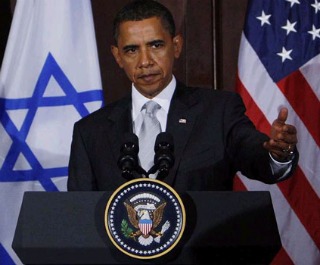 This week President Obama will talk a lot about the Middle East. Not only will he deliver a major foreign policy address aimed at the Arab and Muslim worlds, but he will also offer remarks after meetings with King Abdullah of Jordan and Israeli Prime Minister Benjamin Netanyahu, and make a speech at AIPAC.
This week President Obama will talk a lot about the Middle East. Not only will he deliver a major foreign policy address aimed at the Arab and Muslim worlds, but he will also offer remarks after meetings with King Abdullah of Jordan and Israeli Prime Minister Benjamin Netanyahu, and make a speech at AIPAC.
People around the world -- and particularly in the Middle East -- will be listening closely and critically.
 The events that took place in connection with yesterday's "Nakba Day" demonstrations - in Gaza, the West Bank and East Jerusalem, and on Israel's borders with Syria and Lebanon - should be a wake-up call to all those who foolishly believe that Israel can indefinitely continue the occupation. They should be a wake-up call to those who believe that Israel can continue to live as a "villa in the jungle" - an expression first coined by Defense Minister Ehud Barak - immune to the regional forces that sparked and are fueling the Arab Spring.
The events that took place in connection with yesterday's "Nakba Day" demonstrations - in Gaza, the West Bank and East Jerusalem, and on Israel's borders with Syria and Lebanon - should be a wake-up call to all those who foolishly believe that Israel can indefinitely continue the occupation. They should be a wake-up call to those who believe that Israel can continue to live as a "villa in the jungle" - an expression first coined by Defense Minister Ehud Barak - immune to the regional forces that sparked and are fueling the Arab Spring.APN Legislative Round-Up
for the week ending
May 13, 2011
=======================
1. Bills & Resolutions
2. Cantor/Hoyer Resolution Blasting the Palestinians (just in time for AIPAC conference)
3. Kirk on Egypt
4. Berkley-Engel Letter Opposing Palestinian Unity
5. APN Warns President Obama: Don't Leave Mideast Peace Out of Your Mideast Speech
6. As Sen. Mitchell Resigns, APN Urges Obama to Personally Lead Mideast Peace Efforts
7. Odds & Ends
APN Legislative Round-Up
for the week ending
May 6, 2011
=======================
1. Bills & Resolutions
2. Quick Review: Current Law on Aid to Palestinian Power-Sharing Govt
3. Congressional Reaction to Hamas-Fatah Agreement
4. Menendez-led Senate (Democrats) letter on Fatah-Hamas deal
5. Granger/Lowey Letter to Abbas on UN Action on Palestinian State & on Unity Govt
6. APN on Palestinian Unity
7. AIPAC on Palestinian Unity
8. Ros-Lehtinen-Engel Letter on Syria
9. Israel-Cole Turkey/Flotilla Letter
10. Berkley-Led House letter on Goldstone (to Ban Ki-moon)
11. Hill Briefing by Jewish Groups: "Palestinian efforts to declare unilateral independence - and what Congress can do to avert it"
12. Get Ready: AIPAC Policy Conference, May 22-24
13. Odds & Ends
Note: On 5/4/11 the Senate Foreign Relations Committee met to consider the nomination of Dan Shapiro as the next U.S. Ambassador to Israel. Dan's prepared testimony is available here. The committee has not yet voted on the issue.
Also, Prime Minister Benjamin Netanyahu is scheduled to meet with President Obama May 20. (King Abdullah of Jordan is also expected in Washington that week). Netanyahu will also give a speech during the AIPAC policy conference, and is expected to address a joint meeting (not a joint session) of Congress, at the invitation of House Speaker Boehner (R-OH) on May 24.
Oops, We've Been Dragged Again
Look at these Palestinians: they don't miss an opportunity to miss an opportunity to coordinate their steps with Binyamin Netanyahu and Shimon Peres. It's important to them to reach the finish line of recognition of the Palestinian state united, at least outwardly. Go understand them.
It should at least be said to their credit that they had someone to learn from. Binyamin Zeev Herzl, David Ben-Gurion and Chaim Weizmann, to name a few examples. In that sense, to use a common historic phrase, Abu Mazen and Salam Fayyad are "standing on the shoulders of giants."
 Washington, DC -- APN today welcomed news of a Fatah-Hamas deal. To the degree that the agreement provides for elections and a joint government, this is an opportunity that the Obama administration should not squander. Commenting on today's development, APN President and CEO Debra DeLee stated:
Washington, DC -- APN today welcomed news of a Fatah-Hamas deal. To the degree that the agreement provides for elections and a joint government, this is an opportunity that the Obama administration should not squander. Commenting on today's development, APN President and CEO Debra DeLee stated:"Today's announcement of a Fatah-Hamas deal to jointly form a government and to hold new elections is good news, and we hope that the agreement is implemented. While we still don't know all the details of the agreement, we know that a Palestinian government representing all Palestinians, with security and governance capacity in both the West Bank and Gaza, is vital to the achievement of a peace agreement.
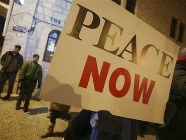 Today, a group of leading Israel cultural figures, among them winners of the prestigious Israel Prize, gathered in Tel Aviv to announce their welcome of an independent Palestinian state next to Israel, with its borders based on the 1967 borders.
Today, a group of leading Israel cultural figures, among them winners of the prestigious Israel Prize, gathered in Tel Aviv to announce their welcome of an independent Palestinian state next to Israel, with its borders based on the 1967 borders.
APN Legislative Round-Up
for the week ending
April 15, 2011
=======================
1. Bills & Resolutions
2. Congress passes FY11 Funding Bill, including Middle East Funds
3. Two Hearings on the Middle East
4. Ackerman Statement at Shifting Sands hearing
5. NORPAC on the Hill
6. Rep. Reed (R-NY) on Terror Against Israel: AIPAC Talking Points Not Strong Enough
7. Lieberman Calls for Regime Change in Syria
8. Odds & Ends
[Apologies for the late Round-Up - I was in Turkey last week. In my absence APN released a major policy statement, recommending an Action Plan to President Obama to get peace efforts back on track. The full text is available here.]
APN Legislative Round-Up
for the week ending
April 8, 2011
=======================
1. Bills & Resolutions
2. Grandstanding on Goldstone
3. Israeli Right-Wingers Welcomed in House Foreign Affairs Committee
4. HFAC Hearing on the UN (with significant focus on Israel)
5. Op-Ed in The Hill by Israeli Civil Society/Human Rights Activists
6. Upcoming Mideast Hearing
7. APN Welcomes Introduction of Israeli Peace Initiative
8. Blog Post: Gifts for the Obama-Peres Meeting: Settlement Approvals in West Bank & East Jerusalem
9. Odds & Ends
 The Netanyahu government has marked the occasion of President Shimon Peres's visit to Washington with some very unwelcome "gifts" to the Obama Administration: on Sunday, the government of Israel let the Jerusalem Municipal Planning Committee approve a plan for massive settlement expansion in the southern part of East Jerusalem
The Netanyahu government has marked the occasion of President Shimon Peres's visit to Washington with some very unwelcome "gifts" to the Obama Administration: on Sunday, the government of Israel let the Jerusalem Municipal Planning Committee approve a plan for massive settlement expansion in the southern part of East Jerusalem APN Legislative Round-Up
for the week ending
April 1, 2011
=======================
1. Bills & Resolutions
2. APN to Rep. Weiner: Peace Now can show you the occupation in the West Bank
3. Sarah Palin & Settlements: A Teachable Moment?
4. Upcoming Hearings
5. Odds & Ends
The article, which has not been picked up by the English-language press, notes that "One expression of the new phenomenon was seen last Wednesday, after the terror attack in Jerusalem: Several skinheads attacked Arab passers-by near the site of the attack outside the Jerusalem International Convention Center, including one Arab woman from East Jerusalem."
Full article (translation by Israel News Today), after the break.

...there is nothing common-sense about Palin's comments during her recent visit to Israel, where she reportedly
criticized President Obama for objecting to Israeli settlement expansion, suggesting that settlement construction is simply a local Israeli "zoning issue."
Yes, incitement is a serious issue and it is right for Congress to be concerned. Palestinian endorsement of violence and hate speech continue to be a problem. APN has consistently called on - and continues to call on - the PA to address this very troubling issue.
However, both letters are flawed, focusing solely on this one aspect of a problem that has many facets:
APN Legislative Round-Up
for the week ending
March 18, 2011
=======================
1. Bills & Resolutions
2. House & Senate Letters Condemn Palestinian Incitement (and ONLY Palestinian Incitement)
3. Blatantly Partisan RSC Effort to Exploit Murder in Settlement
4. Ackerman on Egyptian Gas Shipments to Israel
5. Members of Congress "Interpret" the Itamar Murders
6. Senator Kerry on the Middle East (at the Carnegie Endowment for International Peace)
6. Odds & Ends
APN Legislative Round-Up
for the week ending
March 11, 2011
=======================
1. Bills & Resolutions
2. House Doubles Down on Jerusalem (undivided capital, embassy, settlements, etc)
3. HFAC/MESA Middle East Hearing - Statements and Ackerman's Plea for Egypt
4. President Obama Nominates Dan Shapiro to be U.S. Ambassador to Israel
5. APN Defends UNRWA Funding
6. Secretary Clinton Back on the Hill
7. Odds & Ends
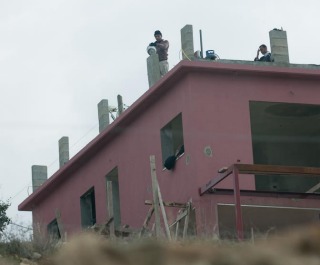 Today the Israeli press was full of headlines reporting that the government of Israel has declared that it will remove all West Bank outposts on private Palestinian land by the end of the year. This sounds like great news, until you read a bit further, and notice that the second part of this new policy is that the government plans to legalize ALL other outposts in the West Bank. Peace Now's Hagit Ofran and I prepared the following analysis of the new policy:
Today the Israeli press was full of headlines reporting that the government of Israel has declared that it will remove all West Bank outposts on private Palestinian land by the end of the year. This sounds like great news, until you read a bit further, and notice that the second part of this new policy is that the government plans to legalize ALL other outposts in the West Bank. Peace Now's Hagit Ofran and I prepared the following analysis of the new policy:APN Legislative Round-Up
for the week ending
March 4, 2011
=======================
1. Bills & Resolutions
2. Secretary Clinton on the Hill
3. Ros-Lehtinen Keeps Her Sights on the UN (and UNRWA)
4. CENTCOM Commander Articulates "Linkage" at SASC Hearing
5. HFAC/MESA Subcommittee Hearing 3/10/11 on the Middle East
6. Pro-Peace Funding Letter Circulating in House
7. Weiner Picks a Fight with the State Department Over Jerusalem
8. Gohmert - At It Again (another incomprehensible rant)
9. Odds & Ends
Specifically, General Mattis testified (emphasis added):
 By Hagit Ofran and Lara Friedman
By Hagit Ofran and Lara Friedman APN Legislative Round-Up
for the week ending
February 18, 2011
=======================
1. Bills & Resolutions
2. Approps - Full-Year Continuing Resolution
3. Egypt Letter (House)
4. Congress, Israel, and the UN Security Council Resolution on Settlements
5. APN on Settlements-Related UNSCR
6. Senators Tell Clinton: Work to Get Iran Monitor in UN Human Rights Council
7. New APN Op-Ed: Israel must get the monkey of occupation off its back
8. Odds & Ends
Here is a table I pulled together (and yes, it took a long time - I care that much about the facts!) of all Israel-related UN Security Council resolutions from 1967 to the present (for viewing or downloading). Enjoy.
(APN believes the President should not veto the pending resolution, should it come to a vote. Our position is available here. Our action alert on the issue is available here).
February 15, 2011
Israel must get the monkey of occupation off its back
By Lara Friedman
Although the events that swept through Egypt in recent weeks had little to do with Israel, they still hold profound lessons for Israel. The most important lesson is that Israel must break its addiction to occupation and settlements.
Exploding Three Middle East Straw Men
published 2/14/11
The straw man is a familiar figure in Middle East punditry -- to win the argument, just misrepresent the views of the other side. The recent Huffington Post piece by American Jewish Committee President David Harris is an example par excellence of this tactic.
APN Legislative Round-Up
for the week ending
February 11, 2011
=======================
1. Bills & Resolutions
2. Egypt in Congress
3. Senate Letter on Egypt to Clinton
4. Members of Congress - Reactions to Mubarak Resignation
5. Senator Rand Paul (R-KY) Defends Call to Cut Aid to Israel
6. Rep. Poe (R-TX) calls for cutting all Foreign Aid except Israel
7. Rep. Rothman (D-NJ) Defends Foreign Aid
8. JTA & LA Times on Congress and Egypt Aid
[Note: On 2/4/11 the Congressional Research Service released a new report entitled Egypt: Background and U.S. Relations]
"The collapse of the Mubarak regime cannot be attributed, obviously, to the failure of the Israeli-Palestinian peace process. Egypt has exploded for Egyptian reasons. The valiant people in Tahrir Square did not include Palestinian statehood among their demands. Their grievances were domestic, as Mubarak's outrages have been domestic. Yet the Egyptian repudiation of Mubarak will have consequences for the Israeli-Palestinian peace process, and so the analysis of Israel's new situation cannot be addressed solely in terms of vulnerability and vigilance.
"Here is where concern about Israel must be added to concern for Israel. For the Netanyahu-Barak government has displayed gross historical irresponsibility in recent years. It has, in its relations with the Palestinians, desired only stasis and the status quo.
APN Legislative Round-Up
for the week ending
February 4, 2011
=======================
1. Bills & Resolutions
2. Congress starts weighing in on Egypt - Senate Resolution 44
3. Key Members of Congress Weigh In On Egypt
4. Odds & Ends
5. APN on Egypt Situation
Note: The House was in recess this week, while the Senate was in session.
 WASHINGTON (JTA) -- There is the old joke that "denial is not just a river in Egypt." And indeed it is true.
WASHINGTON (JTA) -- There is the old joke that "denial is not just a river in Egypt." And indeed it is true.The Nile is the longest river in the world, along whose shores the Egyptian people continue their unprecedented protests, demanding an end to the Mubarak era. But denial also is the increasingly discordant notes sounded by some elements in the American Jewish community and in Israel seeking to attack and discredit the protests and lobby for a return to the pre-Jan. 25 status quo in Egypt.
1. Bills & Resolutions
2. House Letter Asks Obama to Promise UNSC Vetoes
3. Sen. Rand Paul (R-KY) Calls for Ending Aid to Israel
4. Odds & Ends
For those who are looking for a political primer and some educated insights into what is happening, why it is happening, and what is likely to come next, I recommend this Q&A interview with Professor Stephen Zunes, professor of politics and chair of Middle Eastern Studies at the University of San Francisco, posted on MSNBC.
Concerns about Israel mean getting on the right side of history
By Lara Friedman
Today Egypt is undergoing historic, organic change led by the people of Egypt. The Egyptian people - not led by any single party or individual - are demonstrating through their actions that the longstanding political status quo in Egypt cannot continue. It is still unknown how these protests will end and what Egypt's government will look like in both the short-term and longer-term. What is clear, however, is that the will of the Egyptian people will not be denied, either by the Mubarak government or the international community.
For those who view the Middle East primarily through the prism of Israel and the Israeli-Arab conflict, the developments in Egypt provoke understandably complicated feelings.
Alan Solow, Chairman
Malcolm Hoenlein, Executive Vice President
Conference of Presidents of Major American Jewish Organizations
533 Third Avenue, 21st Floor
New York, NY 10017
January 7, 2011
Dear Alan and Malcolm,
This has been a terrible week for Israeli democracy. The Israeli Knesset voted to investigate funding of "left-wing" groups, in what can only be described as a politically-motivated witch hunt. An Israeli Knesset member, Michael Ben-Ari, was subsequently caught on tape inciting against Peace Now and other progressive groups, going so far as to call them "germs," calling their supporters "the greatest Israel haters," and threatening to pass a law "to eradicate this dangerous enemy." And in an almost Orwellian twist, it was revealed that the Israel Airports Authority is blocking Peace Now's website - and those of other organizations deemed to be "dangerous" - at Ben Gurion Airport.
On behalf of the tens of thousands of people who support APN and who, through us, support Israel's Peace Now movement, we are outraged and sickened by these attacks. Peace Now, as well as other organizations Ben-Ari and those like him are attacking, are an essential component of Israeli democracy. American supporters of APN and Peace Now are among Israel's truest friends.
"Knesset Speaker Ruby Rivlin - a member of the Likud party who is known to be seeking the Presidency - came out against the inquiry committee. 'The body responsible for investigating the organizations that collect information on IDF soldiers [for use by Israel's enemies] is the police and law enforcement agencies,' Rivlin said, 'not the Knesset... This will be nothing more than a show trial, since it is known in advance what the majority wants.'
Writing today in Yedioth Ahronoth, Nahum Barnea reports:
"Knesset Speaker Reuven Rivlin loves the Land of Israel. He loves it in its entirety, with all its territories, with all of its population. He does not need to bring proof of his right wing record. On Wednesday, when the Knesset passed by a large majority another divisive, demagogic and ugly motion, he said to me that the Knesset he headed was dangerous. 'The danger posed by those who are trying to enforce their opinion is greater than the danger posed by those who want to give up the Land of Israel,' he said..." [translation by Israel News Today]
"...We need a commission of inquiry to reevaluate the subversive political activity of David Ben-Gurion and Natan Alterman. Alterman wrote a poem during the War of Independence, the toughest war in Israel's history, in which he accused the IDF soldiers of committing war crimes, and proposed executions of offenders ("For this"). Ben-Gurion, as a traitorous defense minister, instructed that this poem be sent to all IDF soldiers, thereby damaging Israel's reputation and undermining their confidence in its morality. They served Israel's enemies knowingly in time of war. The commission of inquiry can discuss the matter and recommend, let's say, that the writings of the traitors be burned and the name of Ben-Gurion Boulevard be changed to Kirschenbaum Boulevard [LF: for Faina Kirschenbaum, the member of Knesset from the Yisrael Beiteinu party - and settler - who introduced legislation to establish a commission of inquiry into "left-wing" groups]...."
Translation by Israel News Today. Links added by me.
Following is the full translated article:
In response to criticism over yesterday's Knesset decision to investigate "left-wing" groups in Israel, Israeli Deputy Foreign Minister Danny Ayalon - often the leading edge of Israeli hasbara efforts to the English-speaking world - wrote/tweeted the question "who's afraid of transparency?" Coincidentally - or not - one of the Israeli Right's most loyal voices in the U.S. had tweeted hours earlier, "When a simple transparency bill is being denounced as McCarthyism, you know the NGOs have something to hide."
This hasbara effort is so ham-handed it almost defies belief. It comes on the heels of last weekend's stunningly inept (and wholly ineffective and ultimately counterproductive) hasbara effort trying to convince the world that, even without any investigation, Israel had determined that it bears not even the tiniest responsibility for the death of Jawaher Abu Rahmah of Bili'in. Now, days later, Israeli officialdom - which eagerly threw out all sorts of ugly rumors that demonstrated nothing more than a total disregard for the dead and her loved ones - has had to back off its accusations and innuendo.
Given this very recent failure, you might think that the "Israel-right-or-wrong" folks (in Israel and the U.S.) would have considered their strategy carefully before jumping to the defense of this latest Knesset action. But apparently they didn't.
 Congresswoman Gwen Moore delivered a brilliant statement on Wednesday laying out the problems with H. Res. 1765 - Rep. Berman's (D-CA) resolution opposing Palestinian efforts to achieve recognition of a Palestinian state. We commend her and highly recommend her statement as an example of what a truly pro-Israel, pro-peace position sounds like.
Congresswoman Gwen Moore delivered a brilliant statement on Wednesday laying out the problems with H. Res. 1765 - Rep. Berman's (D-CA) resolution opposing Palestinian efforts to achieve recognition of a Palestinian state. We commend her and highly recommend her statement as an example of what a truly pro-Israel, pro-peace position sounds like.2. House Resolution on Palestinian Unilateral Statehood Efforts (H. Res. 1765)
3. Senate Takes on House over FY11 Approps (including ForOps). Then Gives Up.
4. Special for Ros-Lehtinen: Review of Conditions/Restrictions/Oversight on Palestinian Aid
5. APN on H. Res. 1765
6. Selected Congressional Statements on H. Res. 1765
7. Palestinian response to H. Res. 1765
Dear [staffer name],
Later today (or sometime tomorrow) the House will vote on a resolution, introduced by House Committee on Foreign Affairs Chairman Howard Berman (D-CA) and brought to the floor under suspension of the rules, opposing Palestinian efforts to promote unilateral recognition of a Palestinian state.
The Berman resolution includes elements with which Americans for Peace Now agrees - like support for negotiations, support for a two-state solution, and opposition to Palestinian unilateral actions that contradict peace efforts. However, it omits one element so important that its absence renders the resolution problematic: it omits any mention of Israel's obligation to refrain from unilateral actions that contradict peace efforts - like the ongoing settlement activity in the West Bank and East Jerusalem. (The resolution does quote Secretary of State Clinton's rejection of "unilateral steps by either party" in its preambular section, but it says nothing about this in the resolved clauses.)
If the goal of the Berman resolution is truly to oppose unilateral actions, support negotiations, and promote a peace agreement that delivers a two-state solution, it unfortunately falls short of the mark. By singling out only Palestinian actions, it risks sending the message that Congress does not object to unilateral Israeli acts, no matter how corrosive they may be to peace efforts.
 By Lara Friedman
By Lara Friedman The Obama administration has offered Israel a substantial package of incentives in exchange (it hopes) for the re-imposition of a (partial) settlement moratorium for 90 days that will (it hopes) permit the re-starting of direct Israeli-Palestinian negotiations that, in turn (it hopes), will produce sufficient progress to allow negotiations to continue even after a moratorium lapses. (continues)
The Obama administration has offered Israel a substantial package of incentives in exchange (it hopes) for the re-imposition of a (partial) settlement moratorium for 90 days that will (it hopes) permit the re-starting of direct Israeli-Palestinian negotiations that, in turn (it hopes), will produce sufficient progress to allow negotiations to continue even after a moratorium lapses.
As everyone knows, there is enormous skepticism and concern about this strategy coming from across the political spectrum (here, here, here, http://www.thenational.ae/the-national-conversation/comment/obama-sets-the-oslo-clock-ticking-with-his-latest-offer?pageCount=0 (link has expired), here, here, and here). There is also growing discussion of what "Plan B" should be if/when this gambit fails (here, here, and here). And there are fears that the groundwork is being laid in some quarters to put the responsibility for the anticipated failure of this effort entirely on the Palestinians (see this tweet from AIPAC).
All are eminently rational reactions. The pitfalls of this current plan are myriad. And the Obama administration's Middle East peace record thus far -- two years of well-intentioned but ineffectual cajoling of the parties with no result -- does not inspire confidence. But if that is all we have to say, then those of us who are committed to peace and security for Israel are falling down on the job.
Throwing Another East Jerusalem Wrench into the Works: Final Approval of Plan for Mughrabi Gate Ramp
Peace Now's brilliant Hagit Ofran breaks the news today that on 10/31/10 the government of Israel took the final step in approving the extremely controversial plan for the new Mughrabi Gate ramp (Town Planning Scheme 12472). That step consisted of the publication of the plan in Haaretz (Hebrew print edition - a pdf view of the publication posted by Hagit can be seen/downloaded here.)
In the absence of further legal action (the prospects of which are slim to none, as are the chances of a temporary injunction) this step constitutes final approval. This means that a building permit can be issued, and construction can thereafter commence, as early as 15 days from this publication.
On Thursday of last week new tenders were for the construction of an additional 238 residential units in Pisgat Zeev and Ramot.
Three recent news items illuminate how the battle for East Jerusalem is heating up.
******
Friend,
Today we are all still digesting the results of yesterday's mid-term elections. Elections that for most of us, as individual voters, were not only, or even primarily, about Israel, but about a range of domestic issues dear to our hearts. Many of us are dismayed at what these elections may mean for these issues and for the future of our families and our country.
But even as we try to come to terms with what will be the likely impact of these elections, we can't take our eyes off the ball in the Middle East.
They also celebrated, triumphantly, their belief in the growing popularity and influence of Kahane's world-view in Israel. Commenting on the event, longtime Kahane supporter and former Kach spokesman Baruch Marzel (born in the US) said: "You can see a true awakening to Rav Kahane, because every year it's growing, every year more and more people are joining us."
At a time when Israel's democracy is being challenged by a http://www.acri.org.il/eng/story.aspx?id=756 (link has expired) stream of undemocratic legislative initiatives - from efforts to require loyalty oaths, to efforts to undermine progressive non-governmental organizations, to efforts to legalize discrimination in housing - the Kahanists' celebrations should give anyone who cares about Israel's democracy reason to worry.
 If peace talks between Israelis and the Palestinians break down completely, the sticking point is likely to be expanded Israeli settlements in the West Bank. Indeed, settlements have for the past two years been the focus of attention from U.S. negotiators. That's a contrast to past peace efforts, when the dominant issues were Palestinian violence and terrorism or Israeli security.
If peace talks between Israelis and the Palestinians break down completely, the sticking point is likely to be expanded Israeli settlements in the West Bank. Indeed, settlements have for the past two years been the focus of attention from U.S. negotiators. That's a contrast to past peace efforts, when the dominant issues were Palestinian violence and terrorism or Israeli security.
Yedioth Ahronoth 10/12/10 (p. 3)
by Shimon Shiffer
(Translation by Israel News Today)
I have a question for President Shimon Peres, who attended the opening meeting of the Knesset's winter session and listened to Netanyahu's speech with closed eyes: Mr. Peres, when you signed the declaration of principles with Abu Mazen on the White House lawn in the autumn of 1993, why didn't you demand of him, your partner to the secret negotiations in Oslo, to recognize Israel as the state of the Jewish people?
I am proud and honored to have joined with more than 2000 other people this past weekend (Oct 8-10) to walk 60 miles in the Susan G. Komen walk to raise funds to find a cure for breast cancer (and yes, I walked every inch of it - and have the blisters to prove it!).
I am grateful that my colleagues at APN supported me in my effort and that APN generously let me take off October 8th to participate. It was an incredible, empowering experience that I will treasure and, when my feet heal, I look forward to doing again.
2. House Letter on Jonathan Pollard
3. Another Incoherent Rant from Rep. Gohmert
Note: The House is now in recess until November 15th.
Now just to be clear, I have no idea how Sestak's record looks to AIPAC, and I don't really care. But during a week when there has been a lot of discussion over what it means to tell the truth in the Israel advocacy world, Josh's words got my attention. Why? Because while AIPAC may not "rate or endorse candidates," it certainly scores their pro-Israel voting (and letter-signing) record. This is well-known on the Hill and among Hill watchers (and is the root of an often-heard question from Hill staff, "do you know if AIPAC is scoring this?").
1. Bills & Resolutions
2. (Unhelpful) Senate Letter on Peace Process
3. (Partisan) Isakson Letter on Iran
4. Ros-Lehtinen Promises House Resolution on "Jewish State"
5. The settlement freeze ends. What about peace talks?
We wrote earlier today about the crisis unfolding in Silwan. The latest Jerusalem news - that the Israeli police have withdrawn from the Temple Mount/Haram al Sharif and the barricaded worshipers have left the site - is creating the impression that this crisis is now behind us.
Such a conclusion would be dangerously premature. There are compelling reasons to warn that this crisis may not yet be over:
Commenting on his suspension, Sobol sounded regretful but stated: "Perhaps the time has come for the controversy over the settlements to come to the surface, and that is my response. And if it costs me this workplace, then I am sorry. But sometimes a person has to go with his truth to the end."
Below is the article from Yedioth Ahronoth (Hebrew print edition) detailing the story.
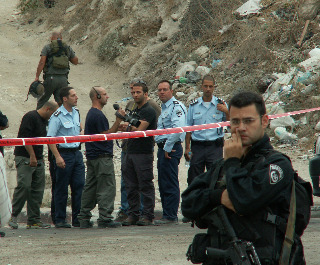 (Special to APN from Daniel Seidemann in Jerusalem and Lara Friedman)
(Special to APN from Daniel Seidemann in Jerusalem and Lara Friedman)As most people probably know by now, early this morning (reportedly around 4am local time) an Israeli security guard working for the Silwan settlers shot and killed a Palestinian resident of Silwan and wounded two others, one seriously (Haaretz, Ynet, Maan).
Glib talk about settlements harms peace efforts (Part II)
By Lara Friedman Tuesday, September 14, 2010 - 1:39 PM
Part I on the settlement moratorium can be found here
As Israeli and Palestinian negotiators sat down for the second round of peace talks today in Sharm el Sheikh, their meeting was overshadowed by the imminent expiration of the settlement moratorium on September 30th. Many pundits continue to argue that a compromise on the settlement moratorium -- one that permits Israel to pursue some new settlement construction -- is the only thing that can get the parties past this hurdle. Many continue to suggest, too, that a "reasonable" compromise on settlements is easy to define. They are wrong on both counts.
It also seems safe to predict that a corollary to these arguments will soon emerge, to the effect that President Abbas' continued refusal to accept a compromise proves he is weak or, more damning, not serious about making peace. The irony is that this analysis makes as much -- if not more -- sense applied to Prime Minister Netanyahu.
Washington, DC | September 2, 2010 | 1:00 p.m. EDT
MR. CROWLEY: Good afternoon and welcome to the Department of State in Washington, D.C. Today, we have successfully re-launched direct negotiations between the - among the United States, Israel, and the Palestinian Authority in pursuit of a final agreement, a final settlement and a just peace, two states living side by side. George Mitchell will give a statement and answer a few of your questions, but we still have meetings going on with the parties and will have - he'll have to return upstairs rather rapidly to rejoin the negotiations. But here's Senator Mitchell.
MR. MITCHELL: Good afternoon, ladies and gentlemen. The parties have just concluded the first round of trilateral talks. The meeting lasted about an hour and a half. It began with a plenary session involving the full U.S., Israeli, and Palestinian delegations on the eighth floor of the State Department and then broke to a smaller meeting in the Secretary of State's personal office involving Prime Minister Netanyahu, President Abbas, Secretary Clinton, and myself. Prime Minister Netanyahu and President Abbas then went into a separate meeting for a direct discussion. That meeting is still going on right now.
September 2, 2010
Secretary Clinton's Remarks with Israeli Prime Minister Benjamin Netanyahu and Palestinian Authority President Mahmoud Abbas (video available here)
SECRETARY CLINTON: Good morning and welcome to the State Department here in the Benjamin Franklin Room. I want to thank all of you for joining us today to re-launch negotiations to end the Israeli-Palestinian conflict. I know the decision to sit at this table was not easy. We understand the suspicion and skepticism that so many feel, born out of years of conflict and frustrated hopes. The tragic act of terror on Tuesday and the terrorist shooting yesterday are yet additional reminders of the human costs of this conflict. But by being here today, you each have taken an important step toward freeing your peoples from the shackles of a history we cannot change, and moving toward a future of peace and dignity that only you can create. So, thank you. Thank you for your courage and your commitment.
However, this is not tell the whole story.
The key fact missing from such analysis is this: so much new construction was front-loaded just before the start of the moratorium that if the moratorium is not extended past Sept 26th its impact will have been minimal.
For Immediate Release
September 1, 2010
REMARKS BY PRESIDENT OBAMA, PRESIDENT HOSNI MUBARAK OF EGYPT, HIS MAJESTY KING ABDULLAH OF JORDAN, PRIME MINISTER NETANYAHU OF ISRAEL, AND PRESIDENT MAHMOUD ABBAS OF THE PALESTINIAN AUTHORITY BEFORE WORKING DINNER
East Room
7:05 P.M. EDT
Remarks by the President in the Rose Garden after Bilateral Meetings with Prime Minister Netanyahu of Israel, President Mahmoud Abbas of the Palestinian Authority, His Majesty King Abdullah of Jordan, and President Hosni Mubarak of Egypt
For Immediate Release -- September 1, 2010
September 1, 2010
Oval Office Colonnade
12:24 P.M. EDT
REMARKS BY PRESIDENT OBAMA AND PRIME MINISTER NETANYAHU OF ISRAEL
AFTER BILATERAL MEETING
There are good reasons to be skeptical that these talks will succeed, and the reasons for skepticism are clear: the readiness and ability of both Israeli and Palestinian leaders to deliver their respective sides of a peace agreement is in doubt; President Obama has yet to demonstrate the kind of hands-on, "I-will-not-let-this-fail" engagement that will be necessary for talks to succeed; and of course, spoilers will be out in force, seeking through actions and words to provoke hatred and anger, to undermine trust, and, if possible, to destroy this new peace process.
That said, there are also reasons to be hopeful that these talks can succeed. With most attention these days focused on the reasons for skepticism, we think this is an important time to look seriously at these reasons for hope.
Office of the Press Secretary
August 31, 2010 (10:24 A.M. EDT)
Press Briefing by Special Envoy for Middle East Peace Senator George Mitchell
10:45 am: The President holds a bilateral meeting with Prime Minister Benjamin Netanyahu of Israel in the Oval Office
1:30 pm: The President holds a bilateral meeting with President Mahmoud Abbas of the Palestinian Authority in the Oval Office
2:45 pm: The President holds a bilateral meeting with King Abdullah II of Jordan in the Oval Office
4:00 pm: The President holds a bilateral meeting with President Hosni Mubarak of Egypt in the Oval Office
5:20 pm: The President delivers a statement to the press in the Rose Garden
7:00 pm: The President and visiting leaders deliver statements to the press in the East Room
8:00 pm: The President hosts a working dinner with visiting leaders in the Old Family Dining Room
(click on link for video)
Washington, DC -- APN today unequivocally condemned the terrorist attack in the West Bank that killed four Israelis. APN President and CEO Debra DeLee stated:
"Today's attack is a senseless act of violence whose likely purpose is to derail the peace talks that are set to get underway in Washington this week. There are no doubt self-appointed spoilers who want to force both Israelis and Palestinians to spurn negotiations in favor of continued conflict. They cannot be permitted to succeed."
APN is America's leading Jewish organization advocating peace for Israel.
Glib talk about settlements harms peace efforts
With the resumption of Israeli-Palestinian talks this week and the approaching September 26th expiration of the settlement moratorium, the settlements issue is set to once again take center stage.
Last week, in an otherwise excellent article, former US Ambassador to Israel Martin Indyk suggested that this need not be a crisis. He stated that "there could be a workable compromise if Mr. Netanyahu restricts building to modest growth in the settlement blocs that will most likely be absorbed into Israel in the final agreement, while offering changes that would make a real difference to West Bank Palestinians..."
The following day, Haaretz's Aluf Benn offered a similar observation as he laid out the popular wisdom regarding what can be expected from Prime Minister Netanyahu. Benn stated that "Everyone agrees the sweeping construction freeze cannot be continued and that the large settlement blocs should be distinguished from the isolated settlements beyond the separation fence. Construction will resume in the blocs and be frozen in the isolated settlements--or continue on a small scale."
This narrative is highly attractive to analysts and pundits because it is simple to articulate, sounds reasonable, and offers an easy answer to the question: how can Netanyahu possibly continue the settlement moratorium? The answer? He doesn't have to.
Unfortunately, this narrative has two huge flaws.
 The steady march of settlements, the rightward shift in Israeli
politics, the growing sense that a conflict-ending peace agreement is
impossible -- all these things are feeding some pundits' impulse to
declare the death of the two-state solution as a means of ending the
Israeli-Palestinian conflict.
The steady march of settlements, the rightward shift in Israeli
politics, the growing sense that a conflict-ending peace agreement is
impossible -- all these things are feeding some pundits' impulse to
declare the death of the two-state solution as a means of ending the
Israeli-Palestinian conflict.But what are the alternatives?
But while the situation wasn't pretty, there were always lines Israel did not cross - lines that Israel is crossing today, apparently utterly unconcerned by the consequences.
Weissglas - who is by no means a dove (no pun intended) - closes with these powerful words: "The outline of the possible solution is clear: the establishment of a Palestinian state, the evacuation of most of Judea and Samaria with some territorial swaps, devising a joint control arrangement in Jerusalem based on demographic principles, and the resettling of the Palestinian refugees within the borders of the Palestinian state. The present government, like any other government, will be unsuccessful in substantially altering this outline. The sooner it makes the painful decisions necessary for its implementation, the sooner Palestinian suspicions will evaporate and chances will grow for a successful outcome to talks."
Mr. Weisglass, we couldn't agree more.
Full Weissglass op-ed after the break (translation by Israel News Today).
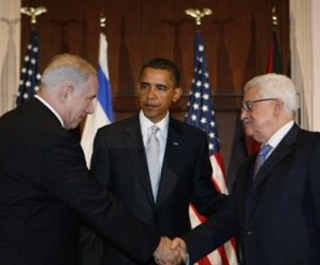 By Lara Friedman
By Lara Friedman The fact that both Pearlman and Teitel are accused of terror sprees that lasted more than a decade has aroused some comment. The time it took for Israeli authorities to act against the two seems to be in stark contrast to what is seen when an Israeli is murdered by a Palestinian. For example, today the Shin Bet announced that it had caught the Hamas cell in Hebron responsible for the murder of an Israeli policeman - a murder that took place almost exactly 1 month ago.
Indeed, the Israeli press has focused a great deal in recent days on the difficulty Israeli officials seem to have in dealing with extremist settler law-breakers, focusing, in particular, on the lengths that extremist settler leaders are going to in order to turn the tables on Israeli intelligence officials in order to embarrass the State of Israel and thwart its efforts to impose any semblance of the rule of law on them.
 Peace Now Settlement Watch director Hagit Ofran got out in front of the breaking news today with her report explaining the story behind the news about new construction at the East Jerusalem settlement of Pisgat Zeev.
Peace Now Settlement Watch director Hagit Ofran got out in front of the breaking news today with her report explaining the story behind the news about new construction at the East Jerusalem settlement of Pisgat Zeev.Yes, it would have great if during this week's visit Obama has made explicit his expectation that the settlement moratorium should be extended past September 26th. And yes, many of us would have liked to hear him press Bibi on issues related to Jerusalem, Gaza, and Bibi's readiness to discuss all final status issues in negotiations and achieve a peace agreement to realize the two-state solution.
But we all knew in advance that the goal of this visit - for both Obama and Bibi, each for his own reasons - was a clear public statement that relations between the two are fine. And barring some 11th hour Israeli provocation - an outrage on par with the Ramat Shlomo embarrassment during the Biden visit, or the announcement of building permits for Shepherds Hotel the same day Bibi was set to meet Obama on his last visit - that was always what this was going to be. The point being: nobody should be surprised that both Bibi and Obama were content to rhetorically avoid or gloss over any disagreements.
 For years settlers have openly fund-raised in the United States - including in synagogues, on booze cruises, in churches and at gala dinners.
Over time, millions of dollars have flowed, tax-exempt, to settlers and
settlement-related causes, including to support settler extremists in Hebron and East Jerusalem, (cont.)
For years settlers have openly fund-raised in the United States - including in synagogues, on booze cruises, in churches and at gala dinners.
Over time, millions of dollars have flowed, tax-exempt, to settlers and
settlement-related causes, including to support settler extremists in Hebron and East Jerusalem, (cont.)Maariv is reporting today (July 2) that on Sunday (July 4), the Knesset's Ministerial Committee for Legislation will be taking up a bill that would require the government to bring any decision to freeze settlements - even for a short time - to the Knesset for a vote. (The Jerusalem Post reported the same thing, in less detail, a few days ago).
Given the current political coloration of the Knesset, if this bill is passed into law it will make it nearly impossible for Netanyahu to extend the current settlement moratorium - or impose another one in the future.
Poor Bibi.
Michael Oren's curious understanding of friendship
Posted By Lara Friedman Thursday, July 1, 2010
Earlier this week Israel's Ambassador to the US, Michael Oren, reportedly said that relations between Israel and the US "...are in the state of a tectonic rift in which continents are drifting apart." The implication being that there has been a shift in the US approach to Israel, led by a president who unlike his predecessors is "not motivated by historical-ideological sentiments toward Israel but [instead] by cold interests and considerations."
With Netanyahu due in Washington next week for a visit whose ostensible purpose is to demonstrate that relations between the two governments are good, these comments have raised some eyebrows.
Solow and Rosenberg get their facts wrong (more on that in a second). But more importantly, their thesis suggests that there is little that Israel or America's leaders can do to make progress towards peace. That is a dangerous line of thinking, one that ignores how important progress towards peace is for the security of Israelis and for Israel's long-term viability as a Jewish and democratic state.
 On June 30, 2010, APN's board adopted the following policy language regarding Turkey:
On June 30, 2010, APN's board adopted the following policy language regarding Turkey: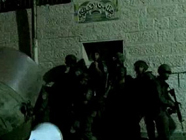 Today APN sent the following letter to President Obama, urging him to engage, urgently, on Jerusalem.
Today APN sent the following letter to President Obama, urging him to engage, urgently, on Jerusalem.(picture shows Israeli forces responding to June 27 protest in Silwan, East Jerusalem)
The violence and tension in Silwan did not arise out of a vacuum.
Director, Settlement Watch project of the Israeli Peace Now movement
&
Lara Friedman
Director, Policy and Government Relations, Americans for Peace Now
While all eyes are focused these days on Gaza, around the corner awaits another huge challenge to nascent peace efforts: the September 26th expiration of the settlement moratorium.
1. Bills & Resolutions
2. More Aftermath of the Gaza Flotilla
3. Iran Sanctions and State-of-play on the Hill
4. With Friends Like This... Broun (R-GA) on God's Punishment for Turning Our Back on Israel
On
Now, six months into the moratorium - with the September 2010 expiration of the moratorium looming large in the minds of policymakers in the US and Israel, as well as in those of the settlers and their supporters - we present our latest balance sheet.
End the siege on Israel
By Fadi Elsalameen
Israel's deadly attack on the "Freedom Flotilla" is proof of how Gaza continues to give Israel a taste of its own medicine. Intended to help solve Israel's problems with Hamas, the three-year-old siege of Gaza is developing into a siege of Israel, while it causes tremendous damage to the country's image around the world.
2. Congress and the Gaza Flotilla Debacle
3. APN on the Gaza Flotilla Debacle
4. Congress and the New UN Sanctions on Iran
5. APN on new Iran Sanctions
6. Senate Hearing on Hezbollah
7. With Friends Like This... Gohmert (R-TX) on Israel, Iran, Bill Cosby and the Bible
8. Ackerman Calls for International Jewish Legislators Conference in Jerusalem
Israeli Force, Adrift on the Sea
By AMOS OZ | June 1, 2019 | ARAD, Israel
FOR 2,000 years, the Jews knew the force of force only in the form of lashes to our own backs. For several decades now, we have been able to wield force ourselves -- and this power has, again and again, intoxicated us.
In the period before Israel was founded, a large portion of the Jewish population in Palestine, especially members of the extremely nationalist Irgun group, thought that military force could be used to achieve any goal, to drive the British out of the country, and to repel the Arabs who opposed the creation of our state.
Luckily, during Israel's early years, prime ministers like David Ben-Gurion and Levi Eshkol knew very well that force has its limits and were careful to use it only as a last resort. But ever since the Six-Day War in 1967, Israel has been fixated on military force. To a man with a big hammer, says the proverb, every problem looks like a nail.
Israel's siege of the Gaza Strip and Monday's violent interception of civilian vessels carrying humanitarian aid there are the rank products of this mantra that what can't be done by force can be done with even greater force. This view originates in the mistaken assumption that Hamas's control of Gaza can be ended by force of arms or, in more general terms, that the Palestinian problem can be crushed instead of solved.
Israel's moral decadence
Yariv Oppenheimer | May 31, 2010
(published in Maariv, Hebrew only)
Even if the fleet to Gaza is irritating and outrageous, a sovereign state cannot treat every act of protest as a terror event that has to end in bloodshed
Tonight Israel marked a new low point in the way it chose to contend with its domestic and external policy dissidents. A state that will not let its citizens protest, demonstrate and demand justice, a state that is busy composing loyalty tests for its citizens and passing laws to limit the freedom of expression, failed again in the real test and stopped a protest fleet of civilian ships at the cost of more than ten lives.
2. Iran and Israel in the 2011 Defense Authorization Bill (HOUSE)
3. Iran and Israel in the 2011 Defense Authorization Bill (SENATE)
4. Further Action on Iran Sanctions Deferred
5. Feinstein Circulates Letter Supporting Peace Talks
6. APN on Palestinian Boycott of Settlement Products
(Note: For anyone who missed Danny Seidemann and Greg Khalil on the Hill earlier this month talking about Jerusalem and proximity talks, you can watch their excellent presentations here.)
2. Extensions of remarks on Israel's 63rd birthday
3. House-Senate conference opens on Iran sanctions bill
4. New Pro-Peace sign-on Letter in the House
Redeeming Jerusalem by truth, not hollow slogans
By Daniel Seidemann Monday, April 26, 2010
In recent full page ads in the New York Times, Washington Post and Wall Street Journal, renowned author and Nobel laureate Elie Wiesel argued that Jerusalem is "above politics." But the portrait of the city Wiesel painted is so factually inaccurate and so morally specious as to leave no room for doubt: Wiesel's false innocence and moral posturing over Jerusalem is an example of politics par excellence, with Wiesel willingly becoming a tool of Israel's extreme right in its desperate efforts to block Obama's peace efforts.
A review of the facts is in order
2. IRPSA on the Move
3.
4.
5. AIPAC letter on the Hill - how did they do?
6. Ackerman Backs Obama Admin's Syria Policy
7. Schumer attacks Obama over Israel Policy
8. Joint NIAC-APN Oped in the Hill: Changing Course on Iran Sanctions
While House appointees were formally appointed only today, it is well-known that over the past month House and Senate staff have been working to reconcile the bills. It is also well-known that Administration officials have been weighing in to try to convince key members to accept what the Administration considers to be the minimum changes necessary to ensure the bill does not directly conflict with the President's Iran strategy and efforts.
Now that House conferees have been appointed, it is anticipated that the conference will formally conclude its work quickly - as indicated by House Committee on Foreign Affairs Chairman Howard Berman (D-CA), who http://abcnews.go.com/Politics/wireStory?id=10126588 (link has expired) stated recently that he wanted Congress to pass the final version of the bill before the end of April. UPDATED: The motion to instruct that accompanied the appointment of House conferees stated that conferees were "to complete their work and present a conference report and joint explanatory statement by no later than May 28, 2010" -- potentially indicating that there will still be significant work completed in conference.
In response to today's events, APN sent a message to every conferee (House and Senate) - the message and the list of conferees is after the break.
Dear [ ],
This week Members of Congress are being pressed to cosponsor H. Con. Res. 260 - a resolution whose ostensible purpose is to recognize the 62nd anniversary of the founding of the state of Israel.
Americans for Peace Now proudly celebrates the anniversary of Israel's founding and we support Congress in doing so. However, given the crass exploitation of this current resolution for other purposes, this year we take the extraordinary step of urging members of Congress to refuse to support this resolution unless it is amended.
Lauder all but accuses Obama of being anti-Israel - of acting in ways that have caused the "deterioration of diplomatic relations" between Israel and the US. But that's not all. Lauder, still speaking on behalf of Jews everywhere, demands answers.
What chutzpah!
The latest example is the decision (also see here) to amend a 1969 military order pertaining to "infiltrators" who might come into the West Bank. The original order was aimed at people entering the territory from countries with which Israel was in a state of war, and who might therefore threaten Israel's security. Now, Israeli officials have taken the extraordinary step of "updating" the order so that it can be applied to a potentially huge number of Palestinians and virtually all internationals living or working in the West Bank - in effect applying to them the same order that was originally intended to apply to Lebanese and Syrian commando forces that might try to infiltrate the West Bank to do evil unto Israel.
2. AIPAC on the Hill this week
3. Members of Congress Express Solidarity with
4.
5.
6. Looking Ahead: Anticipated Congressional Condemnation of UN Human Rights Council
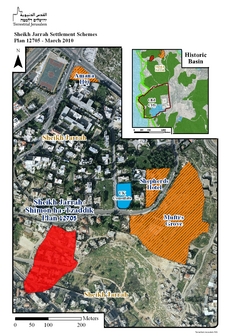 Special to APN from Daniel Seidemann and Lara Friedman
Special to APN from Daniel Seidemann and Lara FriedmanTwo "new" East Jerusalem settlement projects have hit the news in the wake of the Biden debacle - one for the Shepherd's Hotel and the other for the Shimon Ha-Tzaddik neighborhood of Sheikh Jarrah (Click here for a larger map of the area).
Shepherd's Hotel: As is now being widely reported in the Israeli and international press, Israel has issued permits for new settler construction in East Jerusalem.
The details are as follows: on March 18, 2010 the final permits were issued for the construction of 20 units for settlers at the site of the Shepherd's Hotel (a pdf of the actual permit is available here). According to the Municipality, the settlers applied for and paid the fees for the permits on March 15, 2010.
It should be recalled that the Shepherd's Hotel project was approved (final approval) in July 2009. Thus, barring intervention from the government of Israel, the project could have moved forward at any time since then - all that was needed was for the settlers to pay the fees and the issuance of the permits would be automatic.
That said, it is clear that the timing of the settlers' decision to move on this project at this time was neither coincidental or nor innocent. This is why we have been asserting for some months that the day after indirect talks were announced, there would be a provocation in Jerusalem, and it could well be bulldozers knocking down the Shepherd's Hotel.
Dear XXXXXX:
Tomorrow, thousands of "pro-Israel" activists will be on the Hill claiming to speak for all Americans, and especially American Jews, who care about Israel. We want you to know: they do not speak for the entire Jewish community.
Most American Jews want Israeli-Palestinian peace talks to succeed and understand that robust, sustained US leadership is needed. We know that sometimes this must include pressure on Israel's government. We also know that Iran poses a serious threat to Israel and US national security interests, and that addressing this threat requires a sober, rational approach, not a knee-jerk reaction that is more reflective of frustration than strategic thinking.
US-Israel relations and the peace process: APN's analysis/comments regarding the http://www.aipac.org/Publications/SourceMaterialsCongressionalAction/Boxer-Isakson_Letter_with_Dear_Colleague.pdf (link has expired) Senate letter, being circulated by Senators Boxer (D-CA) and Isakson (R-GA) are available here. The http://www.aipac.org/Publications/SourceMaterialsCongressionalAction/HoyerCantorLetterDC.pdf (link has expired) House letter, being circulated by Hoyer (D-MD), Cantor (R-VA), Berman (D-CA), Ros-Lehtinen (R-FL), Ackerman (D-NY), and Burton (R-IN) is similar to the Senate version, but different in two key ways. First, it omits the paragraph blaming the Palestinians for the failure to re-start peace talks (the Senate version asserts that it is Palestinian intransigence and preconditions, not Israeli actions, that are to blame). Second, the House letter makes explicit the call for US-Israel disagreements to be handled "quietly" (something that is implied, but not explicitly stated, in the Senate version).
Iran sanctions: Also circulating (and available on AIPAC's website) are AIPAC-backed House and Senate letters urging the President to impose "crippling" sanctions on Iran -- a somewhat odd ask, since the legislation that AIPAC is lobbying for would actually force the president to impose such sanctions, meaning "urging" unnecessary. The letters also urge him to implement his "existing authority" on Iran - an implied criticism that he is not fully implementing the sanctions already imposed under US law. The House version of the letter, being circulated by Reps. Jackson Jr. (D-IL) and Pence (R-IN) is available http://www.aipac.org/Publications/SourceMaterialsCongressionalAction/Jackson-Pence_Letter_with_Dear_Colleague.pdf (link has expired) here. The Senate version, being circulated by Sens. Schumer (D-NY) and Graham (R-SC), is available http://www.aipac.org/Publications/SourceMaterialsCongressionalAction/031910_DC_Iran_Sanctions_Letter.pdf (link has expired) here.
She also made some important, and probably less welcome, statements about the peace process, including:
On settlements and the settlement "moratorium": "We also made clear that this was just a first step and, like every administration for decades, underscored that the United States does not accept the legitimacy of continued Israeli settlements. As Israel's friend, it is our responsibility to give credit when it is due and to tell the truth when it is needed."
On the imperative to achieve peace: "The conflict with the Palestinians and with Israel's Arab neighbors is an obstacle to prosperity and opportunity for Israelis, Palestinians, and people across the region. And it threatens Israel's long-term future as a secure and democratic Jewish state."
On the "demographic threat": "As Defense Minister Barak and others have observed, the inexorable mathematics of demography are hastening the hour at which Israelis may have to choose between preserving their democracy and staying true to the dream of a Jewish homeland. Given this reality, a two-state solution is the only viable path for Israel to remain both a democracy and a Jewish state."
On the linkage between the conflict and extremism: "The status quo strengthens the rejectionists who claim peace is impossible and weakens those who would accept coexistence. That does not serve Israel's interests or our own. Those willing to negotiate need to be able to show results for their efforts. And those who preach violence must be proven wrong. All of our regional challenges -- confronting the threat posed by Iran, combating violent extremism, promoting democracy and economic opportunity - become harder if rejectionists grow in power and influence. Conversely, a two state solution would allow Israel's contributions to the world, and to our greater humanity, to get the recognition they deserve; would allow the Palestinians to realize their own legitimate aspirations; and would undermine the appeal of extremism across the region."
Reiterating US "principles" and policy on final status: "...we believe that through good-faith negotiations, the parties can mutually agree to an outcome which ends the conflict and reconciles the Palestinian goal of an independent and viable state based on the '67 lines, with agreed swaps, and Israel's goal of a Jewish state with secure and recognized borders that reflect subsequent developments and meet Israel's security requirements."
Reiterating US "principles" and policy regarding Jerusalem: "The United States recognizes that Jerusalem is a deeply important issue for Israelis and Palestinians, and for Jews, Muslims, and Christians. We believe that through good faith negotiations the parties can mutually agree on an outcome that realizes the aspirations of both parties for Jerusalem, and safeguards its status for people around the world. For negotiations to be successful, they must be built on a foundation of mutual trust and confidence. That is why both Israelis and Palestinians must refrain from unilateral statements and actions that undermine the process or prejudice the outcome of talks."
Re-iterating US opposition to settlement construction in East Jerusalem: "New construction in East Jerusalem or the West Bank undermines mutual trust and endangers the proximity talks that are the first step toward the full negotiations that both sides want and need. It exposes daylight between Israel and the United States that others in the region could hope to exploit. And it undermines America's unique ability to play a role - an essential role, I might add -- in the peace process. Our credibility in this process depends in part on our willingness to praise both sides when they are courageous, and when we don't agree, to say so, and say so unequivocally."
As noted in today's Round-Up, AIPAC will be on the Hill next week lobbying members of Congress to pass "crippling" Iran sanctions and to sign on to letters to the Administration regarding US-Israel relations and the peace process.
The Senate version of that letter, being circulated by Senators Barbara Boxer (D-CA) and Johnny Isakson (R-GA), can now be read here; the Dear Colleague circulating with it can be read here. As expected, it is a carefully crafted, moderate-sounding letter -- an updated version of last year's Bayh-Risch letter. In brief, the letter (addressed to Secretary Clinton):
- implies that the problem with the recent announcement of new Jerusalem settlement plans was a problem of timing, not substance, and that the construction itself is not a serious issue since it will take place sometime in the future ("We write to urge you to do everything possible to ensure that the recent tensions between the U.S. and Israel over the untimely announcement of future housing construction in East Jerusalem do not derail Israeli-Palestinian peace negotiations or harm U.S.-Israel relations.")
- asserts that the failure to re-start Israeli-Palestinian negotiations is entirely due to Palestinian intransigence and in no way due to Israeli actions ("Despite your best efforts, Israeli-Palestinian negotiations have been frozen over the past year. Indeed, in a reversal of 16 years of policy, Palestinian leaders are refusing to enter into direct negotiations with Israel. Instead, they have put forward a growing list of unprecedented preconditions. By contrast, Israel's prime minister has stated categorically that he is eager to begin unconditional peace negotiations with the Palestinians."
- implies that the Obama Administration should not publicly
criticize Israel, even when Israel does things to publicly embarrass it
("We recognize that our government and the Government of Israel will not
always agree on particular issues in the peace process. But such
differences are best resolved amicably and in a manner that befits
longstanding strategic allies."
2. Congress and the Jerusalem Settlements Dust-Up
3. AIPAC on the Hill Next Week
4. Dear Colleague Bashing PA
5. APN on Iran Sanctions, Jerusalem Settlement Issue
The more likely answer is less sinister but no less ominous: this was just business-as-usual - an Israeli government thumbing its nose at the US, assuming there will be no consequences.
Most insiders agree that Netanyahu probably didn't know in advance about the settlement plan coming up for approval, and that the timing was more about one of Netanyahu's ministers trying to embarrass him than about trying to pick a fight with Washington. But that absolves Netanyahu of nothing. For him to not be keeping track of (and taking control of) Jerusalem settlement plans at this point is either gross negligence or willful ignorance.
And that, too, is business-as-usual: an Israeli Prime Minister who believes it is politically easier and less costly to clash with the US than with his own cabinet or domestic constituencies.
Getting over the sanctions delusion
Recently I was talking with a friend from the military-intelligence world about the mounting pressure on Congress to pass the Iran Refined Petroleum Sanctions Act - legislation aimed at "crippling" Iran's civilian economy. Reportedly a House-Senate conference is already informally underway trying to craft a consensus version of the bill, and last week AIPAC sent a message to every Member of Congress urging that IRPSA be enacted "without delay."
I explained that in my view sanctions aimed at civilians were a bad idea, and that sanctions in general, while a potentially powerful tool, do not, on their own constitute a policy. My friend's response? "Sanctions are the sign of a failed policy, period."
He makes a good point. Fundamentally, sanctions are how the US tells a foreign government: we don't like you, we can't convince you to see things our way, and we can't (or aren't ready to) overthrow you - so get ready to feel some pain.
1. Bills and Resolutions
2. House/Senate/AIPAC Gear Up on "Crippling" Iran Sanctions
3. New APN Policy document - Needed: A Rational Approach to Iran
4. Crowley Circulates Dear Colleague in support of Israeli-Palestinian Coexistence Programs
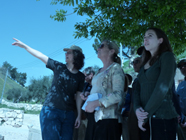 (Special to APN by Daniel Seidemann and Lara Friedman)
(Special to APN by Daniel Seidemann and Lara Friedman)Attention today is riveted on headlines in the Israeli press reporting Israeli plans for 50,000 residential units in East Jerusalem. Coming on the heels of the Biden visit debacle, the interest in this report is unsurprising. Here we offer some information and analysis about the facts behind the headlines and what they mean for the prospects of peace and the two-state solution.
On 3/9/10 - just in time for the visit to Israel of Vice President Biden and just a day after Special Envoy George Mitchell announced that Israel and the Palestinians had agreed to indirect talks - news broke in the Israeli press that Israel had approved the construction of 1600 new settlement units in East Jerusalem. The decision was strongly condemned by the US, the Palestinians, and the members of the international community. The Arab League, which the previous week had endorsed indirect talks, announced that it would meet March 10 to consider its reaction to the decision.

2. FY12 ForOps Season Opens - President's Budget Request
3. FY12 ForOps Season Opens - Hearings
4. SFRC Hearing: MIDDLE EAST PEACE: GROUND TRUTHS, CHALLENGES AHEAD
5. Ros-Lehtinen attacks UNRWA (again)
As most people know by now, Jerusalem mayor Nir Barkat has agreed to delay his plans to demolish tens of Palestinian homes in Silwan (and at the same time legalize a illegally-built settler high-rise apartment building in the area), following a carefully-worded intervention by Prime Minister Netanyahu (who pointedly did not say he disapproved of the mayor's plan, but rather urged the Mayor to try harder to convince the Palestinians to voluntarily agree to have their homes demolished and to be re-located to some site where the mayor thinks thinks their presence is more welcome/appropriate). The US is reportedly pleased with the Prime Minister's action and the outcome.
2. New House Letters Grandstanding on Israel/Palestinian Issues
3.
4. New Ambassador to
Baker on Obama's Iran policy thus far: "I think it's too soon to say everything has failed. I don't -- I think you keep doing what you're doing. In other words, I think what you need to do is keep pushing for stronger sanctions and keep talking to or being ready to talk to the Iranian leadership, if they're willing to talk. Those things -- and support the reformers in the streets. Those three things. They're not mutually exclusive. It's exactly what we did for 40 years with the Soviet Union. We talked to them about nuclear -- we negotiated arms control agreements. We supported the dissidents in the Soviet Union. We worked hard on Soviet-Jewish emigres to get them the right to leave. We met with dissidents when we would go over there as -- as Secretary of State. And so there's no reason why we can't do all three of those things and continue to do them."
Recent developments suggest that the settlers and their supporters are working to apply the tactics they have successfully used in the takeover of Silwan (and other areas of the Old City's historic basin) in Sheikh Jarrah. This means expanding the settler presence and settler dominance over the area not just through the takeover of homes, but through seizing control of the public domain (for the benefit of the settlers). It also means working to shift the Israeli (and international Jewish) public perception of the area in order to make this Palestinian neighborhood part of the so-called Jewish "consensus" -- an area viewed as being home to core Jewish religious and historic equities that must never be left under Palestinian control.
What we are seeing here is the Silwan-ization of Sheikh Jarrah.
As the RJC makes clear in the piece, it is especially frustrated with the 54 members of Congress who signed a letter to President Obama expressing concern about the humanitarian suffering in Gaza. The RJC wants the world to know that everything -- yes, everything -- Israel does with respect to Gaza reflects bona fide Israeli security needs, and that any resulting suffering is 100% the fault of the Palestinians for making bad choices. And the RJC is putting these members of Congress - and everyone else - on notice that suggesting otherwise is no less than anti-Israel calumny. (The RJC is so excited about taking on APN and J Street over the Gaza letter that today it sent out a fund-raising email highlighting the JPost articles.)
The RJC's logic is the latest example of the kind of tactics Hadar and I are talking about in our article: "No American - Jewish, Muslim or Christian, Democrat or Republican - who recognizes the security benefit to Israel in ending rather than enabling Hamas' monopoly over basic goods in Gaza, who sees that furthering a humanitarian crisis does not equate to fighting terrorism, and who cares for the future of children in the Middle East, Israeli and Palestinian, should let anyone use fear and smear tactics for their own partisan benefit."
And as Hadar and I point out: "There are real threats to Israel. There really are people out there who don't support Israel as a Jewish democratic homeland. We don't need to invent opposition to Israel and we certainly don't need to push people who are supportive of Israel away from us by calling them 'anti-Israel' every time someone expresses either concern for Palestinians or opposition to a particular Israeli government position."
Shame on the RJC for this further shameless partisan grandstanding at the expense of Israel.
This is of course a silly argument - imagine two doctors arguing about how to treat a patient: Doctor 1: "We've tried everything we can think of and he's not getting better, so I propose we try radiation." Doctor 2: "Are you nuts? Given his condition, all medical science points to the fact that radiation won't do anything to help him and will almost certainly make him worse" Doctor 1: "Well, unless you have a better idea you have no choice but to accept my recommendation." Doctor 2: "Where did you get your medical degree??"
But imaginary dialogues aside, there are some sanctions that actually make sense. For example, it seems self-evident that it makes sense to impose sanctions on those who are enabling Iran to block the internet, censor electronic communications, and otherwise interfere with the ability of Iranian citizens to communicate with each other and the outside world (anyone remember the term "twitter revolution?")
To which I think most people would reply: great idea! Someone in Congress should get working on this!
2. Text of Senate floor "discussion" of S. 2799
3.
4. Berman (D-CA) on the record at
This would be a terrible mistake. If he addresses the Middle East at all tonight, at his State of the Union Address, the President should make clear that he will not make this mistake.
The lesson to be drawn from 2009 is not that peace is too difficult or has too high a political price. The lesson of 2009 is that it takes more than patience and polite words to make peace.
Howard Berman (who chairs the House Foreign Affairs Committee) spoke of his admiration for APN's "firm commitment to peace" and praised us as being "among the most reliable and valuable sources of information about the peace process, especially regarding Israeli settlements in the West Bank."
2. Rep. George Miller (D-CA) on the record
3. Speculation over
4.
5.
Another Friday where Israeli police react with fury and force, trying to bar and then break up the event, and arresting peaceful protesters.
Another Friday and more evidence that democracy - and key pillars of democracy like freedom of speech and freedom of association, let alone the freedom to protest peacefully - are under threat in Israel.
When the Sheikh Jarrah protests first started an Israeli friend told me that they would never have any impact -- that Jerusalem is something that Israelis just can't think rationally about. He said that even though we are talking about settler activities in neighborhoods that few Israelis can find on a map, let alone ever visit, the average Israeli hears "Jerusalem" and stops listening.
I hope he is wrong. Because this is about more than settlers targeting houses in this one Palestinian neighborhood. Sheikh Jarrah is a microcosm of the entire Israeli-Palestinian conflict - as pointed out by Didi Remez in a podcast he did with APN earlier this week, following his arrest in last week's protest. It is about Israeli actions and policies that are wholly inimical to peace. It is emblematic of the battle between those who believe in a negotiated peace -- for Israel's own sake -- and those who prefer the zero-sum logic of occupation, domination, and perpetual conflict.
In one neat little package the Sheikh Jarrah protests encompass the core issues at the heart of the Israeli-Palestinian conflict and the peace process: territory, settlements and borders, displacement of Palestinians, and of course, Jerusalem.
I have watched (from afar) these protests grow, week after week. I have watched them gather more and more "mainstream" support, especially in the face of the extraordinary actions of Israeli police. I hope my friend turns out to be wrong -- that Sheikh Jarrah will be the issue that focuses Israelis minds on what is really at stake and motivates them to action.
Besser concedes that:
"APN is probably right that U.S. pressure on both sides is the only strategy with any real hope of pushing the two sides back to the negotiating table."But he also argues that:
"Leaving aside the question of whether that's smart policy or not, politics suggests the administration is likely to move in the opposite direction."Let's hope David Axelrod isn't drawing this same mistaken conclusion. As we argued in the same paper that Besser is critiquing, Obama has little to lose -- and everything to gain -- by stepping up pressure to make progress toward peace.
But that is not the whole story. Because this is not an isolated issue.
It is clear to all of us who work on issues related to peace, human rights or Israeli civil society, that the government of Israel is deliberately and systematically upping the ante and increasing the pressure on those who do not toe the Israel policy line.
The Government of Israel and SWC's longstanding insistence on building the museum on the site of this historic Muslim cemetery from the start provoked widespread consternation and outrage among right-thinking people in the US and Israel, not to mention the Muslim world. In a sort of tragi-comedy (where the irony of the situation was apparently lost only to the SWC), it has also forced SWC leaders (and in particular Rabbi Hier) to transform themselves into rhetorical, moral, and ethical contortionists, twisting and turning the facts and arguments to try to defend a plan that is patently indefensible.
The exit from the project of its celebrity architect offers Israel and the SWC a wonderful face-saving opportunity -- a chance to change course and come up with a new plan on a new site. Doing so will ensure that if a Museum of Tolerance is built in Jerusalem, it is built in a manner that reflects and supports the value for which it is named and to which, ostensibly, it is dedicated.
Continue to read a Backgrounder on the project
Interestingly, the Obama Administration has already gone a good way in this direction. The fact is, with little fanfare and nobody really noticing, the Obama Administration has - in speeches and other statements of President Obama and his top officials - been gradually laying out some clear premises upon which it believes any permanent status talks will be based. While these statements fall short of directly stating US expectations for the content of a PSA, they very clearly communicate US policy on some of the key permanent status issues, and it is no great leap to infer from them some clear US expectations about the shape and content of a PSA.
Transforming these discrete policy utterances into a cohesive set of premises about peace could arguably be very helpful in energizing President Obama's Middle East peace effort, reasserting US leadership and confidence in the Middle East policy arena. Doing so could also reassure Israelis and Palestinians - as well as key allies in the region whom the US needs help from in launching talks - that the US recognizes and validates their core concerns. Moreover, were the US to release a formal policy statement of some kind, along the lines discussed below, it would be very difficult for Israel or the Palestinians to attack the content, since it genuinely includes nothing that has not already been said.
And in a gift to Israeli hasbara-niks, this weekend's visit to Jerusalem by two of Obama's chief opponents in Congress, defeated Republican presidential candidate John McCain (R-AZ) and his lackey, Joe Lieberman (I-CT) spent most of Sunday telling the Israeli media how they would never allow such a thing to happen.
What Mitchell actually said, after Rose pressed him on whether the US has any sticks to use in the Israeli-Palestinian arena, was this:
This is not the first time senior US government officials have argued that Israel should lift the siege. Indeed, almost exactly a year ago President Obama made the same argument - and made it several times since - only to be ignored by Israel.
Now, in the "adding insult to injury" category, it is being reported today that the Israeli High Court of Justice has decided to re-examine the cases of two illegal outposts - outposts that in the past the government of Israel has admitted are completely illegal and promised to demolish. In the words of Peace Now Secretary General Yaariv Oppenheimer, "The government of Israel is thumbing its nose at the rule of law and granting immunity to illegal building by settlers. On the same day that the Civil Administration destroyed 14 Palestinian buildings, the settlers are again being granted a judicial gift, as the process changes from evacuation to authorization. The defense minister ensures protection of the status of the Supreme Court within the Green Line - but decides to ignore the law and submit to settler pressure beyond it."
Background on both stories after the break.
As more reports of new settler activities and settler plans in East Jerusalem accumulate now on an almost daily basis, it is becoming clear that we are in the middle of a Jerusalem settlement blitz.
This blitz is part real and part hype. The motivation behind the blitz is clear: fear that the peace process will take root. The goal of the blitz is also clear: to prevent this from happening.
The good news here is that the nature of this blitz - consisting of a combination of relatively obscure, small projects and projects that are unlikely to actually be implemented - demonstrates how few cards the settlers and their supporters have to play in Jerusalem.
The bad news is that every report of new provocative plans in Jerusalem - even reports that are mostly hot air - represents a very real and tangible blow to the effort to re-launch the peace effort. As such, the Obama Administration and the international community cannot let the Israeli government off the hook in Jerusalem - even as the Israeli government will try to disclaim responsibility, assert that it has no authority, and will try to downplay the importance of these Jerusalem provocations. Jerusalem is the first and best test of how serious the Netanyahu government and the international community are about peace.
But developments in Jerusalem challenge that hopefulness.
Last week, Israel announced new tenders for 700 units in large East Jerusalem settlements.
Quietly on December 29th, with no fanfare or press coverage, steps were taken to expedite final approval of the http://peacenow.org/entries/wp263 (link has expired) Shepherds Hotel settlement plan - paving the way for the imminent demolition of that iconic building and the beginning of construction of the first Jewish settlement to be established in the heart of the densely-populated Palestinian neighborhood of Sheikh Jarrah. (The link is to a screen shot from the Jerusalem Municipality website - Hebrew only).
Most recently, on January 4th (Monday) the Jerusalem Municipality approved the construction of four large buildings to house 24 families - in what will be the first Israeli settlement construction on the Mount of Olives since 1967. The site is adjacent to the existing Beit Orot settlement (a yeshiva housed in pre-1967 building with some additional trailers).
In Your Backyard
by Neta Patrick and Michael Sfard
The fact that the murder case in which Yaakov (Jack) Teitel was a suspect at the end of the 1990s, was shelved on the grounds of an unknown perpetrator (a situation in which the police has no lead for locating a suspect), is a scandal and a police fiasco. It would be a smaller scandal if this was an exception that did not attest to the rule, but whoever follows the outcome of investigations of violent incidents against Palestinians in the West Bank knows that hundreds of cases are shelved on a daily basis without basic investigation actions being carried out in them. Alibis are not checked, investigation teams do not visit the scene of the incident, and police lineups are not in the lexicon of the Samaria and Judea District Police.
"Shelving a case" is a euphemism for closing a case. In theory, shelving a case does not rule out the possibility that it could be reopened if new evidence is discovered, but in practice, cases do not return from the shelf. The statistics gathered by Yesh Din show that for several years, consistently, over 90 percent of the cases involving suspicions that Israelis committed offenses against Palestinians have been closed without an indictment.
"The next step, according to Ambassador to the US Michael Oren, should be 'imposing crippling sanctions' on the Teheran regime, which is in keeping with the pledge Oren said Obama made to Prime Minister Binyamin Netanyahu in May that the US would end the engagement phase toward Iran if it were unsuccessful by year's end. Oren told The Jerusalem Post that 'there isn't an Israeli view and an American view' on the Iranian question, but rather 'one view.'"
Never mind that the Administration has made clear it doesn't like the "crippling sanctions" Oren is referring to -- sanctions more commonly known as the Iran Refined Petroleum Sanctions Act (IRPSA) and being energetically pushed by most of the organized Jewish community (pretty much everyone but APN).
And never mind that Oren appears to be at odds with his bosses in his call for these "crippling sanctions," since Israeli officials reportedly are on board with the Obama Administration's efforts to pursue multilateral sanctions.
And never mind that Obama did not come close to making any such "pledge" to Bibi in May.
Interesting, because Kessler talks to senior Obama Administration officials who make clear that "We have never been attracted to the idea of trying to get the whole world to cordon off their economy." And who argue that "We have to be deft at this, because it matters how the Iranian people interpret their isolation -- whether they fault the regime or are fooled into thinking we are to blame." Kessler adds that "As a result, top officials show little apparent interest in legislation racing through Congress that would punish companies that sell refined petroleum to Iran. 'Sanctions would not be an alternative to engagement,' another senior official said. 'Our intention is to keep the door open.'"
For anyone who might not have been paying attention, this Glenn Kessler report is completely consistent with what Obama Administration officials have said in the past about IRPSA - most notably in a largely ignored appearance by Deputy Secretary of State Jim Steinberg and Treasury Undersecretary for Terrorism and Financial Intelligence Stuart Levey before the Senate Banking Committee hearing about IRPSA on 10/6/09, and in the letter sent by Deputy Secretary of State Jim Steinberg to Senate Foreign Relations Committee Chairman Kerry (D-MA) on 12/11/09.
And again, for anyone who has not been paying attention, APN has opposed IRPSA from the start - generally for the same reasons articulated by Administration officials. We have been one of the sole voices - and the sole voice in the Jewish community - aligned with the Obama Administration on this issue, and pressing both the House and Senate to reject or amend this very problematic bill (including offering specific amendments to both versions of the bill).
Congress comes back next month, and Senate Majority Leader Reid (D-NV) has already promised to take swift action on IRPSA. It remains to be seen if the Senate Majority leader will heed the Administration's words -- permitting the bill to be amended in substantively significant ways or slow-walking the bill until such time as the President has implemented his own new sanctions strategy.
 Special analysis from Lara Friedman (Americans for Peace Now) and Danny Seidemann (Ir Amim).
Special analysis from Lara Friedman (Americans for Peace Now) and Danny Seidemann (Ir Amim).Over the weekend the news broke in the Israeli press that the government of Israel had approved the issuance of new tenders for nearly 700 units in East Jerusalem settlements (377 in Neve Yaakov, 117 in Har Homa and 198 in Pisgat Ze'ev).
2. Houses Passes IRPSA (Despite Oversight Committee Hearing)
3. Senate Holds Off on IRPSA (for Now)
4. Statements on IRPSA (excerpts)
5.
It is clear why supporters of IRSPA want to focus on South Africa: this is the only example in recent history where sanctions similar to those being proposed for use against Iran achieved their intended purpose.
But those raising the South Africa ignore a key fact: while the sanctions may be similar, their justification and intended purpose are not. These differences render the comparison specious and the conclusion - that sanctions that worked in South Africa will work in Iran - dubious.
- Surprising absolutely nobody, the House voted this afternoon to suspend the rules and pass HR 2194, the Iran Refined Petroleum Sanctions Act (IRPSA), by a vote of 412-12, with 4 voting "present." The full roll call vote can be viewed here. Voting "No" were: Baldwin (D-WI), Blumenauer (D-OR), Conyers (D-MI), Duncan (R-TN), Flake (R-AZ), Hinchey (D-NY), Kucinich (D-OH), Lynch (MA), McDermott (D-WA), Moore (D-WI), Paul (R-TX), and Stark (D-CA). Voting "Present" were: E.B. Johnson (D-TX), Kilpatrick (D-MI), Lee (D-CA) and Waters (D-CA). Friday's Round-Up will include excerpts from key floor statements and statements inserted into the record.
- As the House was getting ready to move on the very misguided and potentially counter-productive IRPSA, yesterday (12/14/09) two new Iran bills were introduced. These two bills embrace a much different approach: targeting Iranian government officials with sanctions and proposing tangible things to support the Iranian people. APN strongly supports both of these bills and is urging members of Congress to cosponsor and support them.
- The first bill is HR 4301, introduced by Reps. Moran (D-VA), Inglis (R-SC) and Delahunt (D-MA). Entitled the Iran Digital Empowerment Act (IDEA), this bill would ensure that the Iranian people have access to software and related technology crucial to internet communications amongst themselves and between Iran and the outside world. It would also ensure that Iranian private citizens have access to tools that allow them to circumvent Iranian government efforts to stifle and monitor internet communications. At present, US sanctions - which have not been updated recently and have thus been overtaken by technology - has already resulted in some such tools and services being unavailable to Iranians.
- The second bill is HR 4303, introduced by Reps. Ellison (D-MN) and Delahunt (D-MA). Entitled the Stand with the Iranian People Act (SWIPA), this bill would (a) bar the issuance of visa to or entry into the US of any Iranian government official credibly alleged to have involvement in human rights abuses; (b) prohibit US procurement contracts with companies that have aided Iranian government efforts to stifle free speech by providing censorship or monitoring technology; and (c) authorize US non-profit organizations' activities in Iran for the provision of humanitarian and people-to-people assistance.
Dear XXX,
Tomorrow, HR 2194, the Iran Refined Petroleum Sanctions Act, is scheduled to be brought to the floor for a vote under suspension of the rules. APN strongly opposes this legislation. We urge members to vote "No" or "Present" on this bill. We urge Members to recognize that:
This bill is NOT a straightforward, simple, non-controversial effort to help the President pressure Iran. For a table identifying problems with the bill click here. In general, HR 2194 is a bill that:
* takes authority away from the President, tying his hands on key national security strategy. This is NOT a measure that would, as its supporters say, give additional authority to the President. It is a bill that
* targets the Iranian people, in the hope that if the people become miserable enough they will pressure their government to change course. This is a strategy that few experts believe will work, and a strategy that has a very poor track record in other contexts (Iraq, Cuba, Gaza). Indeed, experience has demonstrated that with sanctions like these, the most likely and immediate result will be a backlash by the people of Iran against the United States, not against the Iranian regime.
* limits US options regarding Iran for many years to come, by imposing requirements that could conflict with future efforts to negotiate an international solution regarding Iran's nuclear program and by extending current sanctions legislation (the Iran Sanctions Act, which does not expire until 2011) until 2016, without any discussion or debate.
* conflicts with the approach currently being pursued by the Obama Administration, which is focused on building international support for multilateral sanctions. Last week the Administration weighed in regarding the Senate version of IRPSA, noting that "We are entering a critical period of intense diplomacy to impose significant international pressure on Iran. This requires that we keep the focus on Iran. At this juncture...this legislation, in its current form, might weaken rather than strengthen international unity and support for our efforts."
"we are entering a critical period of intense diplomacy to impose significant international pressure on Iran. This requires that we keep the focus on Iran. At this juncture, I am concerned that this legislation, in its current form, migth weaken rather than strengthen international unity and support for our efforts. In addition to the timing, we have serious substantive concerns, including the lack of flexibility, inefficient monetary threshhold and penalty levels, and blacklisting that could cause unintended foreign policy consequences..."
The letter closes with a plea to delay consideration of the bill until the new year, so as not to undermine the Administration's diplomacy at this critical juncture." [bold added by APN]
2. FY10 ForOps Passes
3.
4. Two House Letters on
Despite what some critics say, it is far too early to judge whether the moratorium is a success or failure in serving the cause of peace. However, it is not too soon for an honest examination of what the moratorium has achieved thus far and the challenges to it that have already arisen. And it is not too soon to start keeping a balance sheet, given that how the moratorium fares - and is perceived as faring - in these early weeks and days is critical to the credibility of everything the Obama Administration has done thus far and to its efforts going forward.
So let's get to the balance sheet.
As of yesterday afternoon, the popular wisdom (including among many House supporters of that bill), was that this is a risk-free strategy -- in terms of putting the Obama Administration in an awkward position, given that its end-of-year deadline for progress in negotiations has not yet passed, and given the Obama Administration's assumed preference for pursuing multilateral sanctions at the present time. It was assumed to be risk-free because it was assumed that the Senate was not going to move on its own version of IRSPA any time before the new year.
Well, popular wisdom was wrong.
It remains to be seen if any senator will object to the request (if even one Senator does -- and this means putting an informal and usually anonymous "hold" on the bill -- then the bill will not move by Unanimous Consent for the time being).
In response to the Hotline request, APN sent the following to all Senate offices:
Dear XXX,
Earlier today Senate leadership today hotlined S. 2799, the Comprehensive Iran Sanctions, Accountability and Divestment Act of 2009. APN opposes passage of the bill in its current form.
Click here to download a table containing a section-by-section analysis of the bill, including proposed amendments.
We strongly urge Senators to object to this attempt to short-circuit debate (and potential amendments) and fast-track a piece of complex and far-reaching legislation - legislation that would impact virtually every aspect of and every option for US policy toward Iran now and in the future.
Dear xxxxx,
Next week a piece of major Iran sanctions legislation, HR 2194, the Iran Refined Petroleum Sanctions Act (IRPSA) will be brought to the floor under suspension of the rules. This means that there will be only limited debate on the measure and no amendments allowed.
Click here to download a table containing a section-by-section analysis of the bill, including proposed amendments.
We have opposed HR 2194 since it was introduced. We believe at its premise it reflects a misguided and potentially self-defeating approach for the US to the challenge posed by Iran's nuclear program. Our full position on the proper response to Iran can be read here.
We oppose this bill, not because we oppose all sanctions. In fact, we have supported and continue to support smart, targeted sanctions that are part of a broader US strategy to deal with this critical foreign policy and national security challenge. Unfortunately HR 2194 is not about smart, targeted sanctions.
Today we sent a message to every House office articulating, again, our opposition to the bill. In addition, we sent along a handy-dandy (or even fancy-shmancy) table laying out our specific concerns with the bill and suggested amendments.
2. IRPSA on the House Agenda
3. Ros-Lehtinen (and
4. Lebanon/Iran Dear Colleague
Today we have another example of Israeli officialdom "going nuclear" on Jerusalem, this time in response to a leaked EU draft document that (gasp) implies that under a peace agreement the capital of a Palestinian state would be East Jerusalem. As quoted in Haaretz, the draft EU document notes:
"The Council is deeply concerned about the situation in East Jerusalem. In view of recent incidents, it calls on all parties to refrain from provocative actions. The Council recalls that it has never recognized the annexation of East Jerusalem. If there is to be a genuine peace, a way must be found to resolve the status of Jerusalem as the capital of two states. The Council calls for the reopening of Palestinian institutions in Jerusalem in accordance with the Roadmap. It also calls on the Israeli government to cease all discriminatory treatment of Palestinians in East Jerusalem."
Judging from the Israeli reactions of shock, dismay, and outrage, an ignorant (or forgetful) observer might assume that nobody had ever suggested such a thing in the past.
That observer would of course be grossly mistaken. What we have here is not the case of anything remotely new or shocking being said by the EU (or of the EU trying to prejudge the outcome of final status talks, as opposition leader Tzipi Livni stated, apparently viewing EU words as more problematic than Israeli settlement activity and home demolitions in Jerusalem -- Tzipi, meet irony. Irony, meet Tzipi. You clearly are not acquainted.). What we have here is a cynical Israel reaction designed, it would seem, to re-set the diplomatic clock back by at least a decade, to a time when politicians and negotiators were still forced to speak in code (not referring explicitly to the fact that a peace agreement would mean the creation of a Palestinian state, let alone the location of its capital).
Below is a compendium of Jerusalem-related data points, drawn mainly from the not-at-all-lefty Jewish Virtual Library, for those who are following this and care about the facts involved.
In what is perhaps the most outrageous grandstanding on Israel witnessed to date in the 111th Congress, on Monday afternoon Rep. Ros-Lehtinen (R-FL), the ranking minority member of the House Committee on Foreign Affairs, circulated a Dear Colleague urging members to join her in sending a letter to President Obama defending Israel's aid program. The implication being, of course, that the Obama Administration is actually considering attacking this aid - an implication that is totally divorced from reality. And it also implies that House Republicans (abetted by a Democrat - Sherman (D-CA) - who one can only guess is feeling pretty silly right now about lending his name to this effort) are stepping up to defend aid because Democratic colleagues have failed to do so. Hilarious. Straw men arguments are certainly common in politics, but this seems to be taking it to an extreme.... (full dear colleague and letter to the President after the break...)
--------------------------------------------------------
From: e-Dear Colleague
Sent: Monday, November 30, 2009 6:06 PM
To: E-DEARCOLL_ISSUES_G-Z_0000@ls2.house.gov
Subject: Intelligence: Dear Colleague: Keep America Safe: Sign Letter to the President Supporting Continued Security Assistance to Israel
Keep America Safe: Sign Letter to the President Supporting Continued Security Assistance to Israel
From: The Committee on Foreign Affairs - Minority Staff
Sent By: Alan.Goldsmith@mail.house.gov
Date: 11/30/2009
Keep America Safe:
Support Continued Security Assistance to our Ally Israel
Dear Colleague:
As our nation faces increasing challenges to both our economy and our security, it is incumbent upon us to make difficult choices and establish priorities for limited taxpayer funds, such as continued robust security assistance to the State of Israel - funding that both advances our national security interests and is mutually-reinforcing. For this reason, we ask that you sign the attached letter to the President requesting that he fully implement our security assistance agreement with Israel and allocate the necessary resources to fulfill this commitment.
The U.S.-Israel alliance is particularly important because both nations are democracies facing the common security threat of rogue regimes that pursue deadly weapons, and that sponsor violent Islamist groups which target both Americans and Israelis.
The Iranian regime - which repeatedly calls for a world without the U.S. and Israel - continues to advance its uranium enrichment efforts and could have nuclear weapons capabilities as soon as next year. To deliver those weapons and make good on its threats, Iran possesses and is further developing an arsenal of missiles that can strike Israel, U.S. forces in the Middle East, and parts of Europe. Iran and its fellow dictatorship Syria also continue to sponsor Hezbollah and Hamas, which continue to threaten Israel from the north and south.
Israel is on the front lines of our struggle against these mounting threats, and that nation has proven itself to be an indispensable ally, sharing her extensive experience in battling militant extremists domestically, militarily, and diplomatically. Israel's qualitative military advantage has, and continues to act as a force-multiplier in the region, thereby playing a vital role in aiding U.S. forces in the Middle East, and beyond. That is why successive Administrations have supported a robust U.S.-Israel alliance.
But to address these growing threats, Israel must spend more proportionately on defense than any state in the Western world - paying for increasingly sophisticated, varied, and costly weapons systems needed to maintain its qualitative military edge. Therefore, in 2007 the U.S. and Israel concluded an agreement to increase U.S. security assistance to Israel over the next decade.
Because the international community has failed to apply strong sanctions to compel the Iranian regime to change course, the threat to our security - and Israel's very existence - has never been greater. Therefore, the attached letter asks the President to fully implement our security assistance pact with Israel, ensuring that both of our nations can protect ourselves and each other against this threat.
To co-sign the letter, please contact Alan Goldsmith or Matthew Zweig at X68467.
Sincerely,
ILEANA ROS-LEHTINEN
Ranking Member
House Committee on Foreign Affairs
BRAD SHERMAN
Chairman
House Subcommittee on Terrorism, Nonproliferation, and Trade
2. Levin Statement on S. Res. 355

Special analysis from Lara Friedman (Americans for Peace Now) and Danny Seidemann (Ir Amim).
Yesterday Special Envoy Mitchell met with Israeli chief negotiator Yitzhak Molcho in London.
The problem is that the premise of this narrative - that the US had demanded a total freeze as a precondition for negotiations - is incorrect. Neither Obama nor any Obama Administration official ever stated that a full settlement freeze was a precondition for negotiations. One can debate whether they should have done so, or whether they should have done a better job making clear what the policy was or managing expectations, but it is simply inaccurate to state that this was the Administration's policy.
It should surprise no one that the media and pundits prefer to view Middle East peace effort through a lens of controversy. Reporting that Mitchell took another trip and held more closed-door meetings is not interesting. Saying that Clinton went to Jerusalem and nothing happened is not news. (Likewise, the definition of "unprecedented" is not especially newsworthy. For the record, the word means "having no previous example" - not, as some seem to think, "laudable," "fantastic," "satisfying our demands" or "consistent with US policy.")
Why? Because Friedman (no relation) has become so predictable in his analysis that I actually had already written my response.
And then I smiled again, because I realized that if you take the piece at face value, Friedman is calling for US punitive action against Israel - cutting off of all aid - that has never been seriously considered and would never be taken. Or if that is not what he means, then he has been tripped up by his own excessively glib analysis. My guess is that it is the latter.
2. Playing Partisan Politics with
3. Goldstone Resolution - the vote
4. Goldstone Resolution - statements
2. House Foreign Affairs Committee Marks Up Major Iran Sanctions Legislation...
3. ...While Senate Banking Committee Marks Up Omnibus Iran Sanctions Bill
4. APN on H. Res. 867 (the Goldstone Resolution)
5. Judge Goldstone on H. Res. 867
6. APN Interns' Notes from the House IRPSA Mark-Up
7. Key quotes from the Dodd Iran Sanctions Hearing
And what does Ben-David attack Rebecca for? Being of Arab descent and working for organizations that explicitly, publicly support Israeli-Palestinian peace and the two-state solution. Outrageous. Intolerable. I spent a good part of the day fuming. And then I read Spencer Ackerman's response, and I felt a lot better. I recommend it to all.
2. House passes Iran Sanctions Enabling Act
3. IPRSA Set to Move Forward (in committee and on the floor)
4. APN on IRPSA Developments
5. Partisan Point-Scoring over IRPSA Continues
6. Ros-Lehtinen Attacks Administration Over Goldstone Report
7. Four House Republicans Launch Anti-Muslim Witch-Hunt
Co Authors Daniel Seidemann is a Jerusalem attorney and founder of Ir Amim, an Israeli nongovernmental agency, and Lara Friedman is director of policy and government relations for Americans for Peace Now.
----------------------------------------------
Jerusalem has once again emerged in recent days as the focal point of dangerous tensions that threaten to erupt into violence or even a third intifada. Much of the media analysis has overlooked the fact that this situation did not arise out of a vacuum, but is the latest manifestation of tensions that have been steadily growing for months.
2. Administration Officials Tell Senate Banking Committee: Not So Fast with IRPSA
3. Israel and Iran in the Defense Authorization Bill
4. More Partisan Point Scoring over IRPSA?
And what Obama officials were saying about the sanctions -- including alluding to concerns that they would harm civilians rather than the government and could thus be counterproductive, and emphasizing the need for multilateral, rather than unilateral, action -- would seem to indicate that they share many of our concerns about this particular sanctions initiative.
Key excerpts from the hearing are copied here:
Special analysis from Daniel Seidemann (Ir Amim) and Lara Friedman (Americans for Peace Now)
The recent violence on the Temple Mount/Haram al Sharif is only the latest indication of the rising level of tension in Jerusalem - tension that has been steadily increasing for months. The potential for a highly disruptive, violent conflagration in Jerusalem is more likely now than at any point since the visit of then-opposition leader Ariel Sharon to the Temple Mount in September 2000, triggering the worst wave of Israeli-Palestinian violence since 1967. Indeed, as the world is coming to recognize, the current mix of destabilizing factors at play is hauntingly familiar - resembling the period that led to the outbreak of the second Intifada.
2. Playing Partisan Politics with Iran in the House of Representatives
3. Non-Exhaustive List of Iran Sanctions Bills that Died in Previous Congresses
4. Dodd Lays Out Plans for Omnibus Iran Sanctions Bill
5. House Colloquy on Israel (and why settlements are not the issue) and Iran (and why it is just like Nazi Germany)
1. Bills and Resolutions
2. More Criticism of the Goldstone Report (and the UN in General)
3. On the Record - Republican Reps Suggest that Obama Missile Defense Decision Will Leave Israel No Choice but to Attack Iran
4. On the Record - Rep. Gohmert (R-TX) argues that if the US gets Utah (etc), Israel gets West Bank
Today's top story is of course the news about Iran. The bad news is that Iran's nuclear program clearly is continuing apace, with all of the threats that program poses to US national security interests and, of course, to Israel. The good news is that where in the past this development would have elicited a predictably one-dimensional response from the US -- outrage, denunciations, threats, saber-rattling, and statements that "Iran knows what it has to do, or else," (and perhaps even a rush to rash military action) -- President Obama has adopted a different course. President Obama today is sending a message to Iran -- and to the Iranian people -- that this issue must be resolved, and that there is before them a real and credible opportunity to resolve it through negotiations and engagement. To be sure, President Obama is not taking any options off the table, but by emphasizing the potential for engagement rather than for confrontation, he is adopting what APN has long argued is the most effective strategy for actually resolving the nuclear issue.
President Obama's statement, along with those of President Sarkozy and Prime Minister Brown, is as follows:
THE WHITE HOUSE - Office of the Press Secretary
______________________________________________________________________________
FOR IMMEDIATE RELEASE
September 23, 2009
Remarks of President Barack Obama - As Prepared for Delivery
"Responsibility for our Common Future" - Address to the United Nations General Assembly September 23, 2009
Mr. President, Mr. Secretary-General, fellow delegates, ladies and gentleman: it is my honor to address you for the first time as the forty-fourth President of the United States. I come before you humbled by the responsibility that the American people have placed upon me; mindful of the enormous challenges of our moment in history; and determined to act boldly and collectively on behalf of justice and prosperity at home and abroad.
I have been in office for just nine months, though some days it seems a lot longer. I am well aware of the expectations that accompany my presidency around the world. These expectations are not about me. Rather, they are rooted - I believe - in a discontent with a status quo that has allowed us to be increasingly defined by our differences, and outpaced by our problems. But they are also rooted in hope - the hope that real change is possible, and the hope that America will be a leader in bringing about such change.
THE WHITE HOUSE
Office of the Press Secretary
For Immediate Release
September 22, 2009
PRESS BRIEFING BY
U.N. SPECIAL ENVOY FOR MIDDLE EAST PEACE GEORGE MITCHELL,
ON THE PRESIDENT'S TRILATERAL MEETING
WITH PRIME MINISTER NETANYAHU OF ISRAEL
AND PRESIDENT ABBAS OF THE PALESTINIAN AUTHORITY
Press Filing Center
Waldorf Astoria
New York, New York
2:24 P.M. EDT
MR. GIBBS: Good afternoon. Sorry we're running a little bit late today. We will do a statement from, and take some questions -- our Special Envoy for Middle East Peace, former Senator George Mitchell.
SENATOR MITCHELL: Thank you, Robert. Good afternoon, ladies and gentlemen. I'll make a brief statement, and then I'll be pleased to respond to your questions.
The President had direct and constructive meetings with both Prime Minister Netanyahu and President Abbas, and then he held his first trilateral meeting with the two leaders. As the President said, this was an important moment. Let me first give you some brief details.
Each of the three meetings was about 40 minutes long. The tone was positive and determined. The President made clear his commitment to moving forward, and the leaders shared their commitment. In the meetings with Prime Minister Netanyahu and President Abbas, the President was joined by Secretary Clinton, General Jones, Tom Donilon and myself. For the trilateral meeting, the President was joined by Secretary Clinton, General Jones and myself.
THE WHITE HOUSE
Office of the Press Secretary
For Immediate Release September 22, 2009
REMARKS BY THE PRESIDENT
AT BEGINNING OF TRILATERAL MEETING
WITH ISRAELI PRIME MINISTER NETANYAHU AND
PALESTINIAN AUTHORITY PRESIDENT ABBAS
Waldorf Astoria Hotel
New York, New York
12:26 P.M. EDT
THE PRESIDENT: Please be seated, members of the delegations.
I have just concluded frank and productive bilateral meetings with both Prime Minister Netanyahu and President Abbas. And I want to thank them both for appearing here today. I am now looking forward to this opportunity to hold the first meeting among the three of us since we took office.
As I said throughout my campaign and at the beginning of my administration, the United States is committed to a just, lasting and comprehensive peace in the Middle East. That includes a settlement of the Israeli-Palestinian conflict that results in two states, Israel and Palestine, in which both the Israeli people and the Palestinian people can live in peace and security and realize their aspirations for a better life for their children.
That is why my Secretary of State Hillary Clinton and my Special Envoy George Mitchell have worked tirelessly to create the context for permanent status negotiations. And we have made progress since I took office in January and since Israelis -- Israel's government took office in April. But we still have much further to go.
Items for the week ending
September 11, 2009:
1. Iran-Sanctions Lobby Effort on the Hill
2. APN on Iran Lobby Effort and Policy
3. Another Shameless Plug for the APN blog (post on Iranian response to invitation to talks)
We encourage people to actually read the Iranian http://documents.propublica.org/docs/iran-nuclear-program-proposal/original.pdf (link has expired) response for themselves. Is it everything the US had hoped for? Of course not. Does that mean it is proof that engagement is pointless and should be cut short? Of course not. What it means is that the game is on - supporting our view that the way forward is not mis-targeted sanctions and unrealistic, arbitrary deadlines. Rather, it is smart engagement, characterized by realistic goals and expectations and a readiness to adapt as the engagement process proceeds.
Today's
Haaretz features an article headlined "U.S. drops demand for
Israel building freeze in East Jerusalem." A surprisingly
authoritative-sounding headline, given the leak-free approach of the Mitchell
team thus far.
Savvy consumers of the news - including members of the peace camp who may
be fearful that the Obama Administration, like so many US administrations that
have gone before it, will eventually give in to Israel on these key issues -
would do well to remember that in this kind of high-stakes political poker, a
lot of what we hear in the press is spin (and bluffing). And we would all do
well to wait and see what is actually agreed before passing judgment. If the
agreement is good - however it is framed - then we will praise it. If it
is bad, there will be plenty of opportunity to criticize it at that time.
(a) have no loopholes -- (for more on loopholes, see our "5 Bogus Reasons for Opposing a Settlement Freeze),
(b) be transparent, especially with respect to any construction that Israel insists on "completing" despite the freeze;
(c) not include anything that could be interpreted as US permission or approval for any settlement construction -- now or in the future -- anywhere, and not include anything that could be interpreted as establishing new "understandings" about where Israel thinks it can build, and
(d) apply not only to construction but also planning.
Perhaps the most important take-away from her analysis is the following: yes, we'd prefer a freeze that includes every single structure and is permanent. But let's remember: a freeze is not an end in itself. The goal here is to get a freeze that is politically significant and sufficiently credible to help launch serious negotiations that, if they succeed, will render the details of the freeze irrelevant, since a final status agreement will resolve the issue, once and for all. A freeze that at a minimum meets the criteria laid out by Hagit, while not the perfect airtight freeze we would love to see -- for Israel's own sake -- would nonetheless be politically significant and sufficiently credible to help launch such negotiations. For this reason, we would gladly support such a freeze.
Christian Friends of Israeli
Communities (CFOIC) - a US non-profit organization dedicated to supporting
settlements, and especially settlements in the West Bank heartland - is raising
funds these days using a very simple message: help us block the two-state
solution. And we are not talking small
money here: according to CFOIC's tax filings, in 2008 the group sent $1.1
million in cash support for
CFOIC's latest fundraising pitch (click here to view/download a copy), sent out in an email this morning, ends with the following exhortation:
"Today even many who support
For more fun from CFOIC, check out their "Save Israel" video...
Apparently he is unaware that "viral" in the current day-and-age carries less the sense of something evil and hard to get rid of, and more the sense of something that is catching and spreading in popularity at an extremely rapid rate. Like last year's Obama Girl video. Or in this case, like the information that Peace Now's Settlement Watch has been and continues to be extraordinarily effective at getting to the public on Israel's settlement activities.

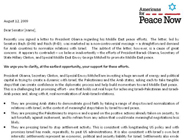
Excerpt: "A democratic state that strives for peace and justice simply has no right to uproot families who became refugees in 1948. They left homes in West Jerusalem behind them, and were subsequently granted modest accommodations by the Jordanian government. The claim that the houses in Sheikh Jarrah were purchased by Jews in the early 1900s is a double-edged sword that opens a political and legal Pandora's box."
On freedom of expression: "The Israeli public believes in freedom of expression as a general value, but for the most part refuses to allow harsh criticism to be expressed against the state. 74% support 'Freedom of expression for everyone, regardless of their opinions.' However, 58% agree that "political speech should not be permitted to express harsh criticism of the state of Israel.' This is a significant increase as compared to 48% in 2003."
In Friday's Legislative Round-Up I highlighted a new letter being circulated in the Senate by Senators Evan Bayh (D-IN) and James Risch (R-ID). The http://www.aipac.org/Publications/SourceMaterialsCongressionalAction/Bayh-Risch_Letter_on_Normalization.pdf (link has expired) letter, which is the top item on the "Take Action" page on the http://www.aipac.org/694.asp#26653 (link has expired) AIPAC website, focuses exclusively on President Obama's call for Arab states to take steps to normalize relations with Israel, making no mention of the president's call for Israel to stop settlement activity (and implying that steps Israel has already taken - like removing some checkpoints and PM Netanyahu's belated support for the two-state solution - are sufficient demonstration of Israel's commitment to the peace process).
This morning, APN sent a message to every Senate office urging Senators to refrain from signing the letter unless and until it is amended to also reflect the real steps to achieve peace the President Obama has asked Israel to take. Full text of the APN letter to the Senate after the jump.
In Friday's /roundup.asp?rid=&cid=6460 (link has expired) Legislative Round-Up I highlighted a new letter being circulated in the Senate by Senators Evan Bayh (D-IN) and James Risch (R-ID). The letter, which is the top item on the "Take Action" page on the AIPAC website, focuses exclusively on President Obama's call for Arab states to take steps to normalize relations with Israel, making no mention of the president's call for Israel to stop settlement activity (and implying that steps Israel has already taken - like removing some checkpoints and PM Netanyahu's belated support for the two-state solution - are sufficient demonstration of Israel's commitment to the peace process).
This morning, APN sent a message to every Senate office urging Senators to refrain from signing the letter unless and until it is amended to also reflect the real steps to achieve peace the President Obama has asked Israel to take. Full text of the APN letter to the Senate:
2. Senate Defense Authorization
3. New Bayh-Risch Letter on Arab Normalization
4. Q&A on Jerusalem/Shepherd's Hotel
For years, Israelis and opponents of Middle East peace efforts accused Yasser Arafat of speaking out of both sides of his mouth - saying one thing in English, when the whole world was listening, and saying something else in Arabic when addressing Palestinians and the Arab world. They used this as evidence of Arafat's untrustworthiness as a "partner" for peace negotiations.
What do these same people make of the fact that today it is Israeli officials who are talking out of both sides of their mouths? Prime Minister Netanyahu and Defense Minister Barak (not to mention their loyal advocate in the US, Elliot Abrams) are arguing publicly that Israel wants only to continue settlement construction according to the alleged "understandings" achieved with President Bush - "natural growth" to permit "normal life" through construction only in settlement blocs, only on the Israeli side of the barrier, and only within the existing footprint of settlements. But at exactly the same time. Israeli government officials are telling the Israel's High Court of Justice a very different story, and they are doing so in statements to the court.
In his enthusiasm to defend this latest Irving Moskowitz project (the same Irving Moskowitz who was a key player in Netanyahu's Hasmonean Tunnel debacle), Netanyahu gushed:
Yesterday, Israeli Prime Minister Binyamin Netanyahu argued passionately in the Israeli cabinet meeting that Israelis have the right to live anywhere in Jerusalem. In his enthusiasm to defend this latest Irving Moskowitz project (the same Irving Moskowitz who was a key player in Netanyahu's Hasmonean Tunnel debacle), Netanyahu gushed:
"This has been the policy of all Israeli governments and I would like to say that it is indeed being implemented because in recent years hundreds of apartments in Jewish neighborhoods and in the western part of the city have been purchased by - or rented to - Arab residents and we did not interfere. This says that there is no ban on Arabs buying apartments in the western part of the city and there is no ban on Jews buying or building apartments in the eastern part of the city."
The problem with this argument is that it isn't true. Israeli lawyer and Jerusalem expert Daniel Seidemann sets the record straight with the following points:
There is an important op-ed by Nahum Barnea on page 1 of today's Yedioth Ahronoth (translation by Israel News Today - INT).
Excerpt: "Torn between the pressures from Washington and the pressures from the right wing branch of his party and his coalition, Netanyahu chose the easy solution: Jerusalem. Like then, in the Western Wall tunnel affair, he thinks that the magic word "Jerusalem" will rally behind him not only the right wing in Israel, but also the political center in Israel, a majority of US Jewry and a majority of the members of Congress. In other words: He wishes to divert the clash with the Obama administration from the question of construction in the settlements, where he does not enjoy real support, either here or there, to a more convenient playing field. This could have been brilliant if it were not so transparent. [read on for full text]
The lead editorial in Haaretz today offers a great analysis into the current controversy over the Shepherd's Hotel.
Playing with fire
7/20/09
The controversy surrounding the plan to create a Jewish enclave in the heart of the Palestinian neighborhood of Sheikh Jarrah in East Jerusalem is not another routine expression of the U.S.-Israel dispute over the settlements. The timing of the decision to build dozens of housing units in the Shepherd Hotel complex, at the height of efforts to reach an agreement on limited construction in the settlements, casts doubt over Prime Minister Benjamin Netanyahu's willingness to enter serious negotiations on a final-status agreement. The support he granted the construction project yesterday, despite the vehement condemnations of America and Britain, show he is prepared to endanger Israel's most essential foreign relations for a provocative initiative led by Irving Moskowitz, the patron of right-wing organizations in East Jerusalem.
Today in Haartez, veteran military correspondent Amos Harel reports on the fact that the US is apparently no longer accepting the Roadmap formula regarding the number of outposts Israel has to remove. Harel makes the case that this is further evidence of the Obama Administration's "unyielding" approach on the settlements issue.
Which may be true. But Harel fails to note a simpler explanation for why, regardless of other aspects of the administration's policy on settlements, the Roadmap formula -- under which Israel is responsible for evacuating only those outposts established during Sharon's time as Prime Minister -- is no longer the exclusive measure of Israeli responsibility vis a vis outposts.
The reason? Because the other outposts - the ones not established under Sharon's watch, were established during periods when two other men served as Prime Minister. And those two men -- Binyamin Netanyahu and Ehud Barak -- are again running the show today.
The US has officially denied an Israeli press report to the effect that the US has agreed that Israel can continue some settlement construction. Reuters is reporting:
"Asked in Washington whether the report was true, State Department Spokesman Ian Kelly replied: 'No, that report in the Israeli media outlet is incorrect. Our bottom line is -- is the same. It has not changed. And that's that all parties in the region have to honour their obligations. And you know what our position is regarding settlements. This activity has to stop,' Kelly said."
No doubt the last word on the subject has not yet been said.
Last week, and again today, the Government of Israel sent a very clear message about how seriously it is taking US demands to freeze settlement construction and remove illegal outposts. The gist of that message: Israel is not taking these demands seriously at all.
Two quick updates on the MOT project: First, the latest (ridiculous) effort by the Simon Wiesenthal Center to justify the project. And second, a promising new development in efforts to stop the project: Jewish-Muslim cooperation.
On May 23, 2005, the Washington Post ran a an incisive op-ed by former State Department negotiator and Middle East advisor Aaron Miller, entitled "Israel's Lawyer," in which Aaron argued "For far too long, many American officials involved in Arab-Israeli peacemaking, myself included, have acted as Israel's attorney..." I was reminded of that article when I read today's piece by Elliott Abrams in the Wall Street Journal, which should, I believe, have been entitled "The West Bank Settlers' Lawyer."
The top headline in this morning's Haaretz is priceless: Netanyahu is arguing that a settlement freeze is a "waste of time" when the important thing is to focus on the real issues: the need for the Palestinians to recognize Israel (which of course they have already done) and the need for the Palestinians and the world to accept that a Palestinian state must be demilitarized (which, again, they have already done). While, of course, Israel will at the same time continue to build in settlements to accommodate "natural growth" - something Netanyahu argues is completely consistent with sending a message that Israel is serious about peace.
All of which would ring hollow under any circumstances, but especially when the headline just a couple below this one reads "Barak Authorizes Construction of 300 Homes in the West Bank."
Earlier today we published our latest edition of Settlements in Focus, "Top 5 Bogus Excuses for Opposing a Settlement Freeze." The response has been tremendous -- clearly, many many people are sick of spin and want real facts.
This response is very encouraging. Also encouraging is the experience of the past two weeks, during which I brought Hagit Ofran - the head of Peace Now's Settlement Watch and the foremost expert on West Bank settlements - and Danny Seidemann of Ir Amim - the foremost expert on everything related to Jerusalem land and settlement issues - to meeting on Capitol Hill and in the Obama Administration. From these meetings - more than 30 on the Hill and with Administration officials - it was clear: this Administration is absolutely serious about Israeli-Palestinian peace. And this Administration is resolute in its demand for a total settlement freeze. And Democrats in Congress are firmly behind President Obama.
So that's another very encouraging sign.
And here's one more: today's op-ed in the Wall Street Journal by Egyptian President Hosni Mubarak. It's a powerful statement, expressing hope for and commitment to Israeli-Arab peace, and making clear that if Israel takes serious steps toward peace (perhaps a settlement freeze?) the Arab world stands ready to reciprocate. It is just one more encouraging sign of the times.
Israel's Channel 2 Hebrew-language news just aired the story that Prime Minister Netanyahu is considering adopting a temporary freeze in settlement activity. Hebrew speakers can listen to the broadcast here.
Since we are lucky enough to have Peace Now Settlement Watch director Hagit Ofran in the office right now, we thought we'd interview her for her reaction to the report and her analysis of what it means.
The Washington Post got it spectacularly, shamefully wrong on settlements this weekend. In its Sunday lead editorial, the WP called on Obama to back down on the demand for a settlement freeze, arguing in essence that (a) no Israeli government could agree to totally freeze settlements, and (b) in any case, the Palestinians have already agreed that Israel will ultimately keep many settlements, so it makes no sense to use up political capital demanding that Israel stop construction in such areas. Both arguments are wrong and the policy the WP suggests - that Obama give up the demand for a settlement freeze, is misguided in the extreme.
I just read this important and insightful reaction to President Obama's Cairo speech, entitled (on the NYT website) "Forcing Clarity on Israel." The short essay (and I recommend reading the whole thing) concludes as follows: "Once Israelis grow accustomed to the new tenor emanating from Washington, we may see today's speech in a different light. Barack Obama may or may not bring peace to the Middle East, but he may well force clarity, and perhaps disciplined policy, on an Israeli society that has long desperately needed it."
What is even more remarkable than the content of this essay is the source:
With the pro-settler spin machine running at full power trying to make the case that support in Congress for Obama's Middle East policies is beginning to crumble, members of Congress are pushing back.
On the heels of this morning's historic Obama speech in Cairo, Rep. Gary Ackerman (D-NY) -- the Chairman of the House Committee on Foreign Affairs' Subcommittee on the Middle East and South Asia -- issued a statement this afternoon entitled "ACKERMAN URGES FREEZE ON SETTLEMENT CONSTRUCTION, NOT GROWING FAMILIES." (the text is not yet available online, so the document is copied at the end of this post).
The JTA's Ron Kampeas has posted an excellent blog piece on the issue of natural growth - or more precisely, why there is nothing "natural" at all about "natural growth" of settlements. His commentary complements a great short piece in today's Haaretz by Akiva Eldar. Both Ron and Akiva focus on the population numbers, underscoring the inescapable fact that new babies being born to settlers cannot possibly account for the massive growth of the settler population (both in the West Bank and East Jerusalem). No, this growth reflects, above all else, Israeli government policies that have long encouraged Israelis to move into settlements, including the planning, construction, and subsidizing of housing for them in these areas. Demanding new settlement housing to accommodate this entirely unnatural population boom is nothing more or less than settler chutzpah -- chutzpa that for some reason many seem to be buying.
But both Ron and Akiva omit another important - and I think glaringly obvious - problem with the demand for settlement expansion to accommodate "natural growth."
Danny Seidemann, the preeminent expert on all things related to Jerusalem and the quest for peace, has an extraordinary op-ed in the current issue of the Forward. His central thesis? "American Jews are singularly unprepared to engage in sober, rational discourse on the city's political future. But it is now imperative that the Jewish community replace sloganeering about Jerusalem with a more nuanced approach, rooted in a familiarity with the complexities of the city and the genuine Israeli and Jewish interests embedded in it. In reacting to the prospect of an engaged White House and progress toward a final-status agreement, American Jews should not abandon their love and devotion to Jerusalem, but they must undergo a process that many Israelis have already undergone: transforming devotion to Jerusalem from a teenage infatuation into a mature, adult love."
Tomorrow at 10am the House Appropriations Committee will be marking up legislation to fund President Obama's http://www.whitehouse.gov/omb/assets/budget_amendments/supplemental_04_09_09.pdf (link has expired) FY09 Supplemental Budget request (the mark-up will be webcast). In advance of that mark-up, APN today sent talking points to all members of the Appropriations Committee urging them to support the Middle East-related provisions in the bill. Also in advance of the mark-up, Appropriations Committee Chairman David Obey released a http://appropriations.house.gov/pdf/FY09SuppSummary05-04-09.pdf (link has expired) summary of the bill and a http://appropriations.house.gov/pdf/ObeySuppStatement05-04-09.pdf (link has expired) statement about the bill (both of which deal with some details on Middle East funding)
APN's talking points to Committee members stated:
I already weighed in with concerns about Bibi's speech last night at AIPAC. On the happier news front, two great speeches were delivered at AIPAC today, one by http://www.aipac.org/Publications/SpeechesByPolicymakers/VicePresidentBidenPC09.pdf (link has expired) Vice President Biden, the other by http://www.aipac.org/Publications/SpeechesByPolicymakers/SenatorKerrySpeechFOR_DELIVERYPC09.pdf (link has expired) Senate Foreign Relations Committee Chairman Kerry. Both made clear that they are friends of AIPAC and friends of Israel, and that the US-Israel relationship - like the US commitment to Israel's security - is unshakeable. But both said a lot more that was probably a lot harder for some people to hear...
In his speech to AIPAC last night, Israeli Prime Minister Binyamin Netanyahu described his approach to Israeli-Palestinian and Israeli-Arab peace. The speech left all of us at APN skeptical about the sincerity of the Prime Minister's commitment to peace - a commitment that will be judged not by Netanyahu's skill in laying out his own "peace paradigm" but by his policies and actions. Specifically,
This week saw the introduction of new major Iran sanctions legislation in the form of HR 2194 and S. 908, "the Iran Refined Petroleum Sanctions Act." The bill is likely to be the main focus of AIPAC lobbying efforts during their Policy Conference next week. Indeed, AIPAC has already published a http://www.aipac.org/Publications/AIPACAnalysesFAQs/FAQs_-_IRPSA.pdf (link has expired) FAQ sheet in support of the bill. In introducing the House version of the bill, Chairman Berman (D-CA) http://www.internationalrelations.house.gov/press_display.asp?id=617 (link has expired) made clear that he did not intend to move the bill in the near future.
APN strongly opposes this legislation and sent a message to all Hill offices this morning laying out our concerns. That message stated:
Next week a major lobbying effort will get underway in support of new Iran sanctions legislation in both houses of Congress - HR 2194 and S. 908. I want to make sure you know that Americans for Peace Now (APN) opposes these bills. We urge members to refrain from cosponsoring them and to urge their leaderships to make a public commitment that these bills will be kept off the legislative agenda.
A new http://www.worldpublicopinion.org/pipa/articles/home_page/604.php?nid=&id=&pnt=604&lb= (link has expired) poll released yesterday by WorldPublicOpinion.org showed that most Americans oppose Israeli settlement construction and expansion, and that this majority has grown significantly since 2002. The poll summary notes:
- "three-quarters of Americans think that Israel should not build settlements in the Palestinian territories. This is up 23 points from when this question was last asked in 2002."
- "Even those respondents who sympathize more with Israel feel that it should not be building settlements in the West Bank by a clear majority (64%), as do those who sympathize equally with Israel and the Palestinians (80%), and those who sympathize more with the Palestinians (96%)."
- "Opposition to settlements is found among majorities of Republicans (65%), Democrats (83%) and independents (74%)."
Background: "WorldPublicOpinion.org is an international collaborative project whose aim is to give voice to public opinion around the world on international issues. As the world becomes increasingly integrated, problems have become increasingly global, pointing to a greater need for understanding between nations and for elucidating global norms. With the growth of democracy in the world, public opinion has come to play a greater role in the foreign policy process. WorldPublicOpinion.org seeks to reveal the values and views of publics in specific nations around the world as well as global patterns of world public opinion. WorldPublicOpinion.org was initiated by and is managed by the Program on International Policy Attitudes at the University of Maryland."
September 9, 1993 -- the date that the PLO officially and formally recognized Israel's right to exist in peace and security, and in return Israel recognized the PLO as the representative of the Palestinian people -- is a day that stands out in my memory. As a US Foreign Service officer serving in Jerusalem during that period, I will never forget the palpable feeling of hope and anticipation that was in the air.
What is entirely absent from my memory is the recollection of any Israeli narrative at the time saying: "Sorry Mr. Arafat, but this recognition isn't good enough. What we actually need is your formal endorsement of Israel as a Jewish state. If you can't do that, then your recognition of Israel doesn't count."
It is absent not because my memory is faulty, but because this narrative simply didn't exist. Yitzhak Rabin did not say "thanks, but no thanks;" nor did Israelis. Everyone understood that the demand of the Palestinians was and had always been: recognize Israel's right to exist (or some slight variation thereof). The historic September 9th declaration achieved exactly that. The demand that the Palestinians "recognize Israel's right to exist as a Jewish state" - or what hereafter will be known as "recognition-plus" - came much later.
During most of the tenure of George W. Bush in the White House, it was widely understood that a formidable obstacle to Israeli-Palestinian peace resided not in the region but close at hand in the National Security Council, in the form of Elliott Abrams (who served in various roles, but always with an influence over Middle East policy). Abrams was viewed by many Washington insiders as deeply sympathetic to the Israeli right and ideologically supportive of Israel's settlement enterprise. He was viewed as in large part responsible for the Bush Administration's apparent unwillingness to hold Israel to its repeated commitments to freeze settlements, as well as for President Bush's stunning pro-settlements edict of 2004 - the letter to Sharon in which Bush declared his unilateral decision that Israel would be keeping the ever-expanding, never-officially-defined settlement blocs.
Since leaving the Administration, Mr. Abrams appears to have decided to do everything he can to show just how accurate this popular wisdom about him was. He also appears to be on a mission to undermine any actions the Obama Administration might decide to take on settlements, just as he is believed to have done - from the inside - under the Bush Administration.
Yesterday President Obama delivered a speech before the Turkish parliament. In it he articulated some general outlines of his policy regarding the Israeli-Palestinian conflict, making clear his commitment to Israeli-Palestinian peace and making explicit that his policy will be based on both the Roadmap and the commitments made at Annapolis. His words were broadly consistent with things he said previously, both during the campaign and since he was inaugurated.
Obama's comments in Turkey on the Israeli-Palestinian conflict were not groundbreaking - representing little more than a reiteration of longstanding US policy - and under normal circumstances they would hardly have been especially newsworthy. Indeed, under normal circumstances they might have generated criticism over Obama's apparent embrace of the previous Administration's lackluster efforts in the Israeli-Palestinian arena.
However, these are not normal circumstances.
Today, the House of Representatives passed H. Res. 282, a resolution introduced March 24, 2009 8th by Reps. Jeff Fortenberry (R-NE) and Keith Ellison (D-MN) in honor of the 30th anniversary of the peace treaty between Egypt and Israel." This timely resolution, which passed by a vote of 418-1, is reminder of the importance of the Israel-Egypt peace treaty and, in the words of the resolution, the example it set of "reconciliation following decades marked by nearly unremitting tension and confrontation..." APN strongly supported H. Res. 282 from the time of its introduction, mobilizing APN supporters to contact their representatives and urge them to support the measure (see our Action Alert at: http://www.peacenow.org/updates.asp?rid=0&cid=6081).
APN commends Reps. Fortenberry and Ellison for introducing H. Res. 282 and applauds the leadership of the House Committee on Foreign Affairs, as well as House leaders, for recognizing the value of this resolution and acting swiftly to bring it to the floor for passage.
Today the Newsweek-Washington Post site (PostGlobal) has an op-ed by me (Lara Friedman) and Hagit Ofran, my Israeli colleague at Peace Now who runs Peace Now's Settlement Watch. Enjoy!
http://newsweek.washingtonpost.com/postglobal/needtoknow/2009/03/freeze_israels_settlements_for.html
The Middle East has gotten caught up in the battle over the FY2009 Omnibus Appropriations bill, currently under consideration in the Senate. Yesterday saw a contentious vote over an amendment offered by Sen. Kyl (R-AZ) calling for new Iran sanctions. That amendment was defeated, but Senate leadership has now agreed to allow four Middle East-related amendments to come to a vote on Monday. For background and information about the current state-of-play on the bill, check out this week's and last week's Legislative Round-Ups. APN's message to Senate staffers opposing the additional four amendments is copied here:
Dear XXXX,
It appears that in the coming days your boss will be asked to vote on four amendments to the FY09 Omnibus Appropriations Bill (HR 1105) related to the Middle East. Americans for Peace Now opposes all of these amendments, viewing them as little more than political grandstanding at the expense of the very important issues at stake for U.S. foreign policy and national security in the region.
Earlier this week blogger Philip Weiss posted a letter sent to me by an activist named Ira Glunts. I don't know Mr. Glunts and have never heard from him before, but since he has elected to make his letter public, it seems appropriate for me to respond in kind.
Glunts' letter (which you can read on Weiss' blog) expresses his outrage at APN for our recent statement and Action Alert supporting a statement made February 12th by Rep. Gary Ackerman (D-NY) about the Israeli-Palestinian conflict.
As has been widely reported in the press, Senate Foreign Relations Chairman John Kerry (D-MA) is currently in the middle of a trip to the Middle East, including visits to Israel, Gaza, and Syria. He is one of many members of Congress traveling to the Middle East during this recess - travel that we hope is an indication that the 111th Congress is going to deal seriously with this region. Sen. Kerry's travel is especially important, given his role as the Chairman of the Senate Foreign Relations Committee, and earlier today APN sent him a letter (copied below) applauding his travel.
Today's edition of the International Herald Tribune includes an important op-ed by Yossi Alpher, entitled "Now Stop Starving the Gazans."
Excerpt:
"For the past year and a half, Israel, with the full backing and encouragement of the quartet of Middle East mediators (the European Union, the United States, the United Nations and Russia), as well as Egypt, Saudi Arabia and even the West Bank-based PLO, has maintained an economic blockade on the Gaza Strip.
"Generally it has allowed into Gaza only the equivalent of the UN minimum number of calories required daily for subsistence, multiplied by the 1.5 million or so population of the Gaza Strip, along with minimal medical supplies and fuel.
"This economic-warfare strategy against Gaza has failed totally; indeed, it has proven counterproductive...
[snip]
"Arguably, the current military campaign might have been avoided had the economic war ended. Even if the Israeli bombing and invasion were unavoidable, open land crossings between Gaza and Israel would have allowed Gazans to stock up with emergency provisions rather than be caught by this war with empty shelves, thereby avoiding at least part of the current humanitarian crisis..."
Last week, representatives of two leading Israeli human rights organizations - Tania Hary from Gisha, and Ran Yaron from Physicians for Human Rights-Israel - made a last-minute, whirlwind trip to Washington. Their goal was to try to convey to Congress and the Administration the gravity of the humanitarian situation on the ground, right now, in Gaza. They were accompanied by Libby Friedlander, an indefatigable mover-and-shaker on the Israeli pro-peace NGO scene.
APN, which is not a human rights organization, does not usually handle this kind of visit. But I was asked to help and given the enormity of the unfolding tragedy, the clear implications that it has on the hopes for ever achieving Israeli-Palestinian and Israeli-Arab peace, and the evident hunger for information here in Washington from within Congress and the Administration, I agreed to try.
With very little time to organize (they told me Tuesday afternoon that they would be arriving Thursday morning), I told them to keep their expectations low. While I hoped that members of Congress and staff would be receptive to the visit, I feared that, with all the political jockeying going on over this issue, they might balk. My fears did not materialize. To the contrary.
On Thursday, I organized a public briefing for them in the Rayburn House Office Building. Ever the optimist, I scheduled it in one of the larger rooms, but fearing a small turnout, we only set up about 60 chairs. The event was jointly presented - and advertised - by a coalition of groups: APN, J Street, Brit Tzedek v'Shalom, Churches for Middle East Peace, the Arab American Institute, and B'tselem. The result exceeded all expectations: more than 100 people came - standing-room only with people sitting on the floor. And at least 50% of the attendees were congressional staff, split almost evenly between the House and Senate. Even one member of Congress came.
The event was amazing - as much for the tone as anything else. The speakers - both young, eloquent, knowledgeable and extremely sympathetic - never engaged in polemics or Israel bashing. Rather, they offered a quiet and effective description of the humanitarian problems in Gaza, including the impacts of the boycott/blockade/siege that preceded the current conflict, the immediate crisis on the ground in the context of the current fighting, and the some of the new challenges that will emerge once the fighting ends. In what was one of the most powerful sound-bites of the event, Tania noted that she agreed with http://www.state.gov/secretary/rm/2009/01/113659.htm (link has expired) Secretary Rice that under any new ceasefire there must be no return to status quo ante - but where Secretary Rice meant this only in terms of rocket fire from Gaza, Tania made clear that it must mean both in terms of rocket fire into Israel and in terms of Israeli policies that, in an effort to hurt Hamas, hurt innocent civilians. For any ceasefire to be sustainable there can be no return to "status quo ante" by either measure.
The event lasted an hour and half and most people stayed for the entire thing. Many staffers stayed on after the event ended to talk to the speakers, and one senior staffer for a solidly pro-Israel member of Congress stopped to thank me for this "excellent" event. (Hopefully we will have an audio file of the event - keep checking back for that).
In addition to the public event, the visitors met with State Department officials and at least one member of the press. They were also were welcomed in private meetings with a total of 7 members of the House and Senate, as well as staff from 5 other offices (and a hat tip to Joel at J Street and Julie at Churches for Middle East Peace for their part in helping with the schedule). This included a meeting with a group of House members (this meeting, and several others, included B'tselem's new Washington Representative, Mitchell Plitnick, who had just returned from an extended visit to Israel). The almost immediate upshot of that meeting was a letter sent Friday (1/9/09) to President Bush, Secretary of State Rice, President-elect Obama, Senator Hillary Clinton and Israeli Ambassador Sallai Meridor. The letter, led by Rep. Lois Capps (D-CA) and signed by 24 members of Congress, lays out detailed concerns about the humanitarian situation. Coming on the same day that the House passed its resolution calling for a ceasefire and expressing concerns about the humanitarian situation (among other things), the letter offered an important, complementary message. The letter, and the visit, have already resulted in an article in the Jewish press. And there may still be a similar letter in the Senate -- stay tuned.
Overall, in the course of these meetings it became clear that across the board, most members and staff - including from offices that are not considered part of the traditional "peace caucus" in Congress - clearly "get it." Most recognize that the current humanitarian situation is a disaster for civilians on both sides. Most recognize that, however and whenever this military engagement ends, the needs of the people in Gaza simply cannot be wished away or ignored. Most recognize that a situation in which the entire civilian population of Gaza is suffering cannot be conducive to peace and security for Israel. Most recognize that blaming Hamas for the situation cannot be an excuse for policies that perpetuate and deepen the suffering of innocent civilians. And most recognize that failing to address the immediate needs of civilians in the battle zone, now - like failing to set up and maintain humanitarian corridors to evacuate wounded and bring in fuel and other vital supplies, and failing to enable international agencies access and protection - is unconscionable and, in the end, counterproductive for Israel.
Finally, for up-to-the-minute (or as close as possible) updates on the situation in Gaza from Israeli NGOs, Israeli NGOs have cooperated to set up a one-stop website.
This morning APN issued the following new statement on the Gaza crisis. An action alert based on this statement (urging activists to contact members of Congress) will be issued soon.
Also, check our main page (www.peacenow.org) for coverage of Peace Now's remarkable efforts in Israel.
APN Statement on the Gaza Crisis
January 2, 2009
Supporting Israel Means Seeking a Ceasefire, Now.
We enter this new year in the midst of a new crisis in the Middle East.
Israel is again at war in Gaza. This tragic turn of events should surprise no one. Over the past few weeks and days, Israelis, Palestinians, and the world have been witnessing the unfolding of a serious and dangerous military escalation between Israel and Hamas, bringing ever-increasing casualties and ever-growing fear and trauma to innocent people on both sides – people who want nothing more than to live normal lives with peace and dignity.
The government of Israel has the right – indeed, the obligation – to take measures to bring to a halt the terror of incoming fire from the Gaza Strip into communities of southern Israel, as well as to seek to free its captured soldier, Gilad Shalit.
This right and obligation poses tremendous challenges for Israel, given the nature of Hamas and its rule in Gaza. The decision to try to pressure Hamas through boycotts and the imposition of a near total siege on Gaza has clearly failed, while bringing the people of Gaza to the brink of an entirely man-made humanitarian disaster.
The decision earlier this year to establish a ceasefire was a right one. Unfortunately, that decision alone was insufficient to achieve long-term stability, since it was not part of a broader, realistic strategy to deal with the fundamental issues at stake. The breakdown of that ceasefire reflects this failure.
Now, in the face of the current crisis, simply escalating the violence is not going to resolve the situation.
Israel's military leaders know that while the IDF can achieve short-term tactical gains in Gaza, the Israeli military cannot destroy popular support for Hamas, stop all rockets from falling, or force the release of Gilad Shalit.
Indeed, this escalation risks playing into the hands of extremists, while increasing dangers to both soldiers and civilians – Israeli and Palestinian – and getting Israel bogged down in an open-ended mission in Gaza.
It also raises the specter of a two-front war, should Hizballah decide to renew conflict on Israel’s northern border, with all the challenges to the IDF and danger to Israeli civilians that this would entail.
Many argue that this is precisely what Hamas wants.
We argue that these are important reasons to seek to avoid further escalation and move quickly to a ceasefire.
We are not naive. We recognize the extraordinary difficulty Israel faces in achieving any sustainable ceasefire agreement, formal or informal, with an extremist, ideologically-motivated organization like Hamas.
We also know that the breakdown of the recent ceasefire does not prove that ceasefires are futile. Rather, it demonstrates the danger of treating a ceasefire as an end unto itself.
As we have warned repeatedly in the past – indeed, every time we have called for a ceasefire – a ceasefire is useful and desirable only as a means to halt violence and chaos in the immediate term, creating the space to facilitate improvements in the humanitarian situation, stabilize the political situation, and get the process back on track to achieve a two-state solution to the Israeli-Palestinian conflict.
Absent improvements in the humanitarian situation in Gaza and the re-emergence of a serious, productive political process, any ceasefire risks becoming merely an intermission to allow those attacking Israel to re-arm, re-trench, and enhance their military capability.
Sadly, this is exactly what happened under the ceasefire that just ended.
Looking ahead, the only way out of the current crisis is to re-establish a ceasefire, but this time not as a short-term fix but rather as part of a serious, longer-term strategy to deal with the core issues at play in Gaza.
In this way, and only in this way, a ceasefire can allow the sides to avoid the re-emergence of violence in the longer term. The Israeli-Palestinian conflict is, at its heart, a political conflict. Palestinian terrorism against Israel – including Hamas-fired rockets from Gaza – is a horrendous aspect of this conflict that cannot be brought to an end simply by increasing the harshness of the Israeli response.
Finally, the painful lessons of the 2006 Israel-Hizballah War should not be lost here. Any realistic, sustainable resolution to this crisis will require Israel and Hamas to engage eventually, directly or indirectly, to achieve a ceasefire.
The only real questions thus are:
* How many more Israelis and Palestinians will die or be wounded in the interim?
* How much less international sympathy Israel will have when the ceasefire is being negotiated?
* How much bigger will the disaster on the ground be, both in Israel and Gaza, once a ceasefire is achieved?
* How much damage will have been done to the credibility and viability of the peace process and the Israeli and Palestinian peace camps?
* And perhaps most importantly, will a ceasefire this time be accompanied by both the kind of changes on the ground and the establishment of some sort of political process necessary for it to succeed?
Following a recent APN Action Alert on the topic, and an APN letter to the Simon Wiesenthal Center (SWC) from APN, signed by a number of important Israelis and American Jews, many APN activists have been (and are still) writing to the SWC to protest the construction of the "Museum of Tolerance" on the site of the Mamilla cemetery in Jerusalem. In response, they are receiving from the SWC an emailed document entitled "Important Facts on the Israeli Supreme Court Ruling in Favor of the Museum of Tolerance," which purports to refute the various criticisms of the project.
APN agrees that the facts are important, so my brilliant friend and colleague in Jerusalem, Danny
Seideman, and I have produced a Q & A primer entitled "Setting the Facts Straight Regarding the Museum of
Tolerance" -- we review all of the facts (and claims) in detail, and also provide a
compendium of articles (analysis, opinion, and reporting) that may be of use to people who care as much as we do
about this subject. Enjoy!
